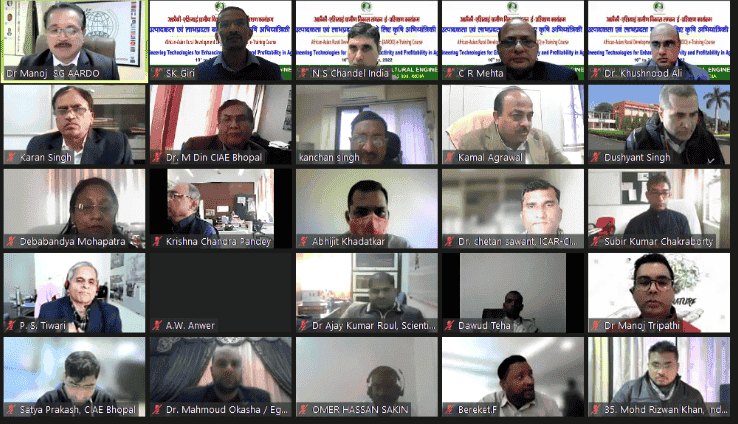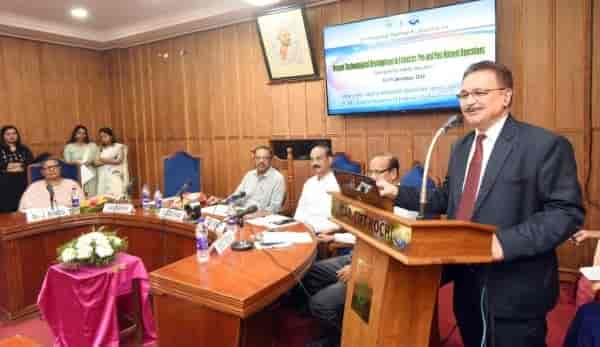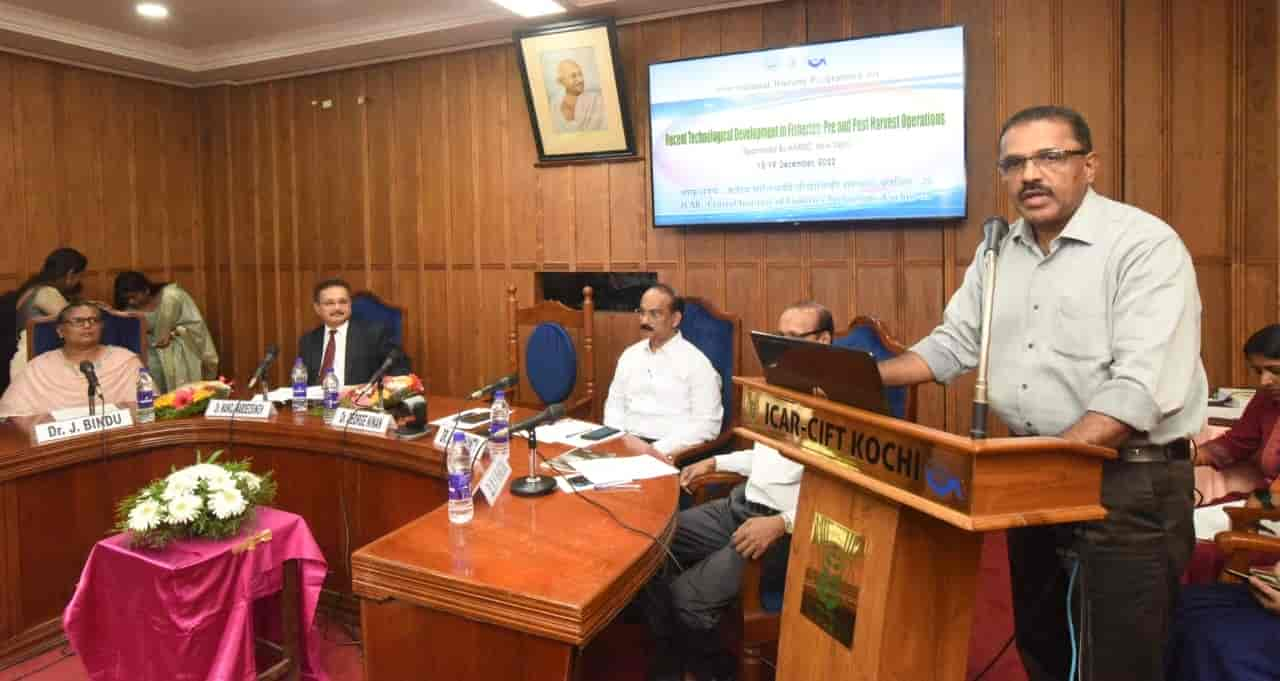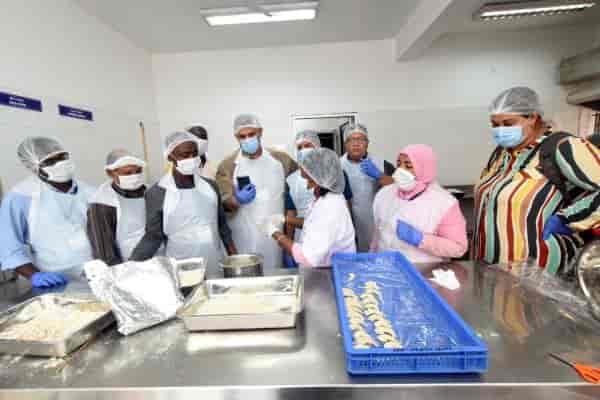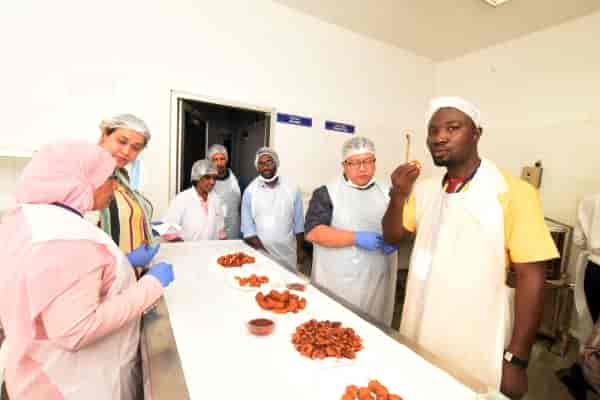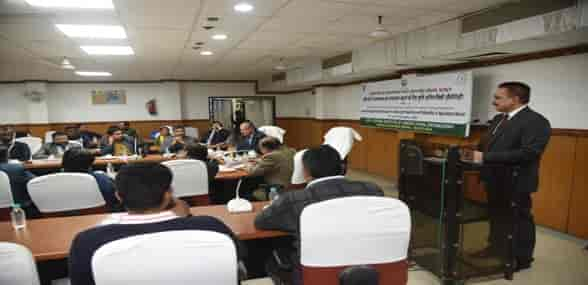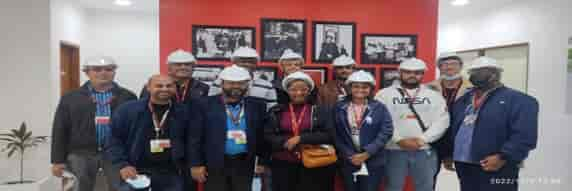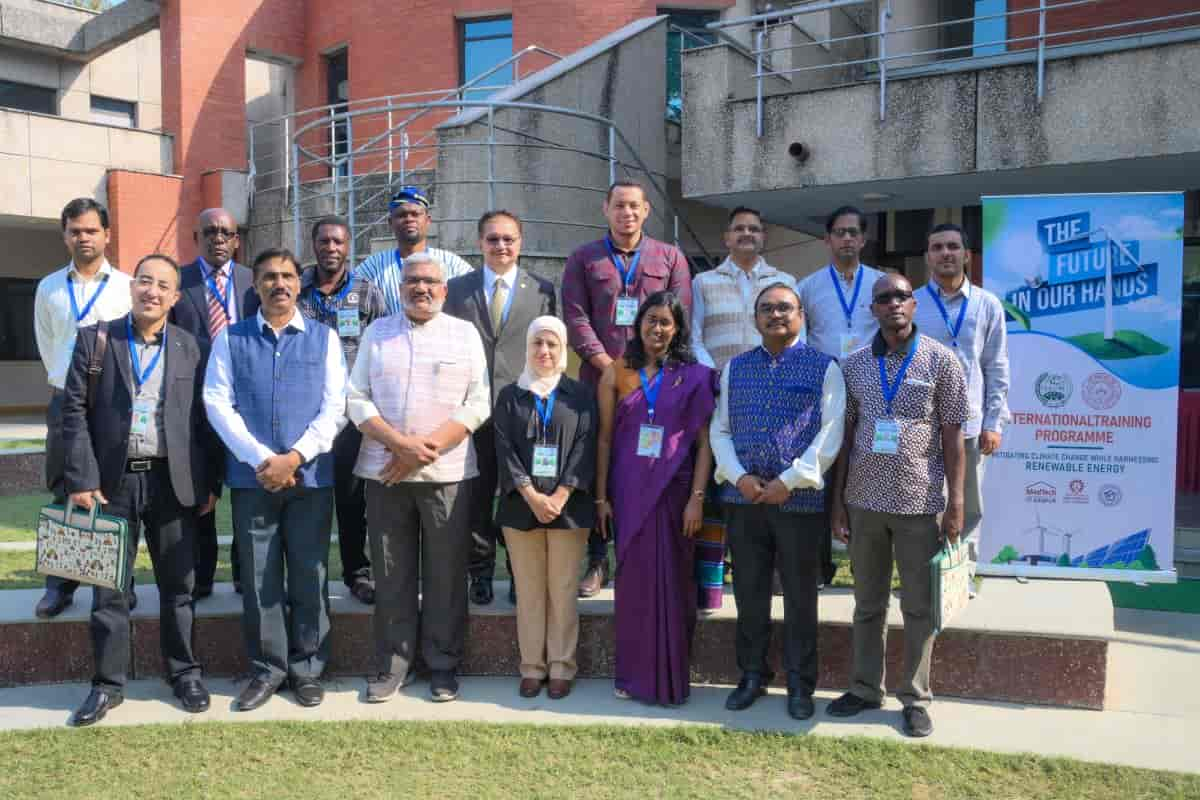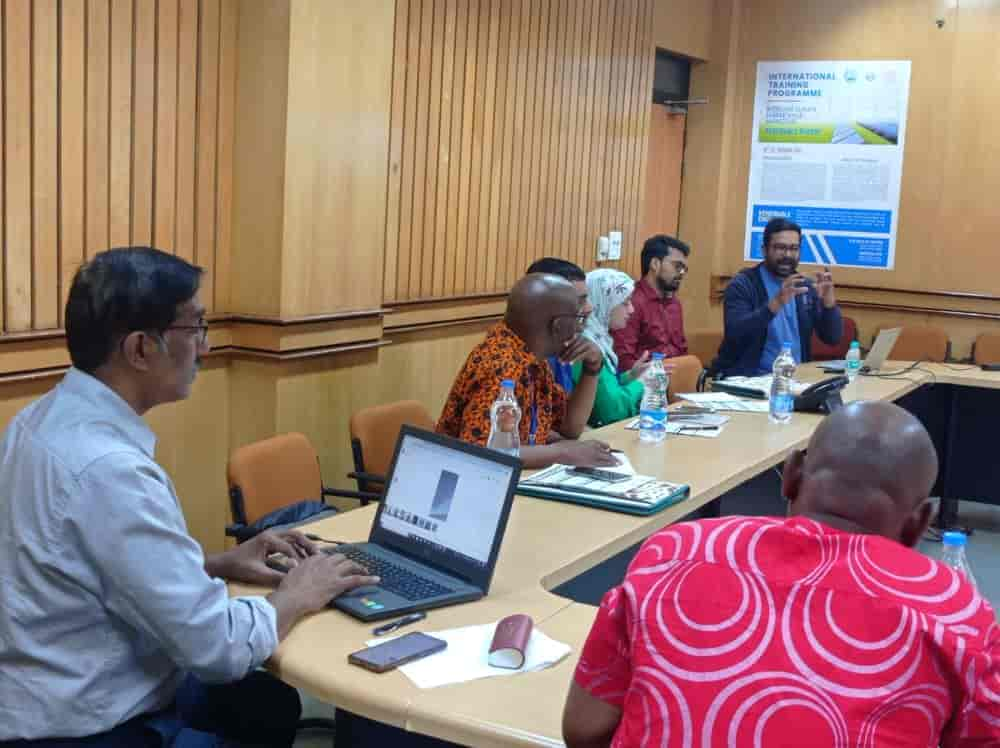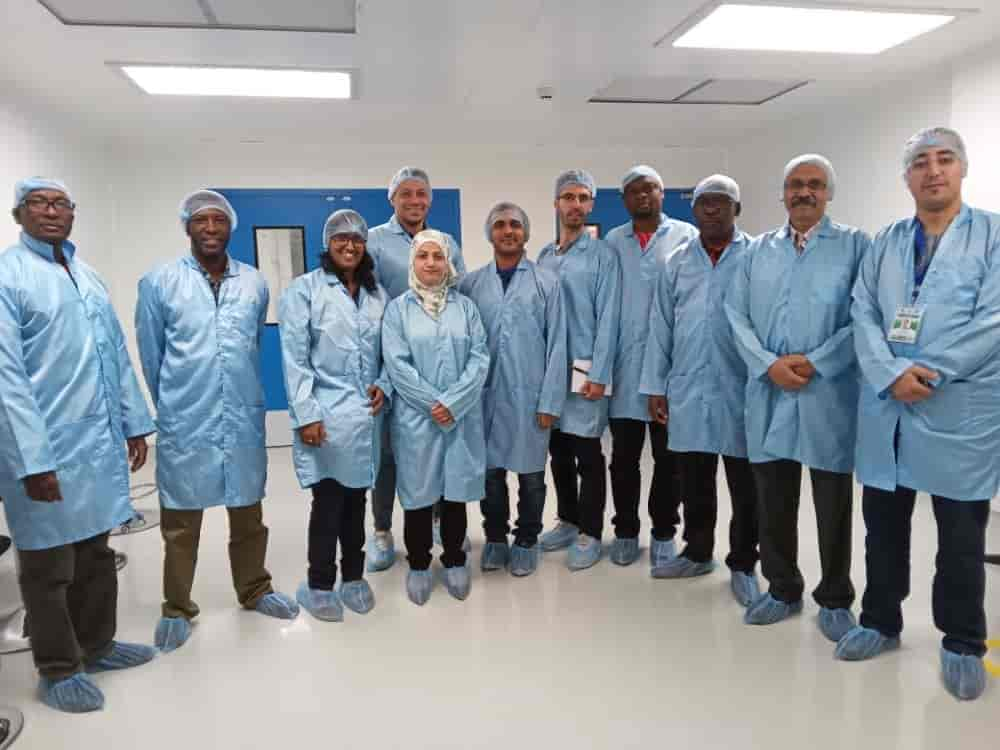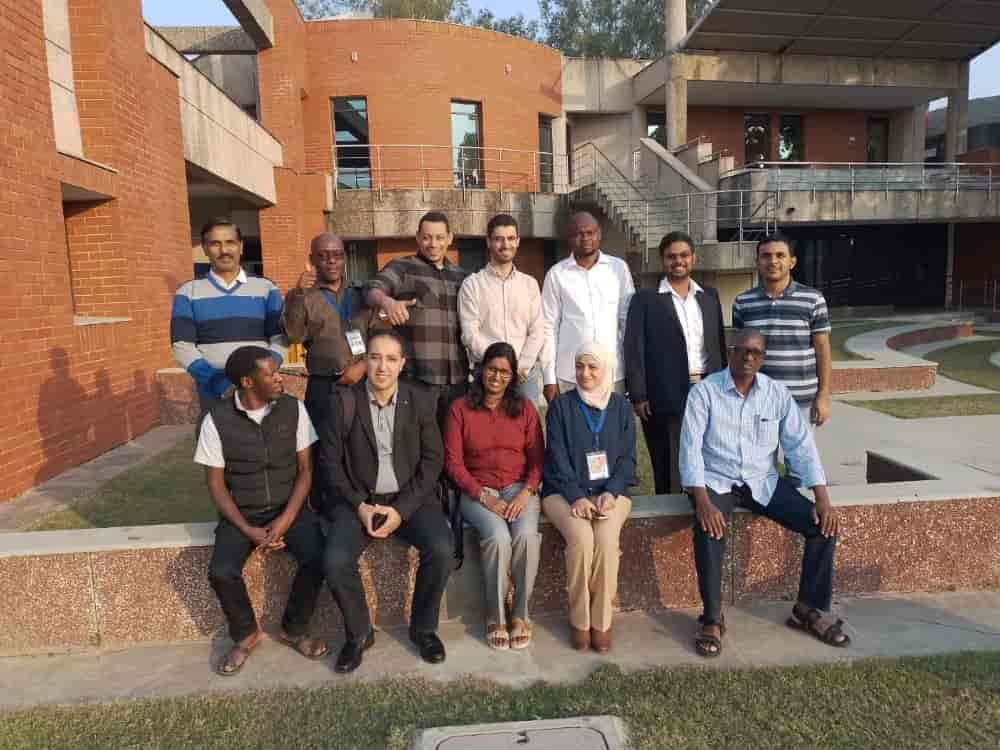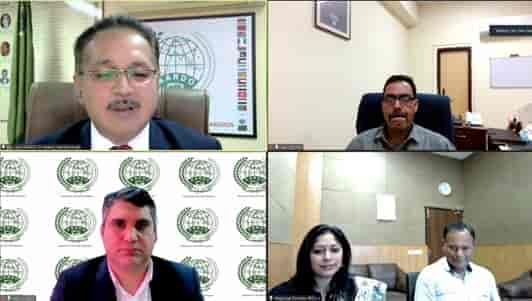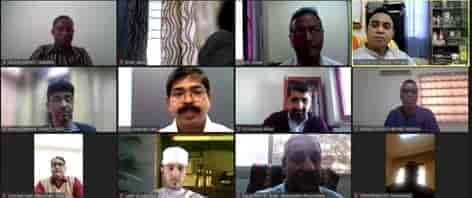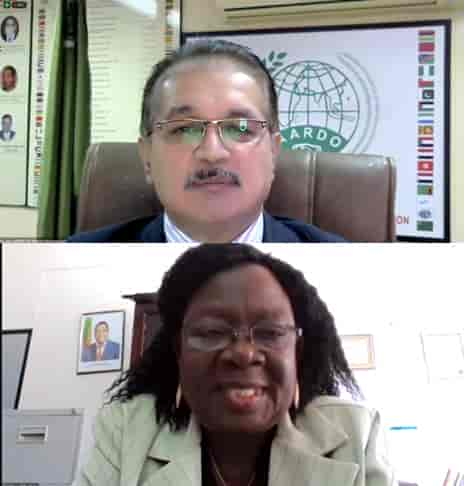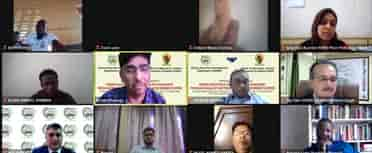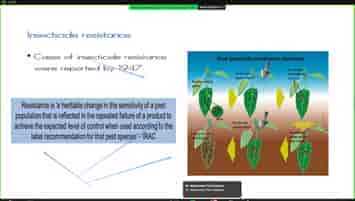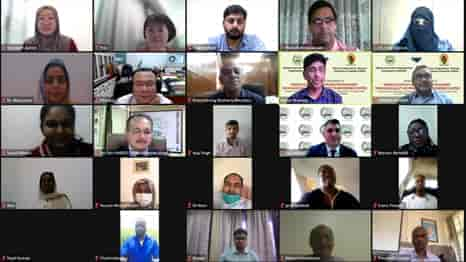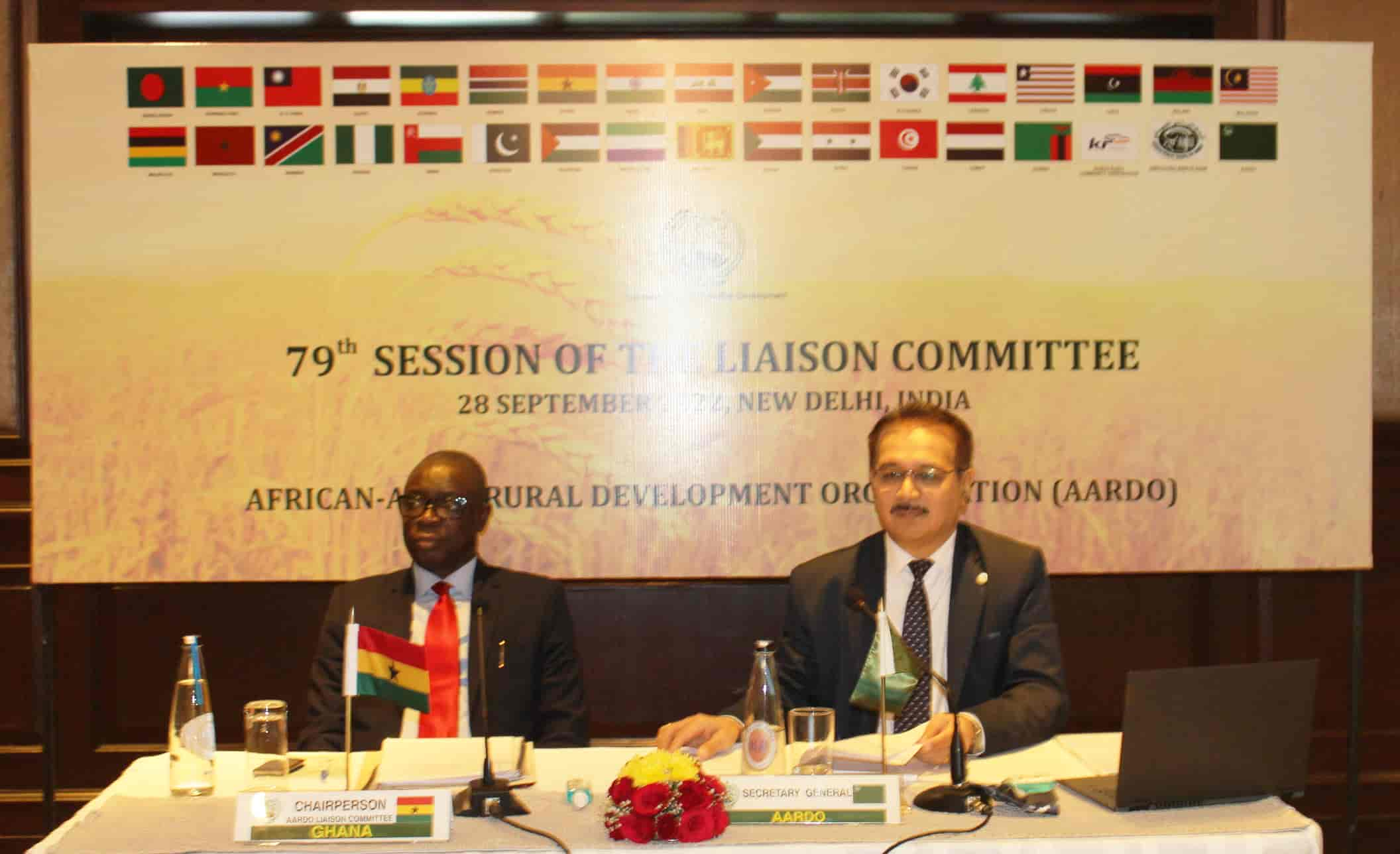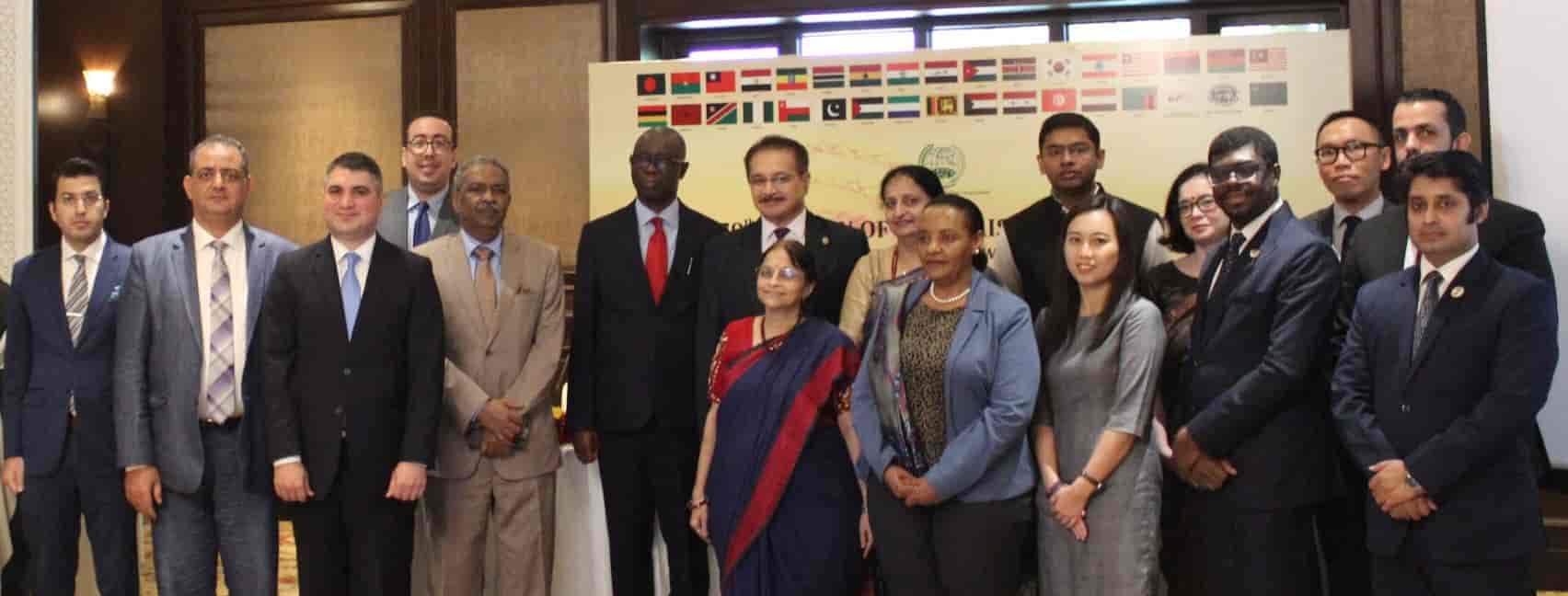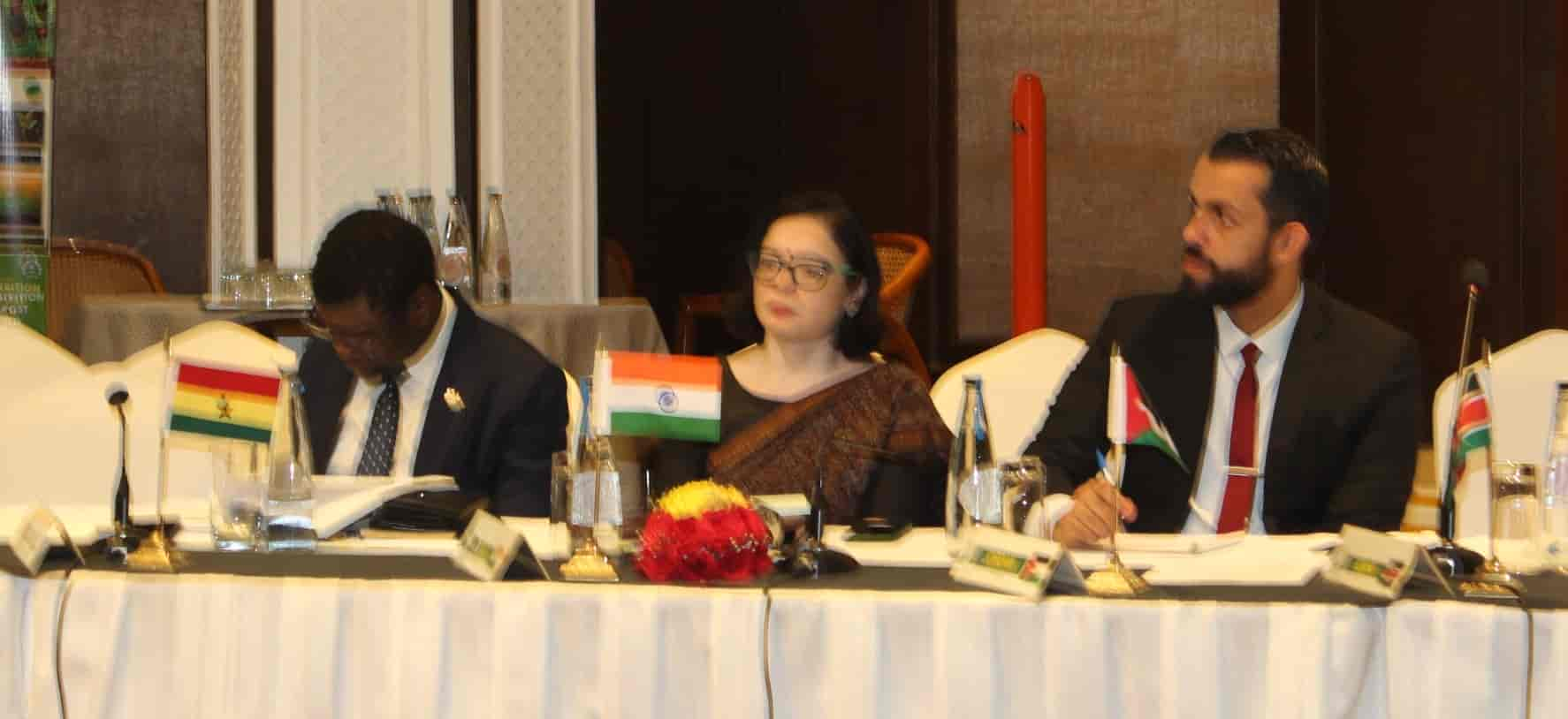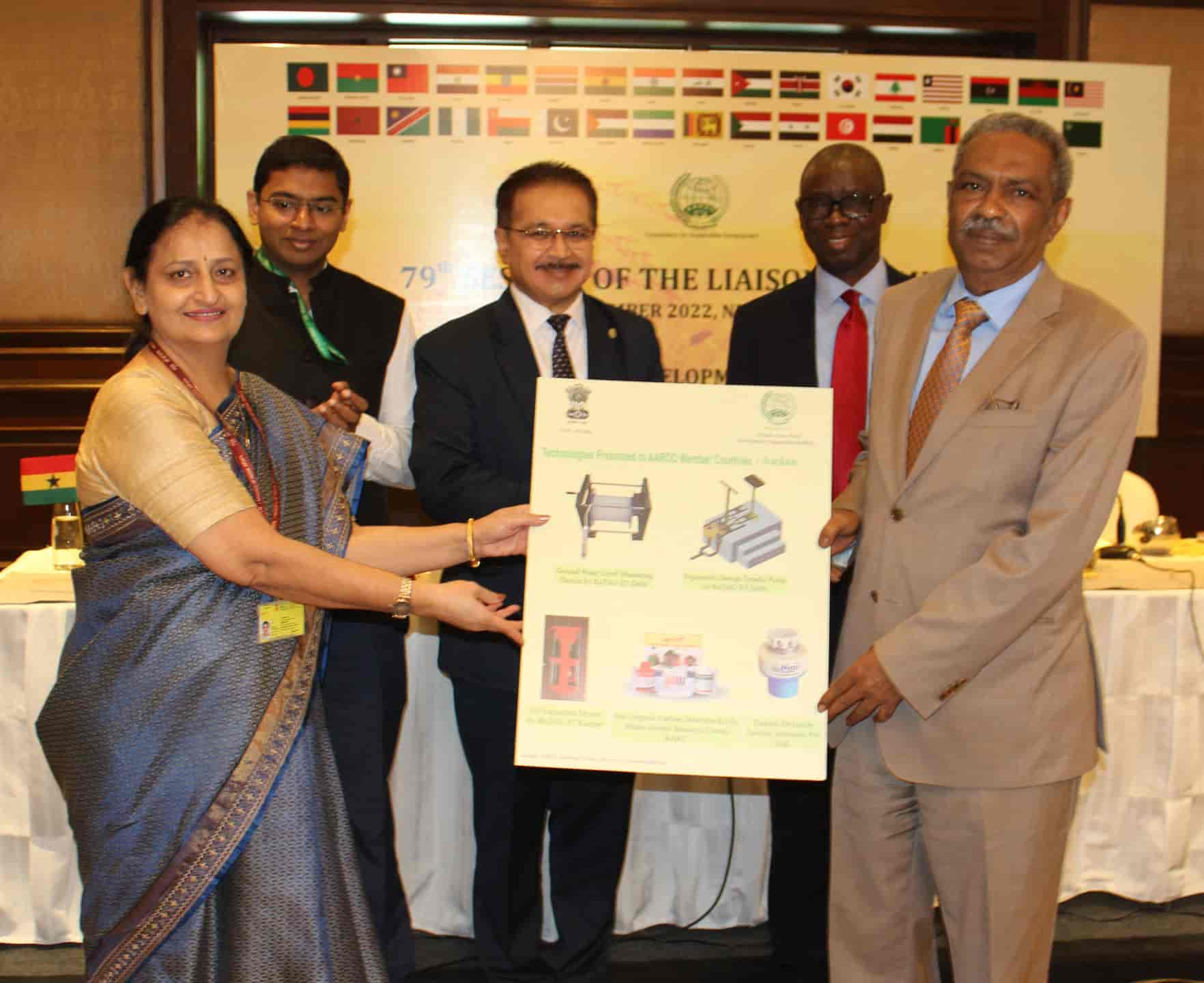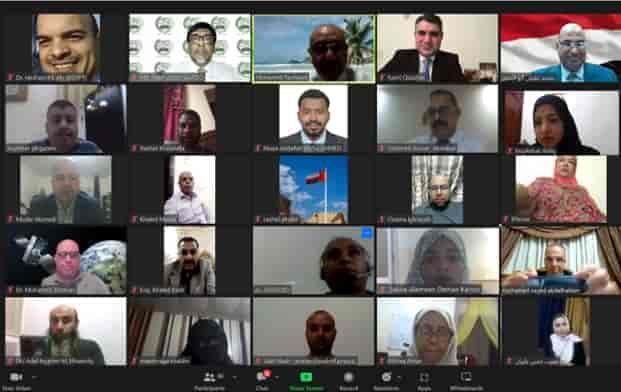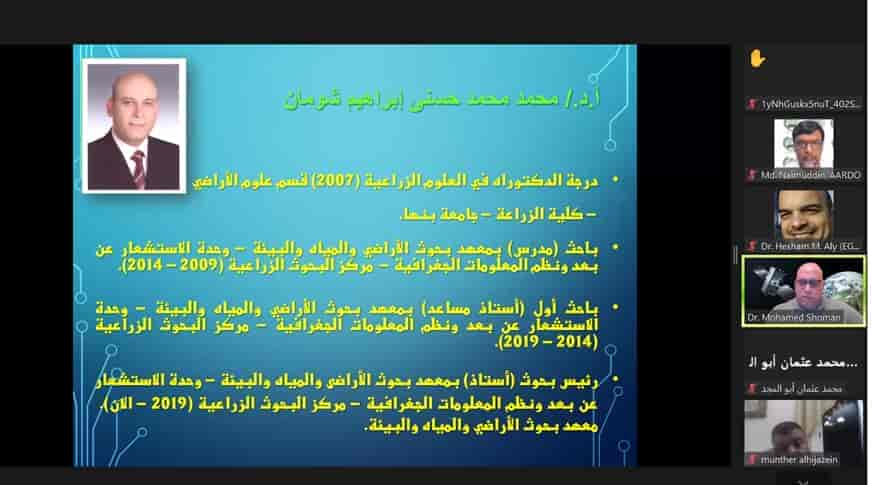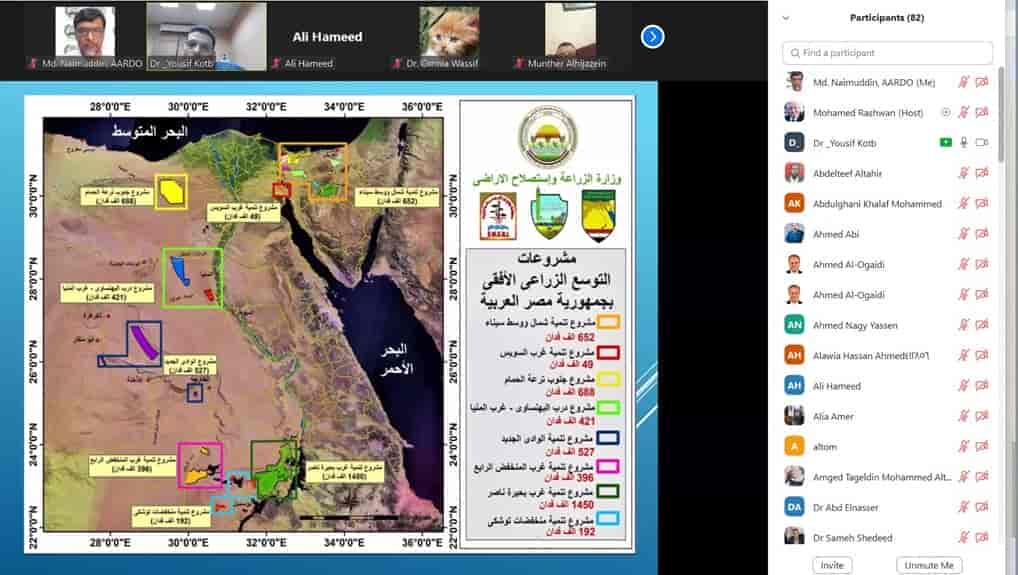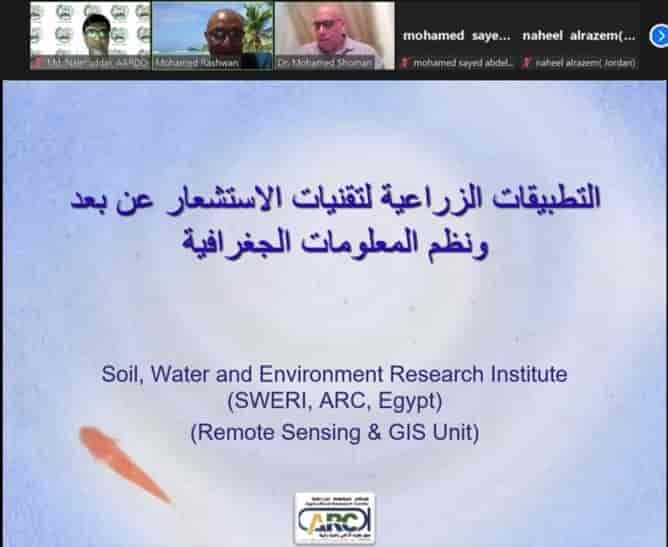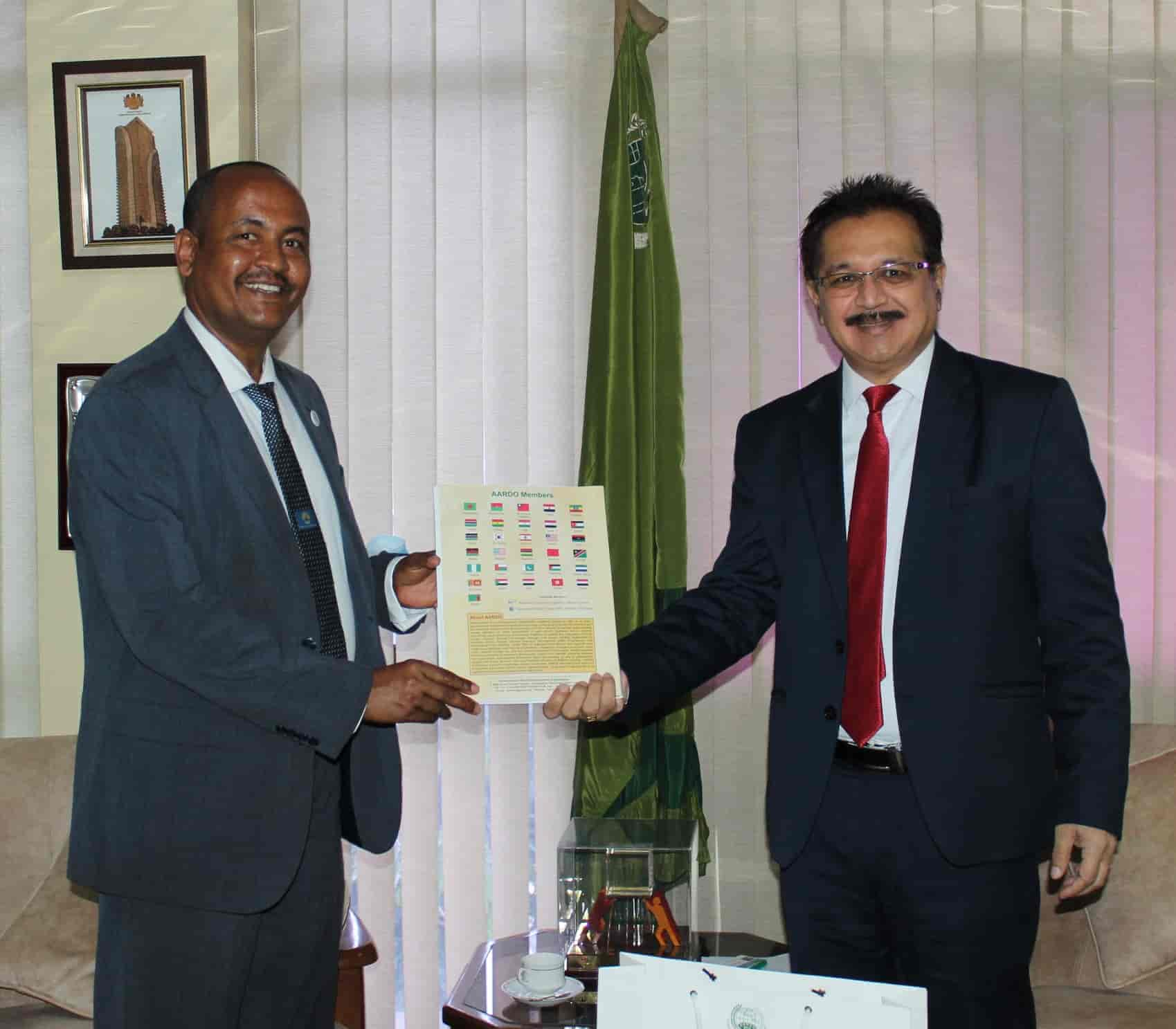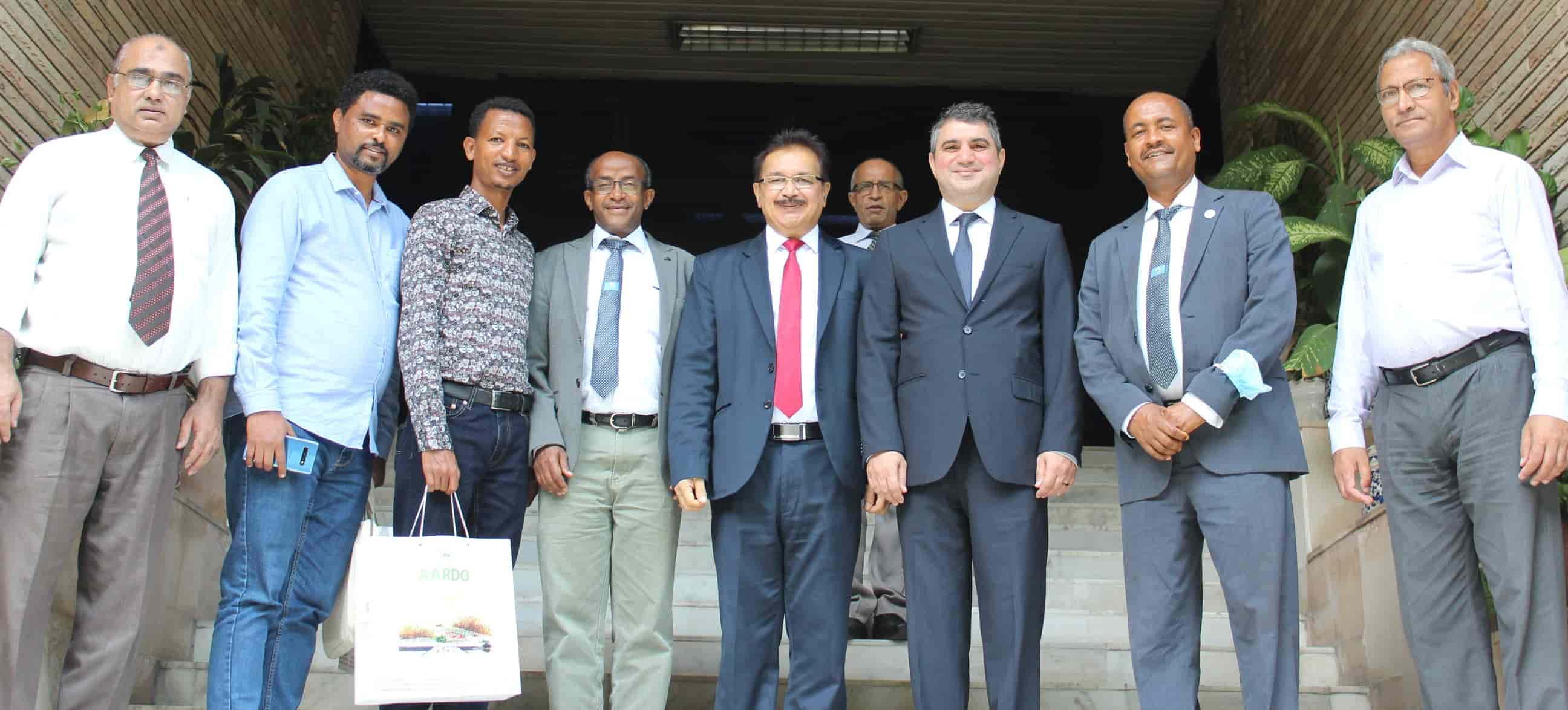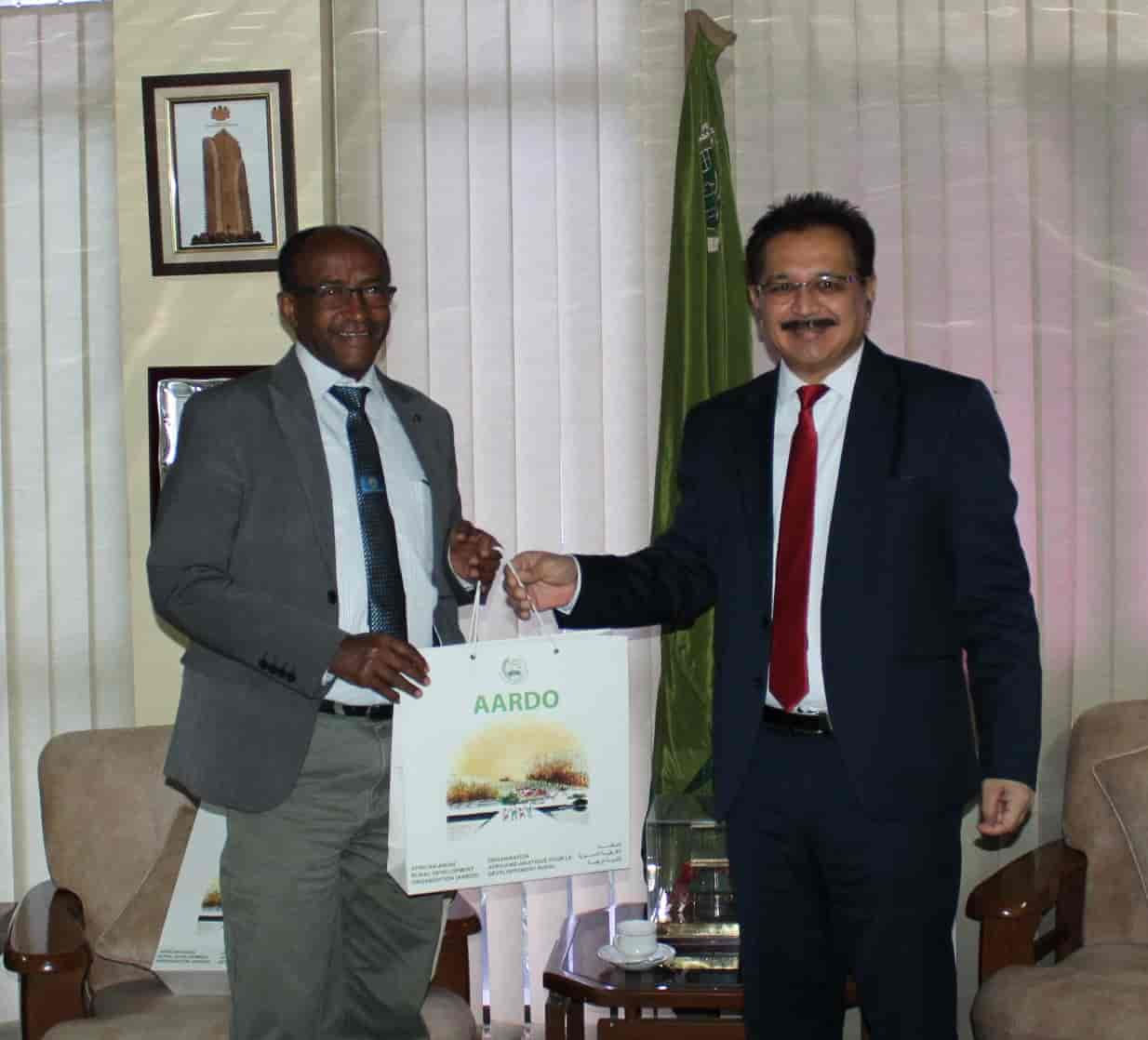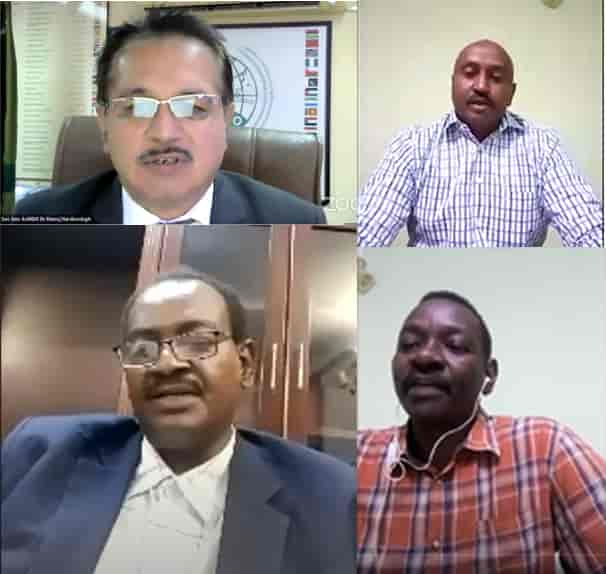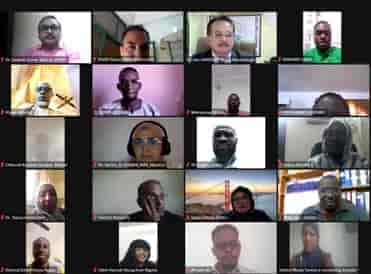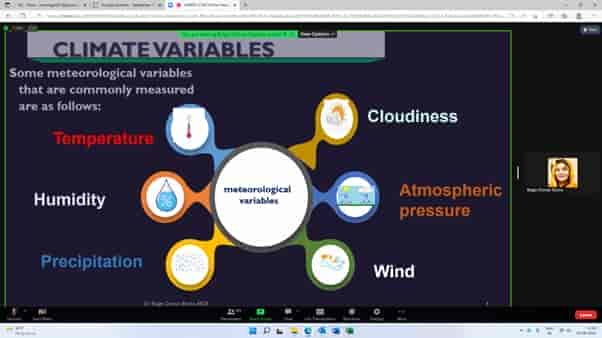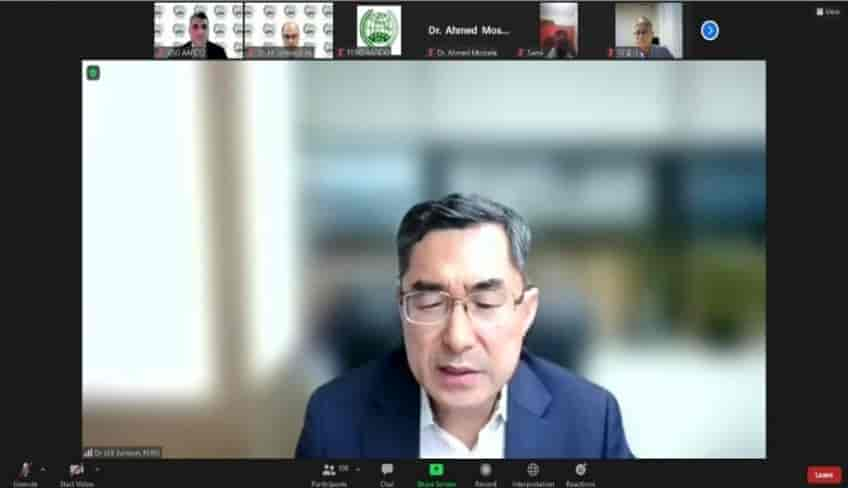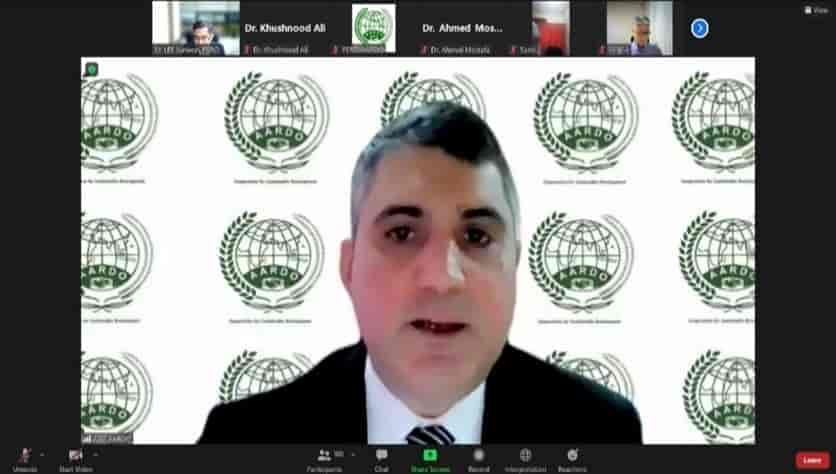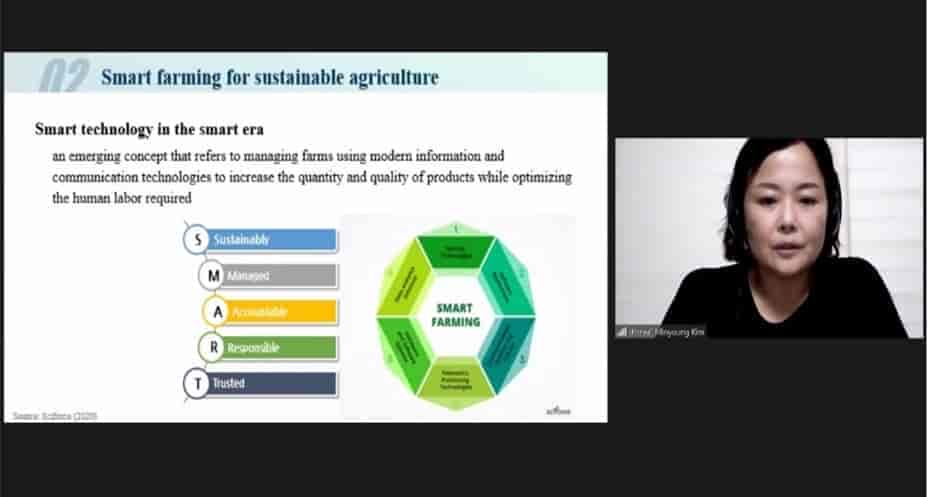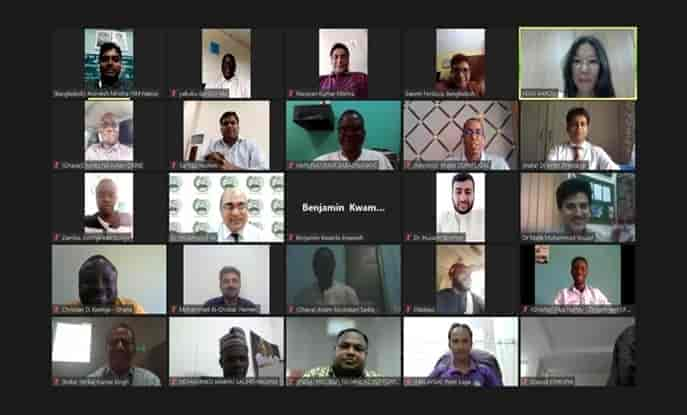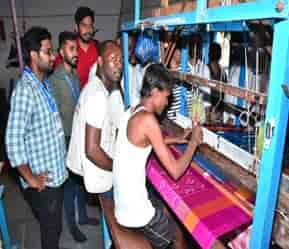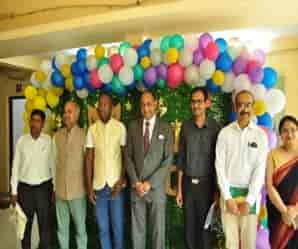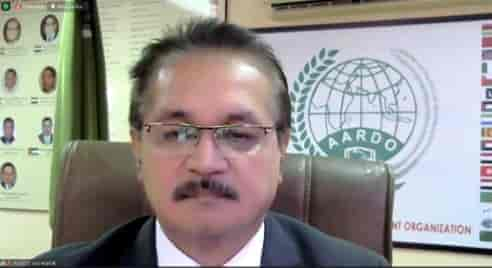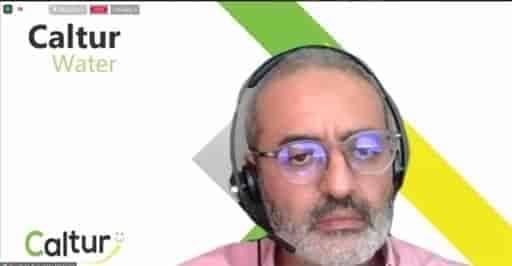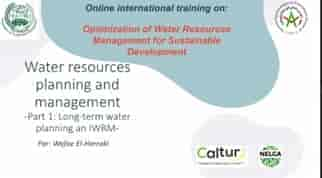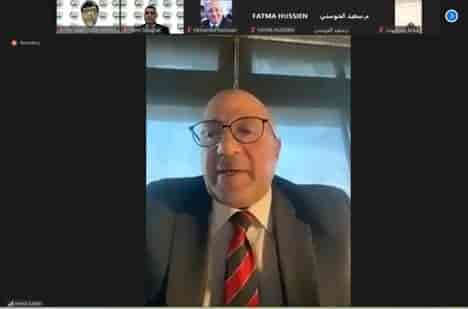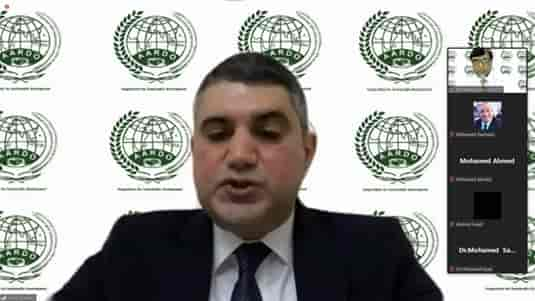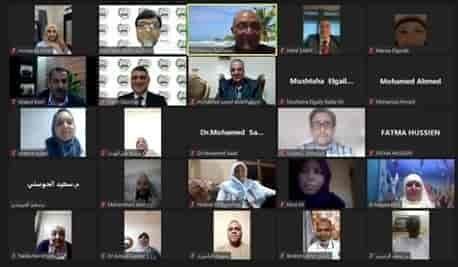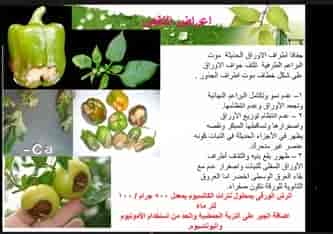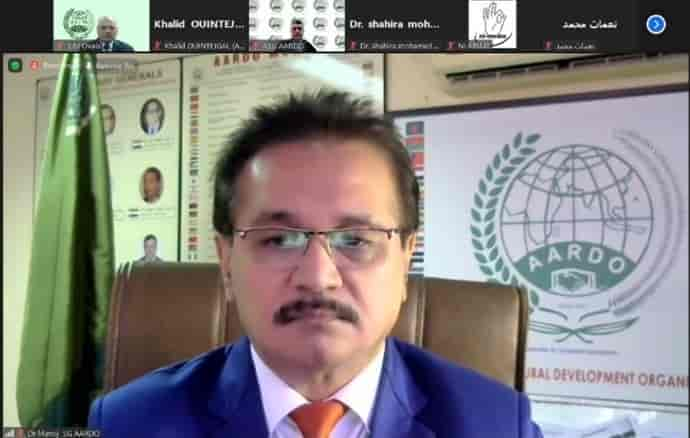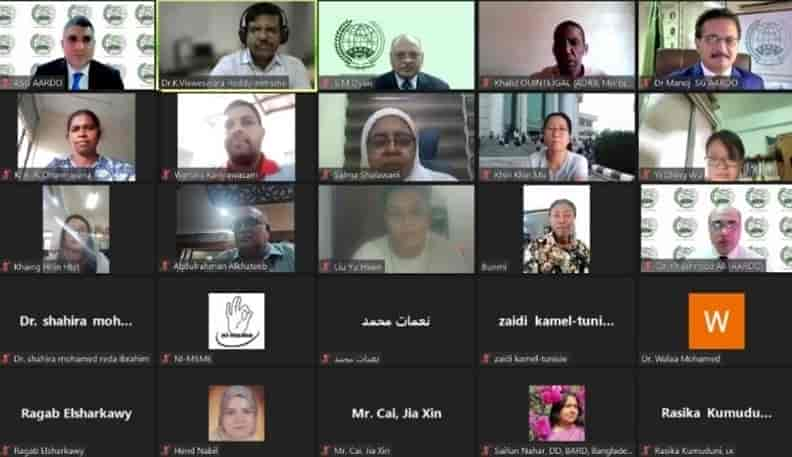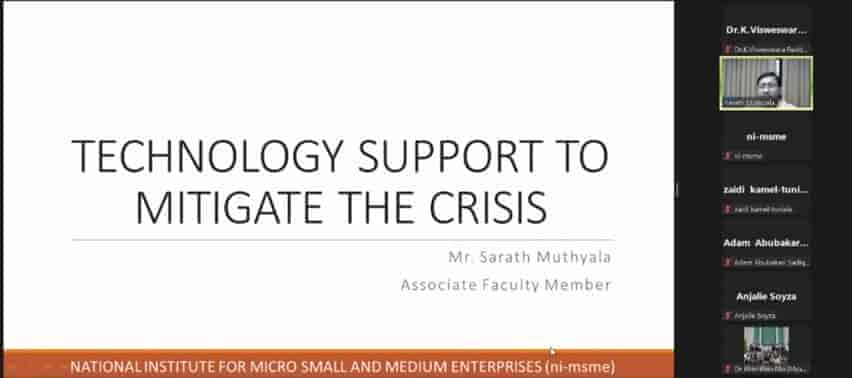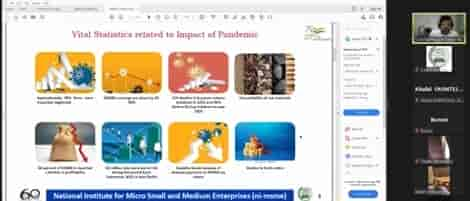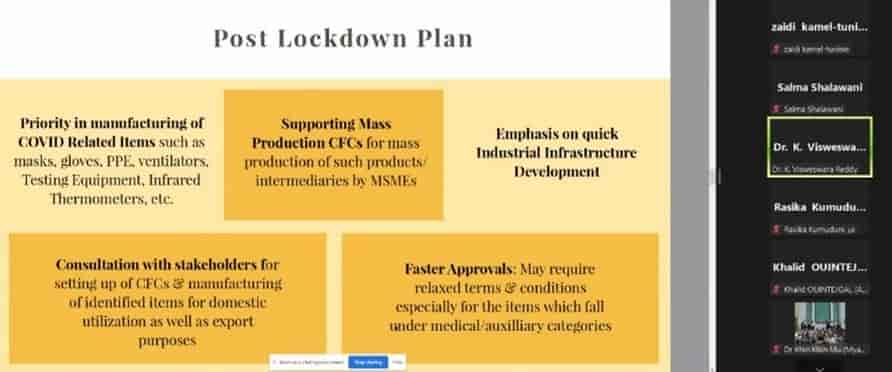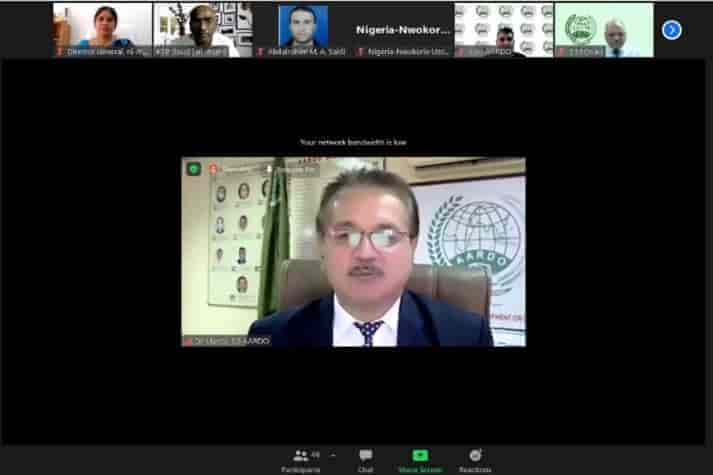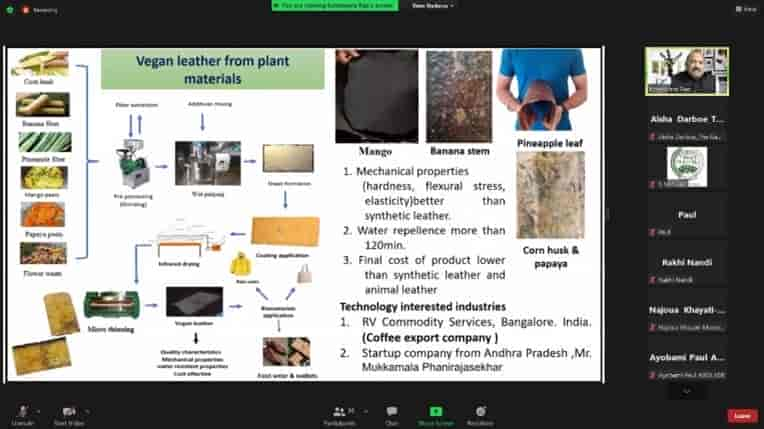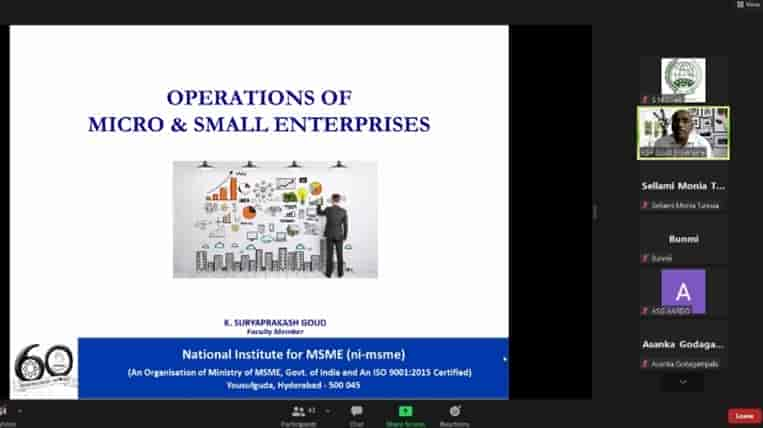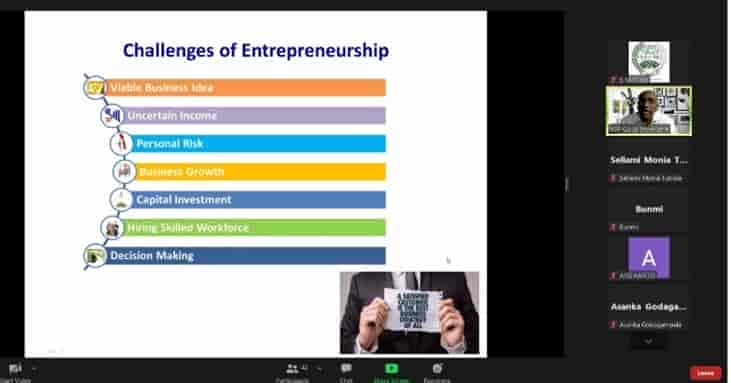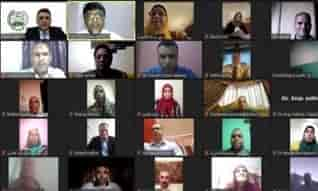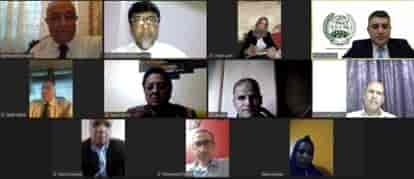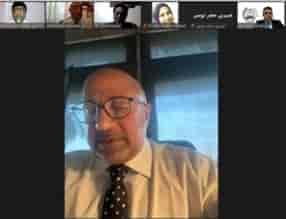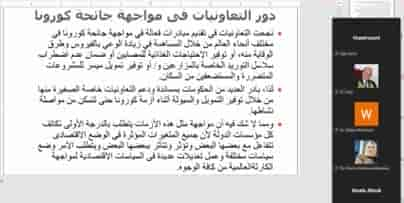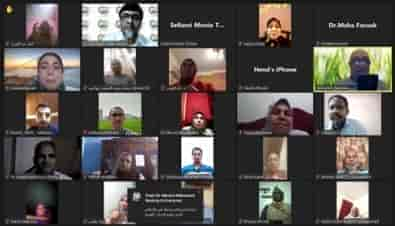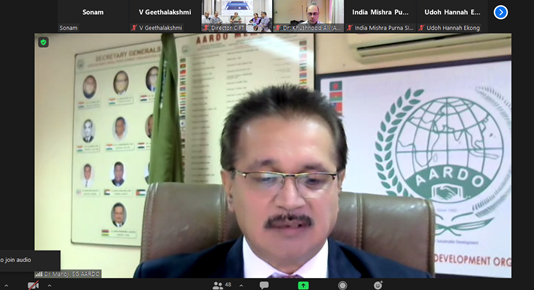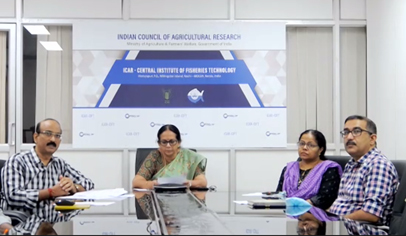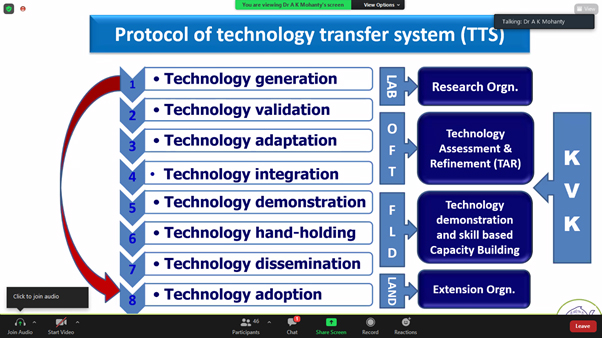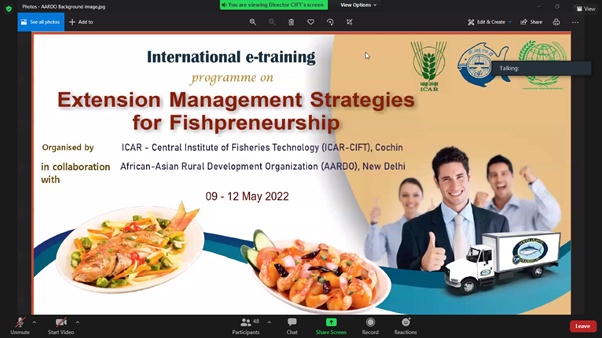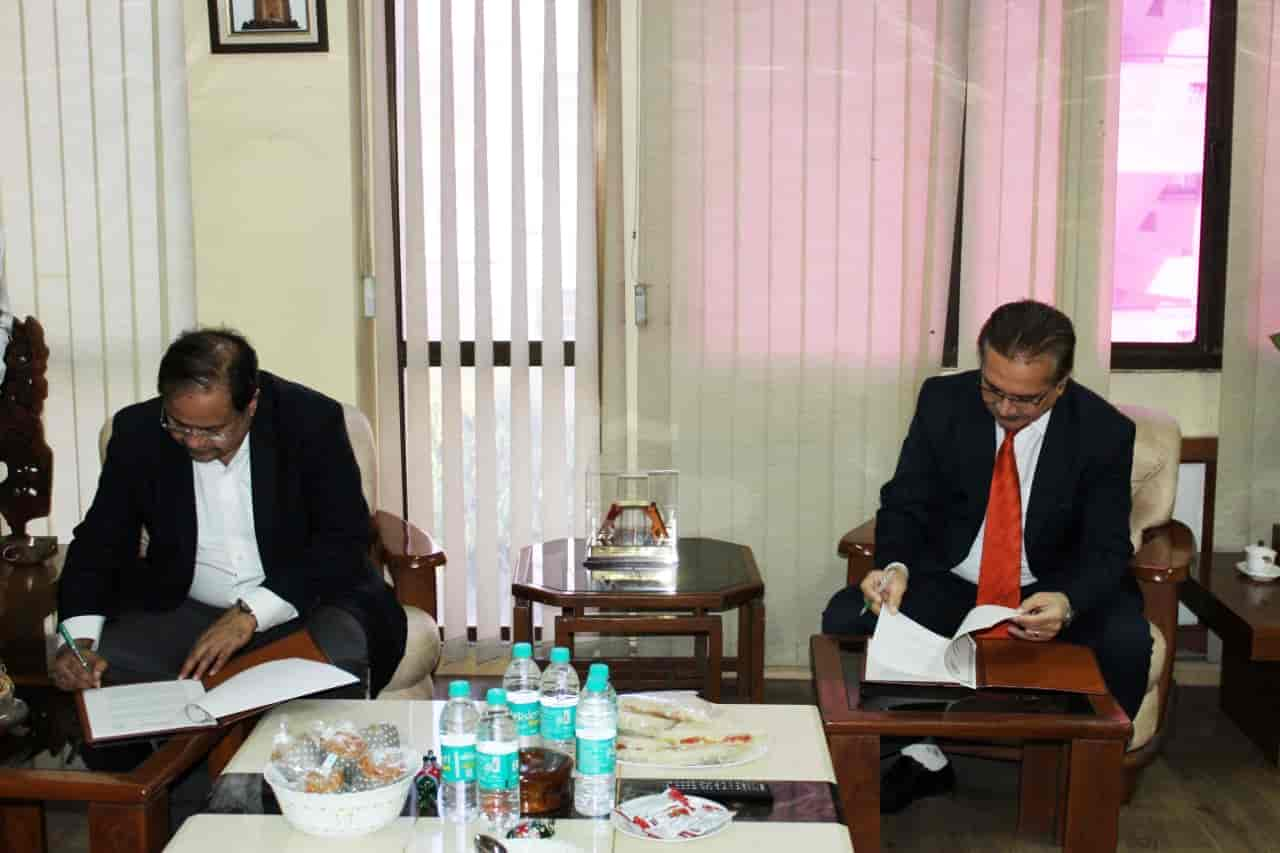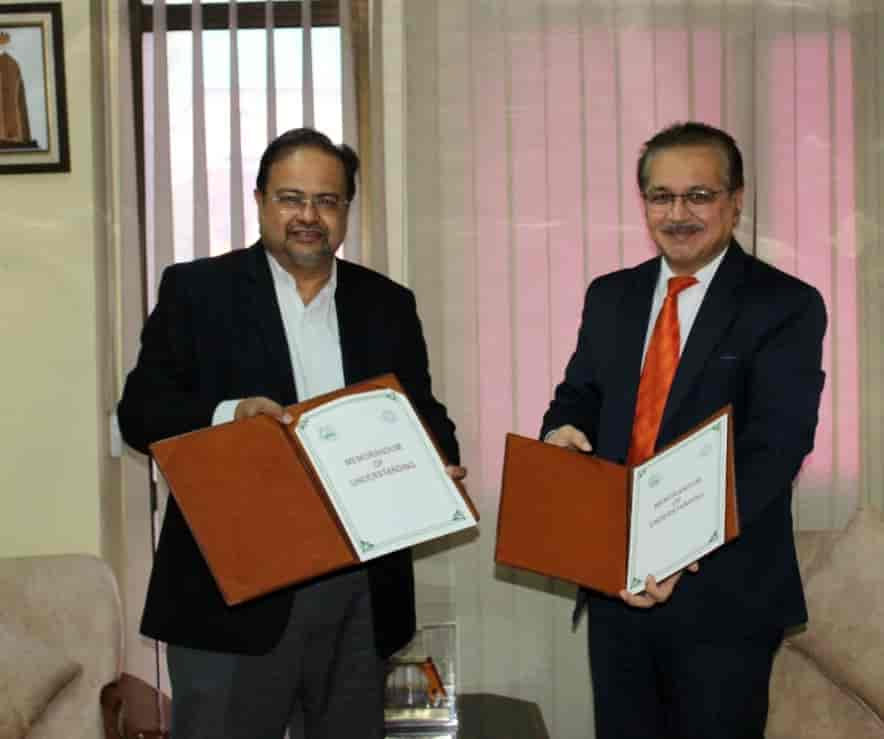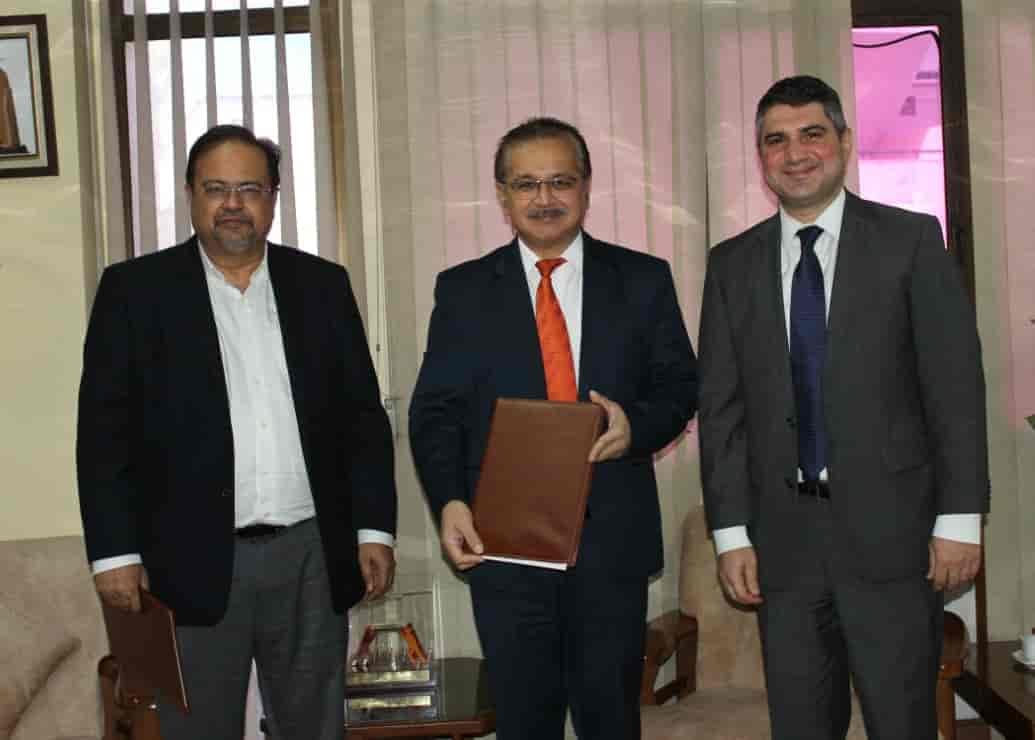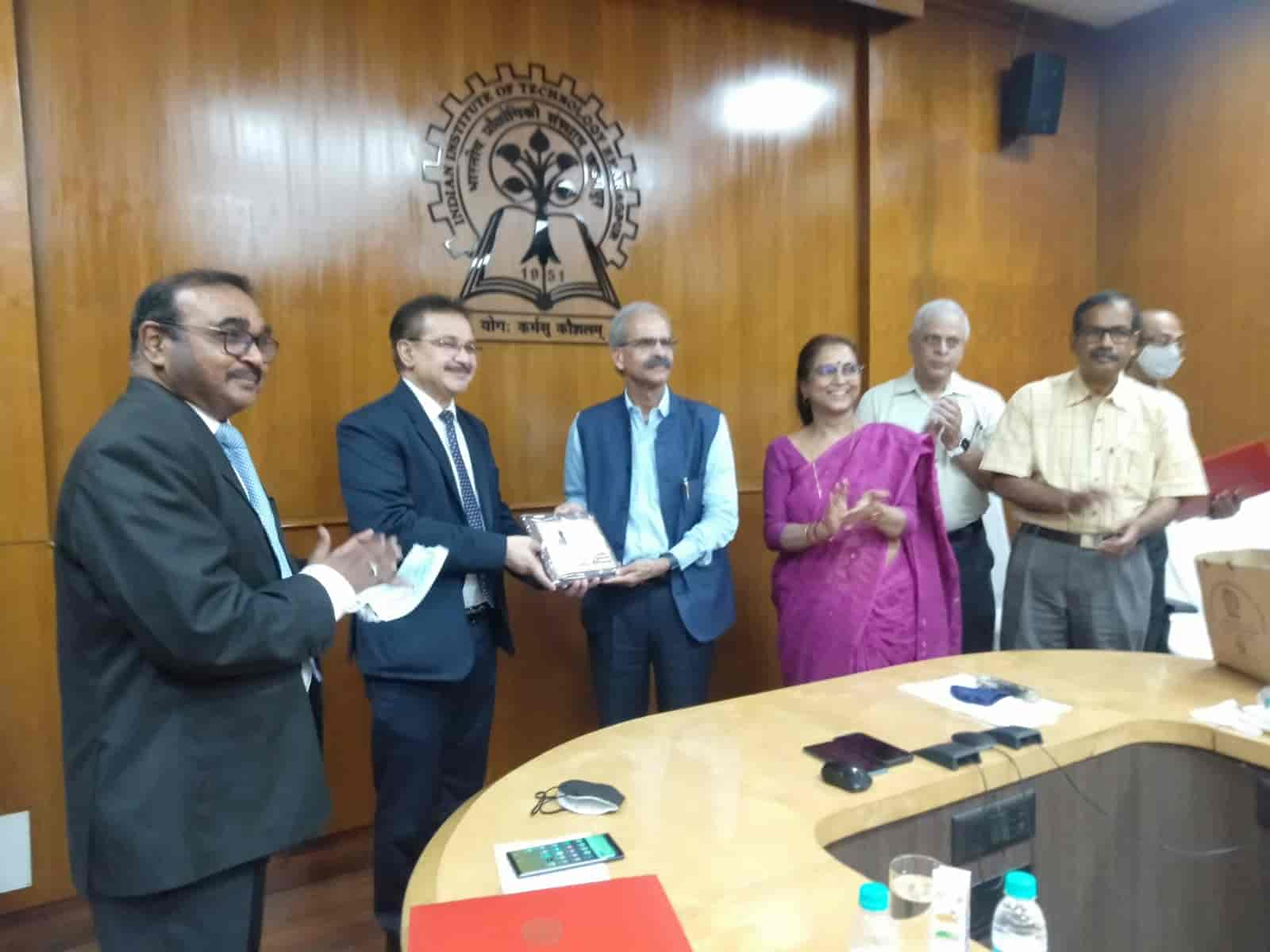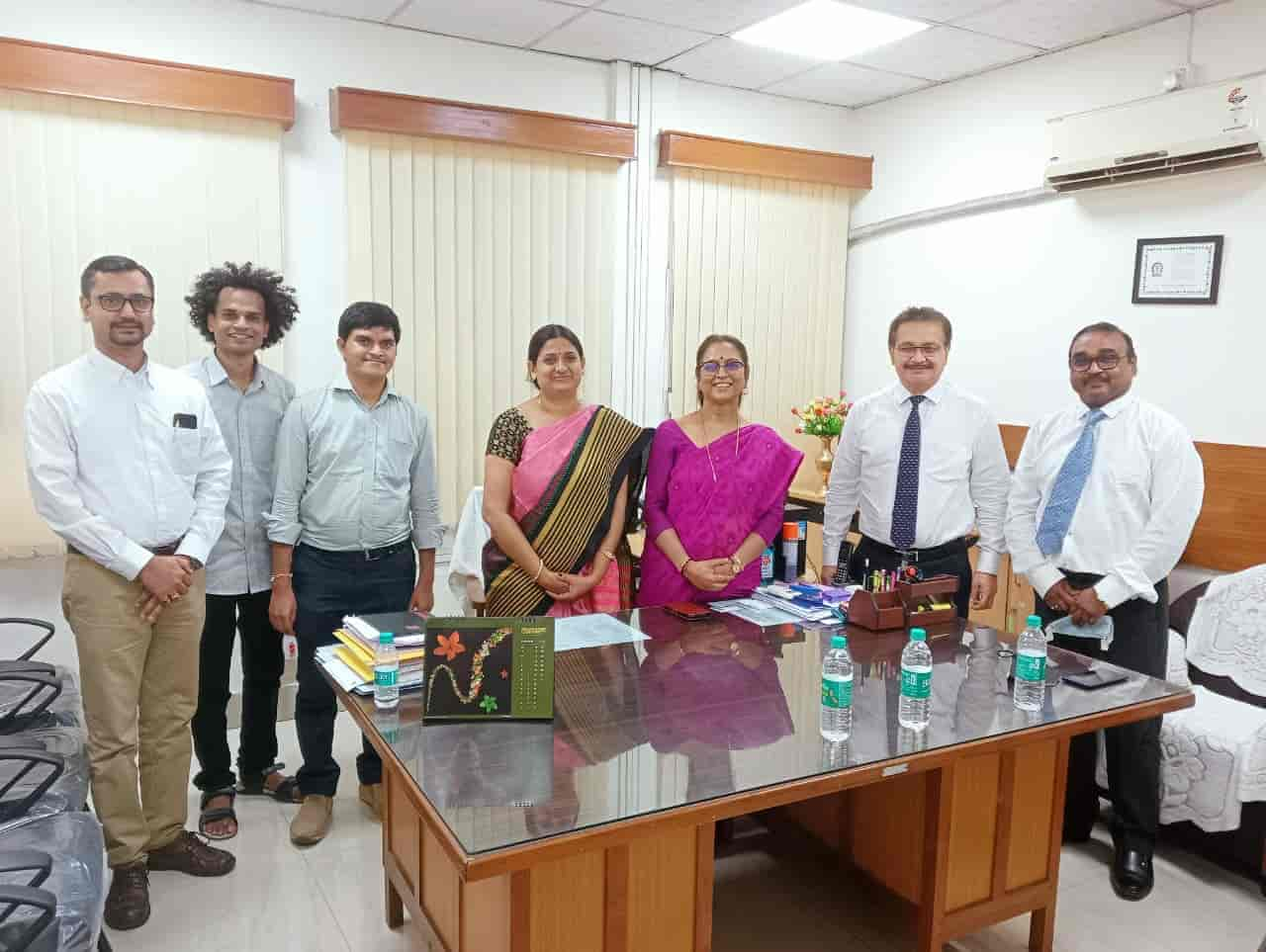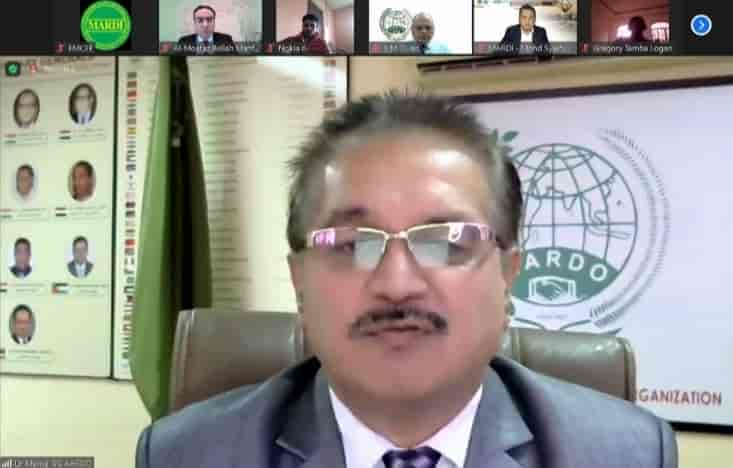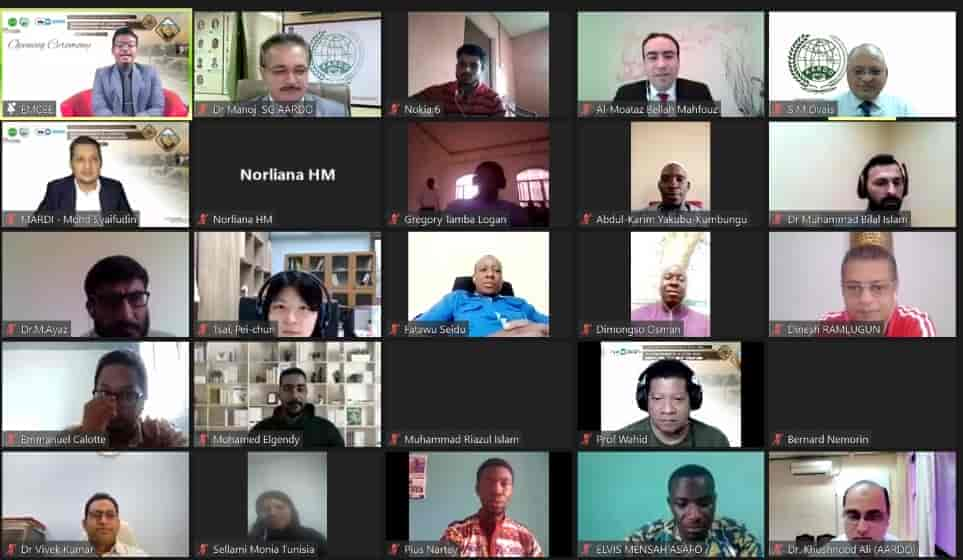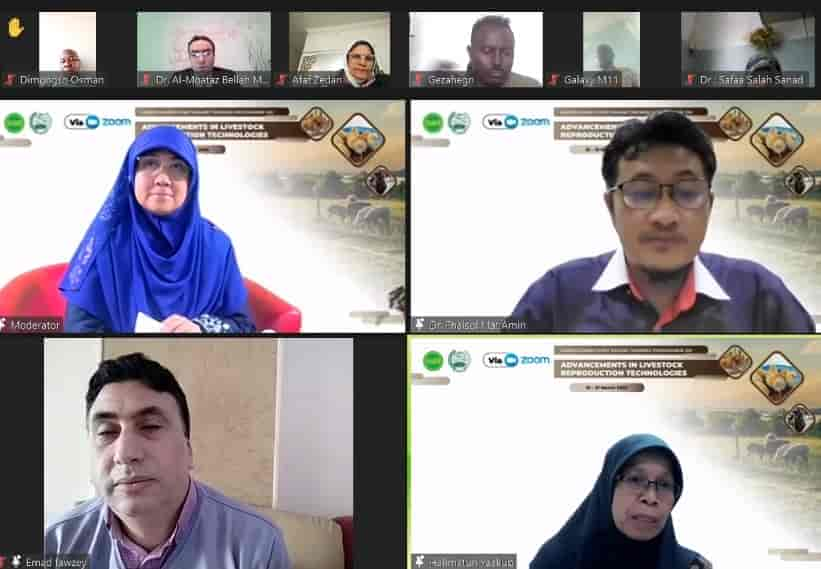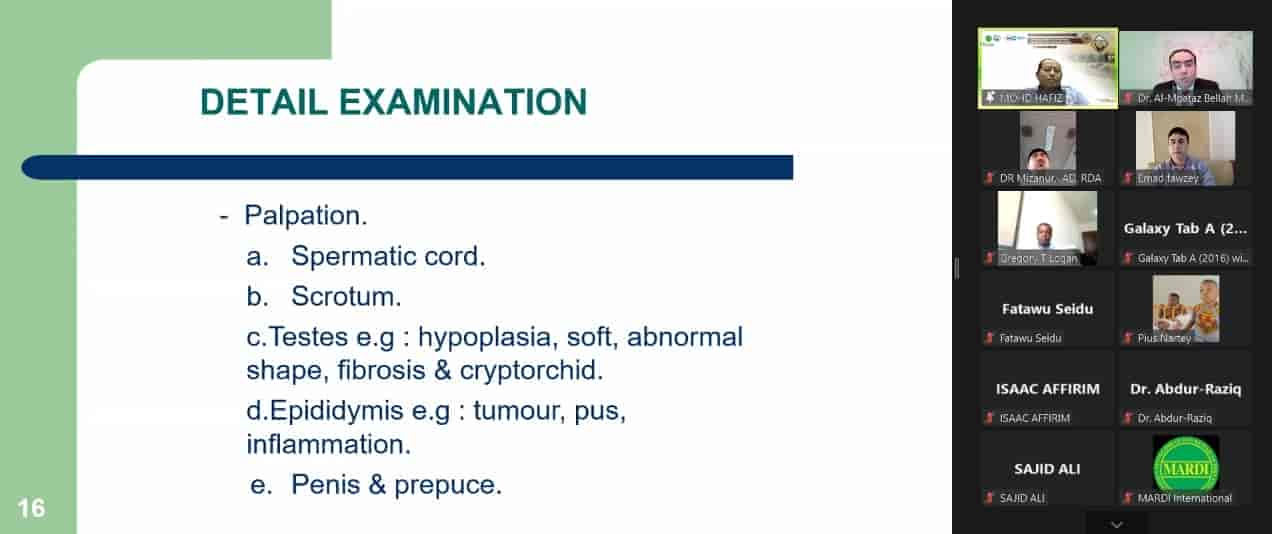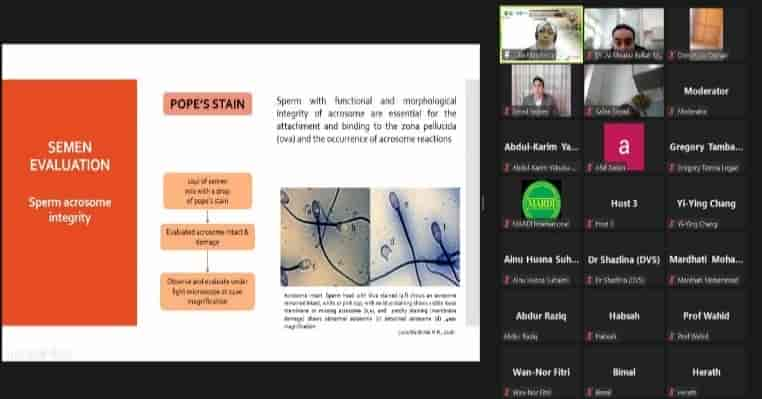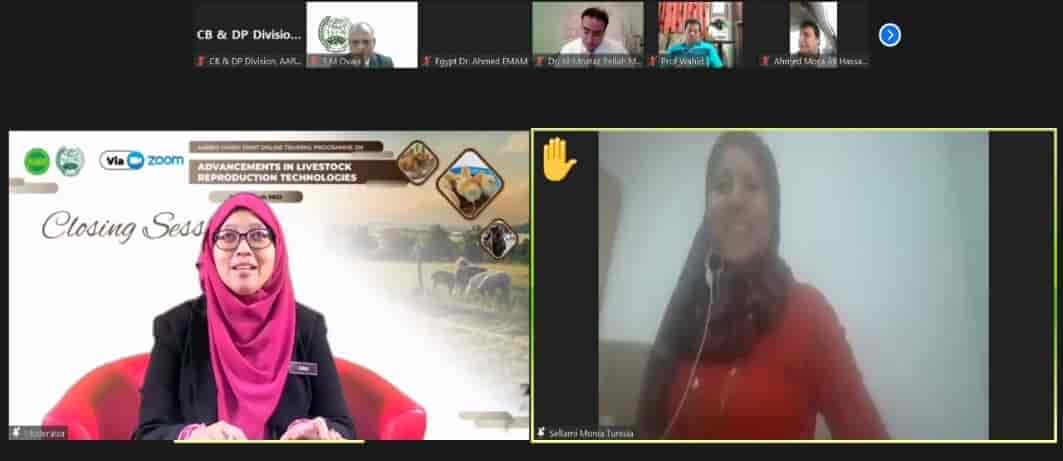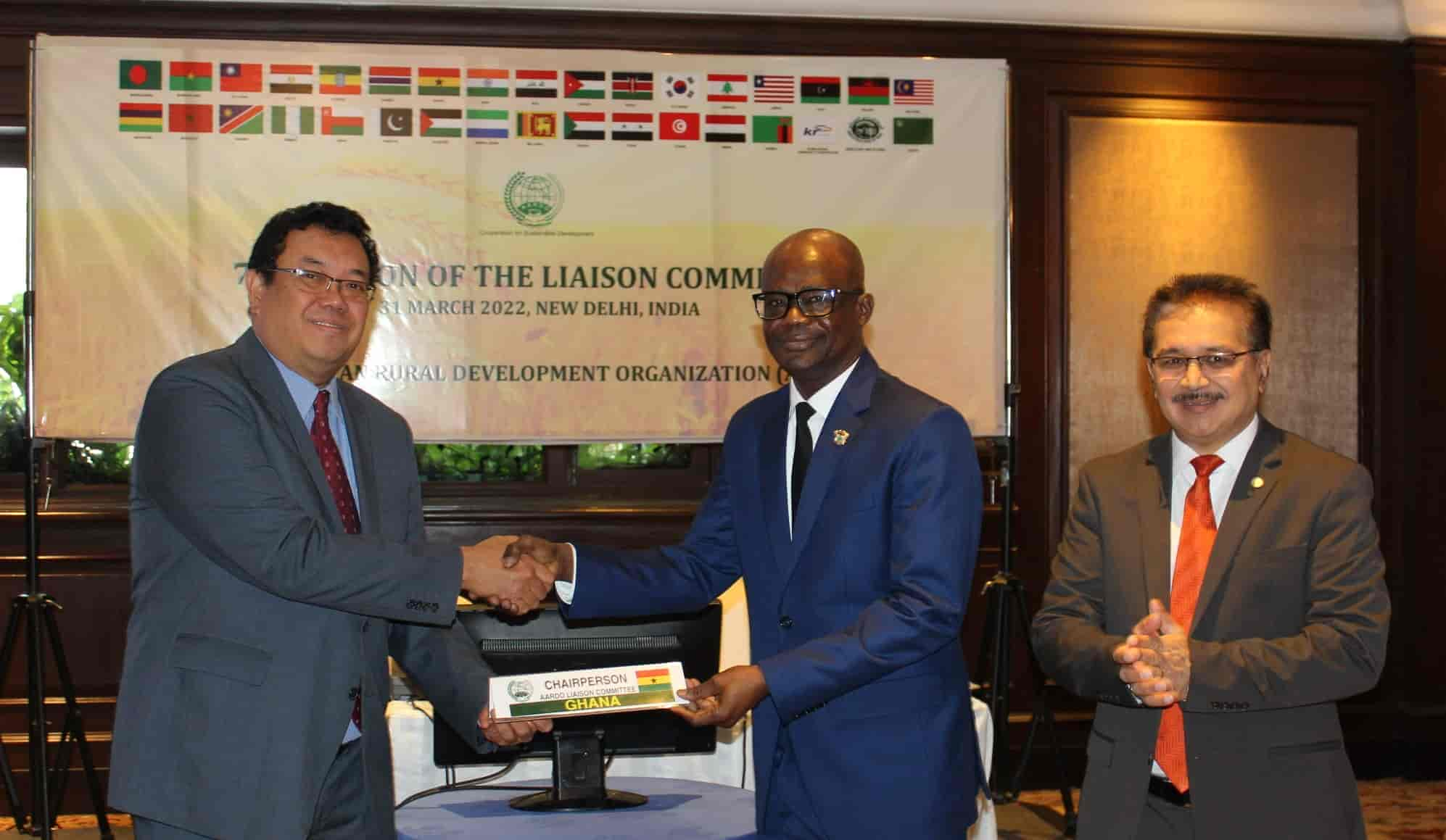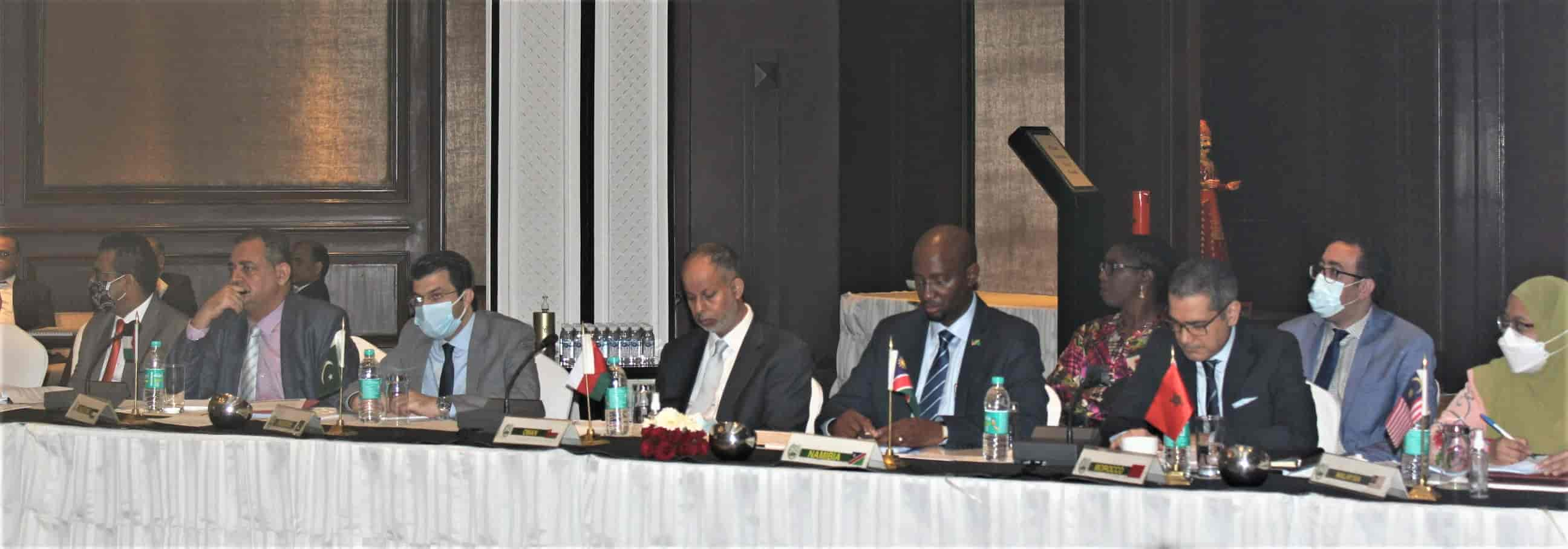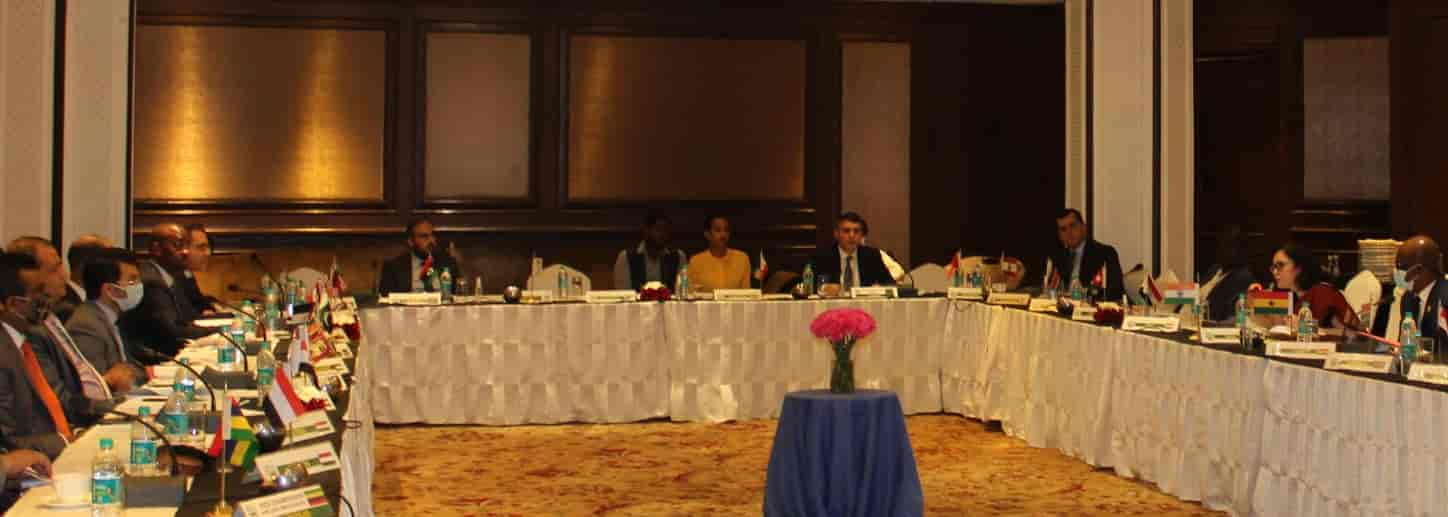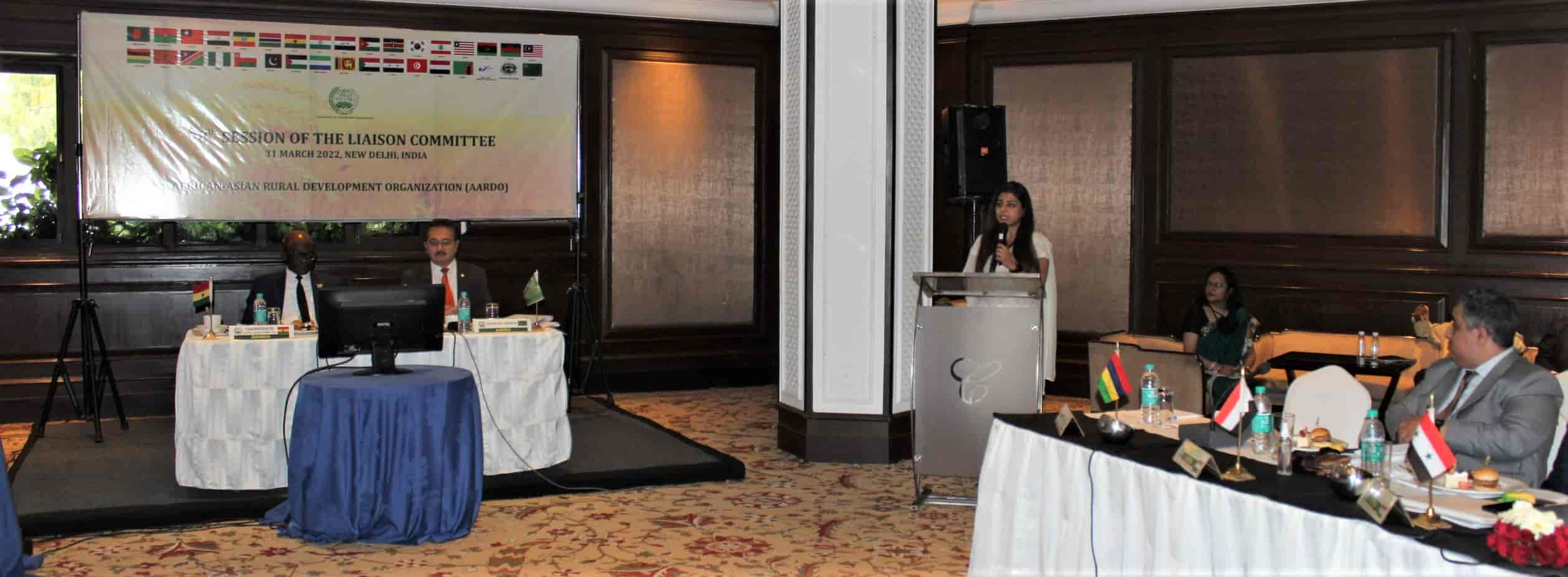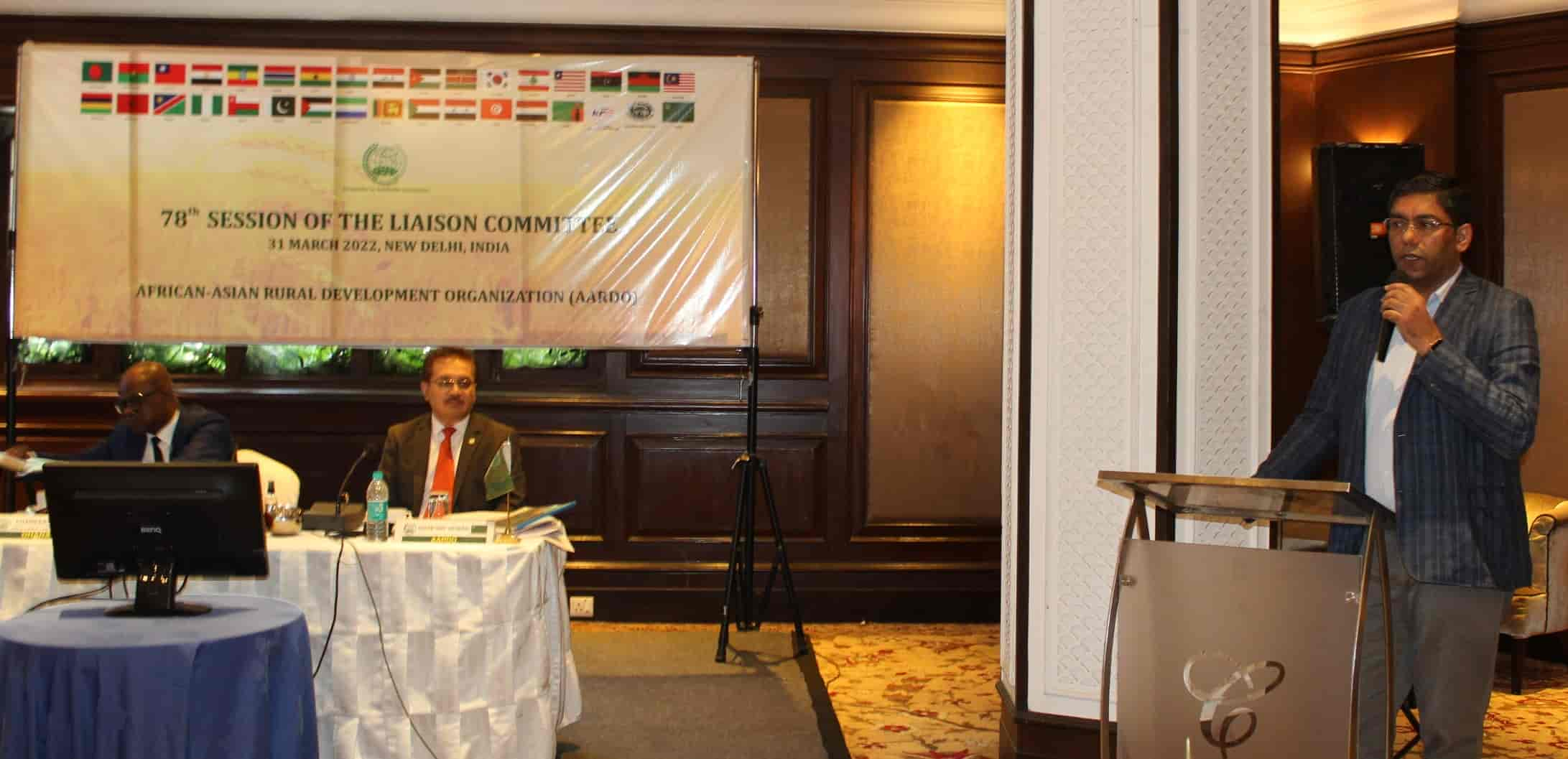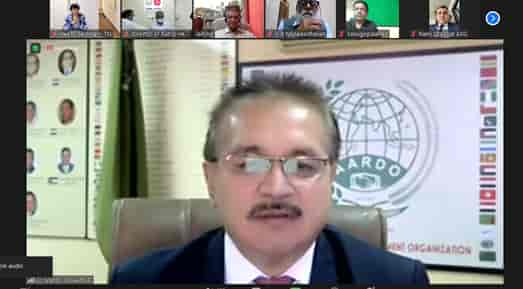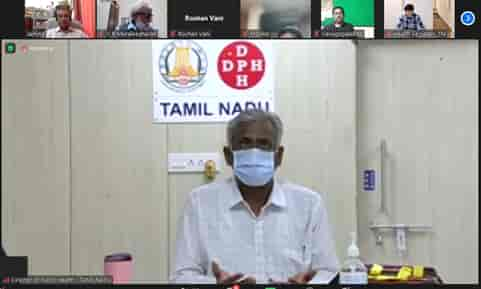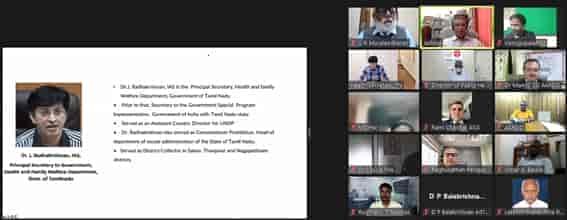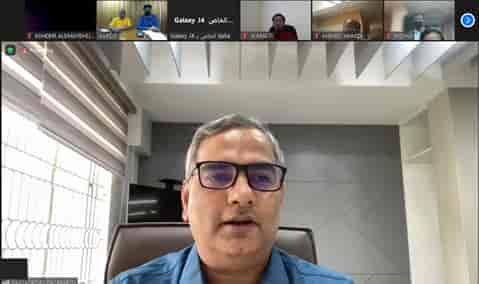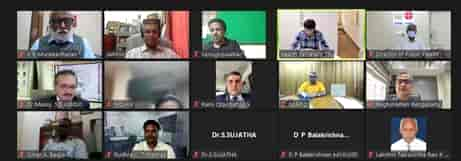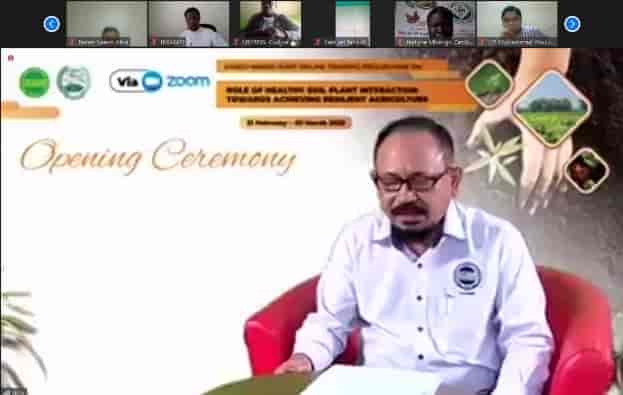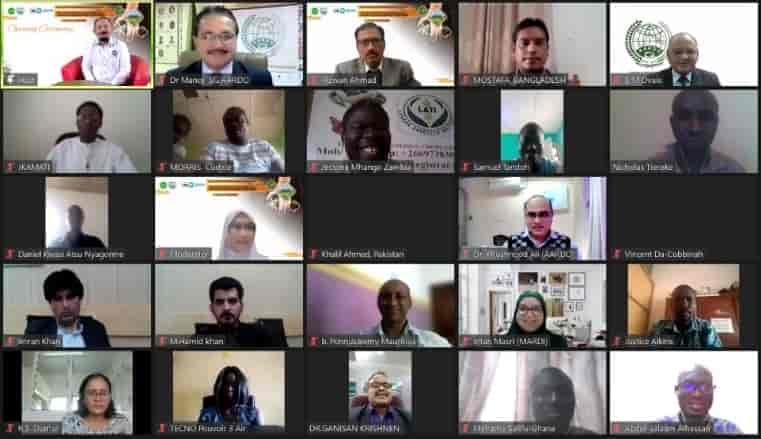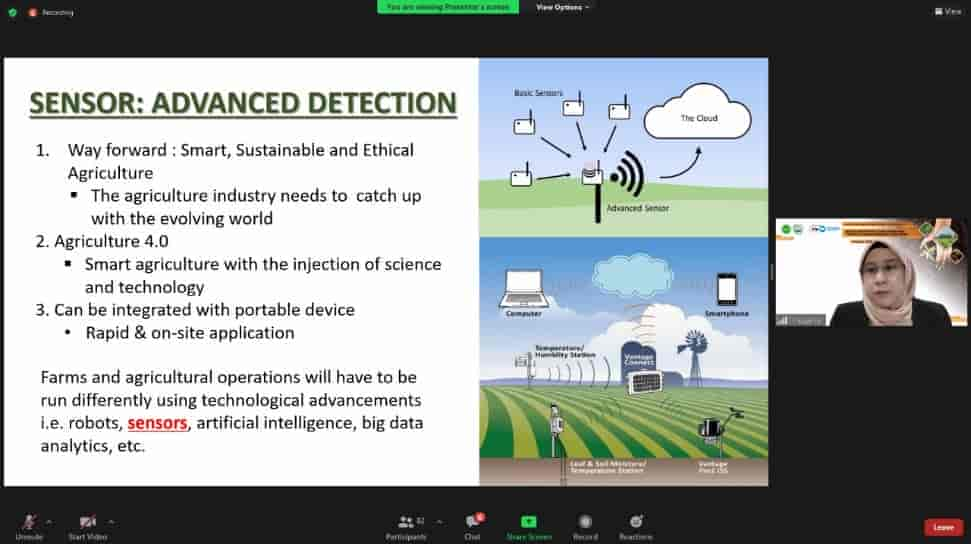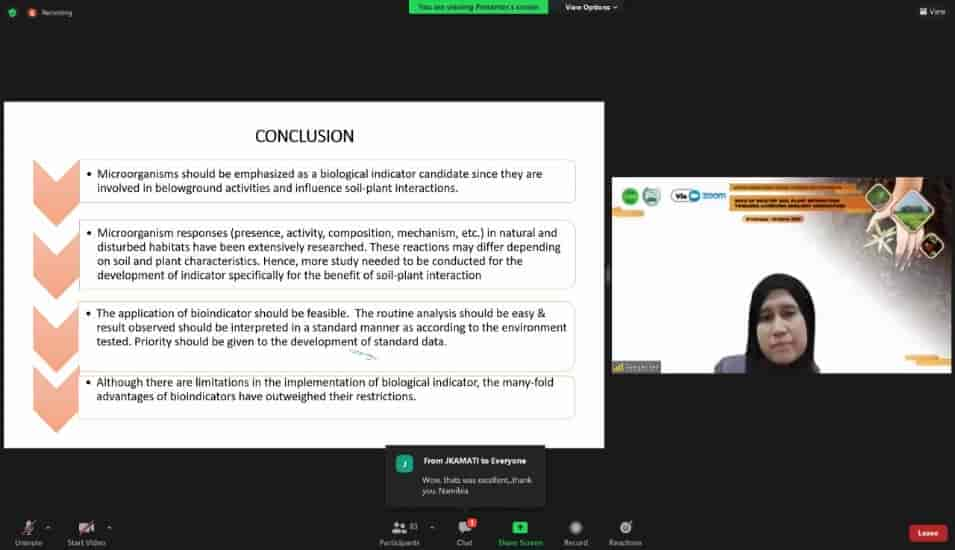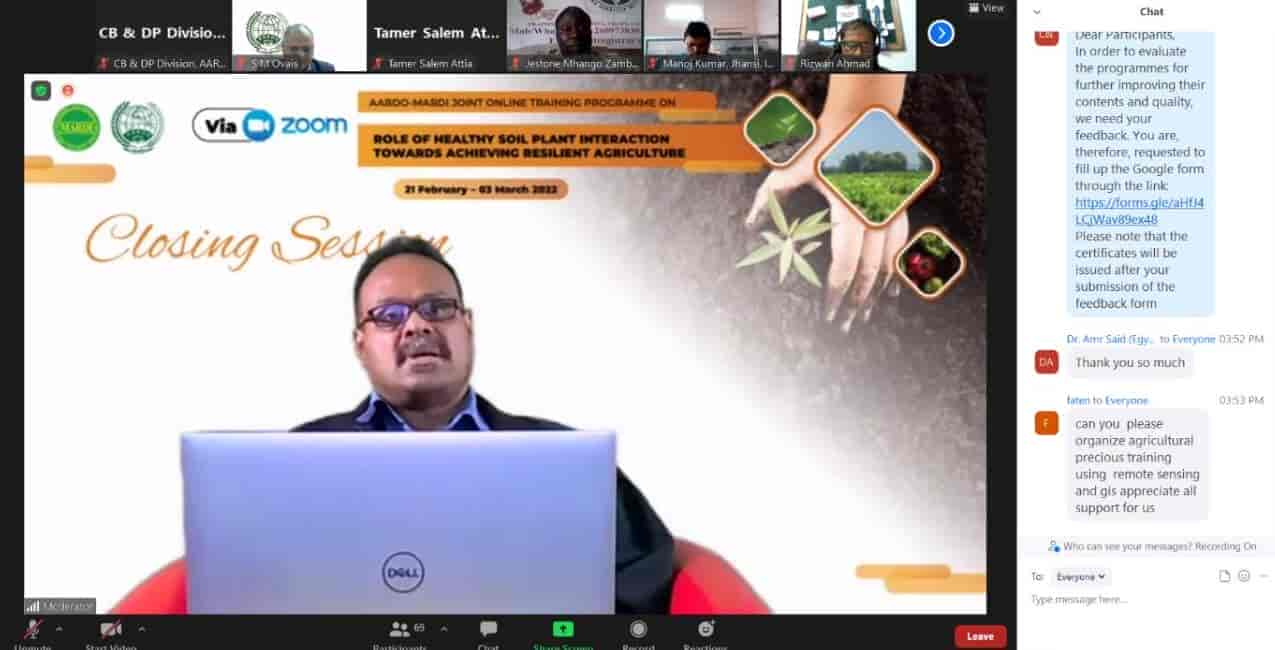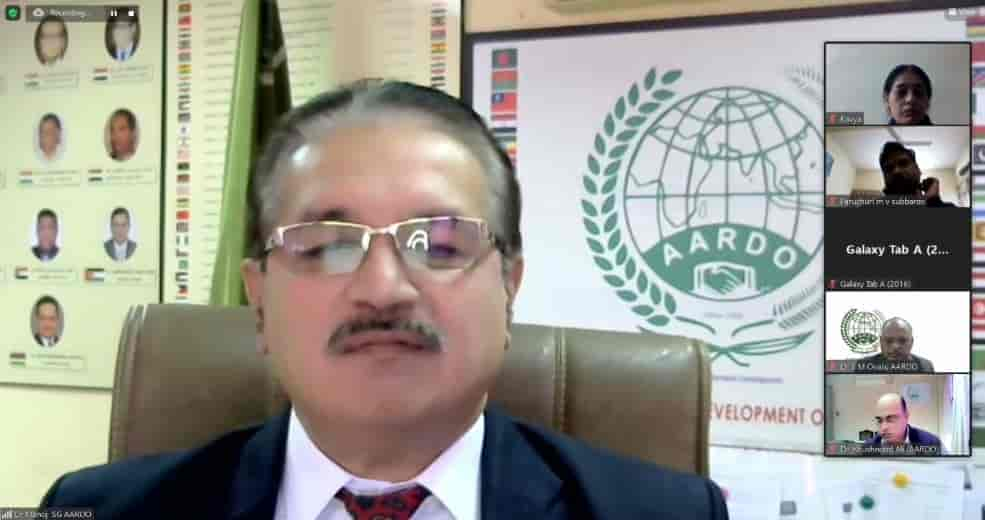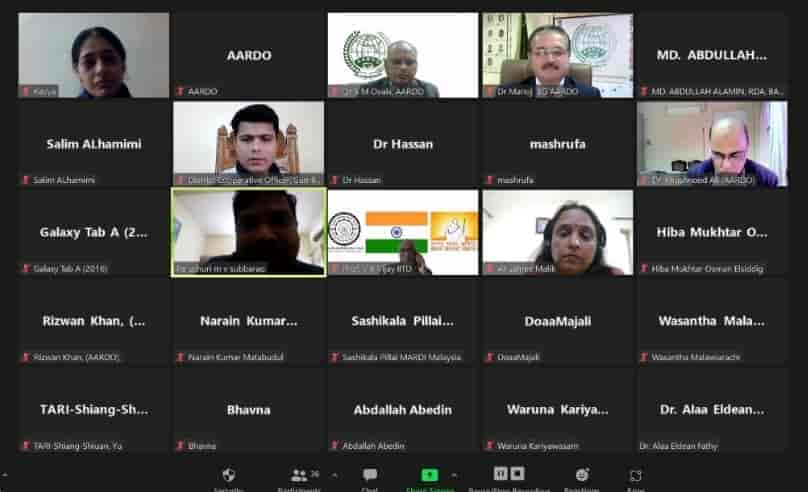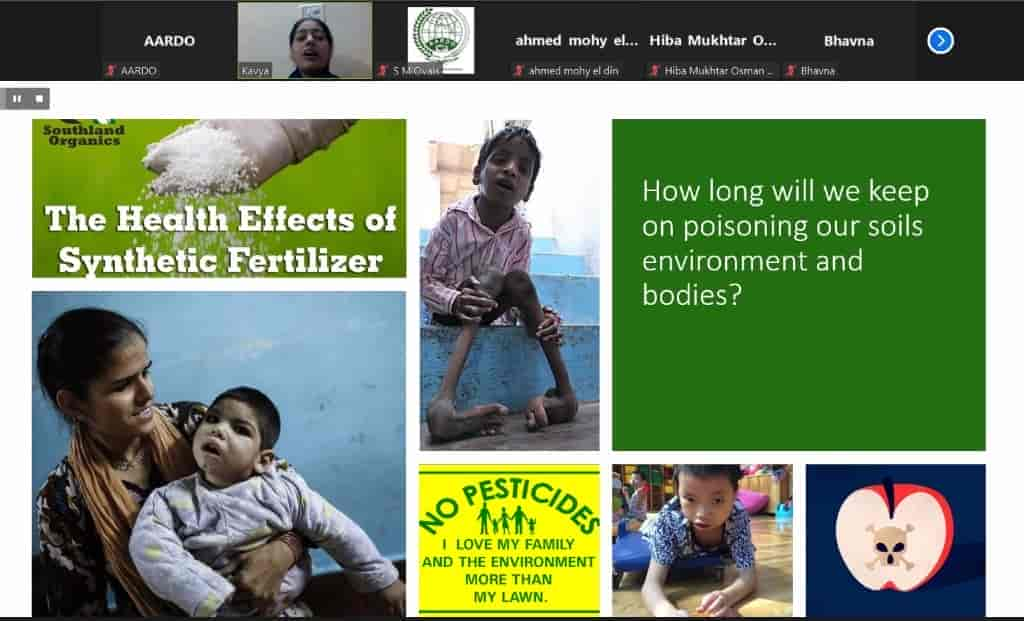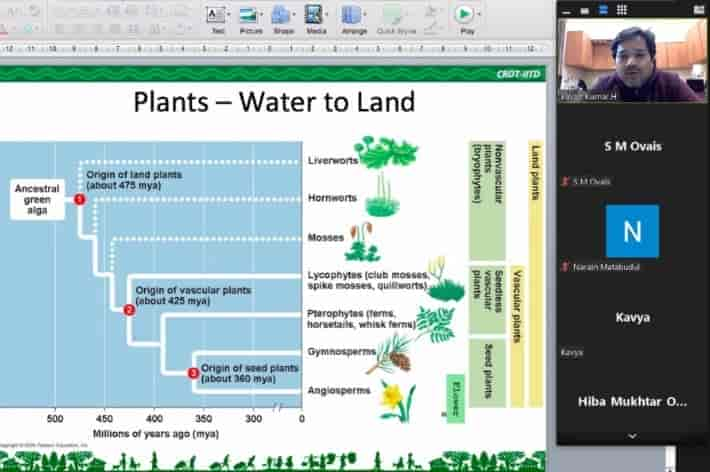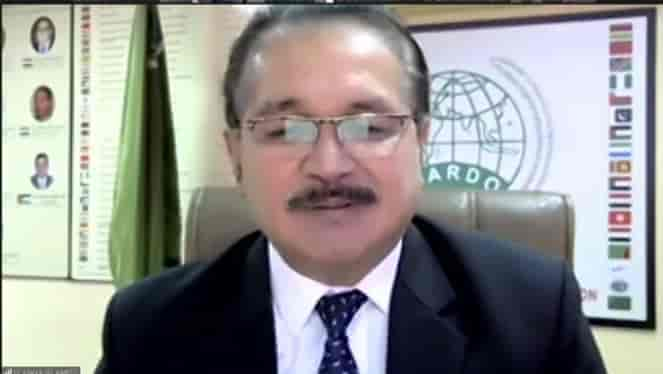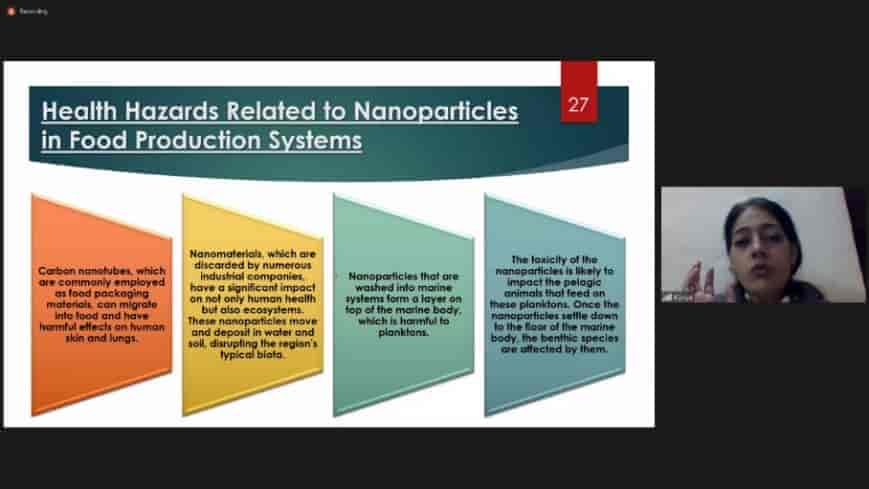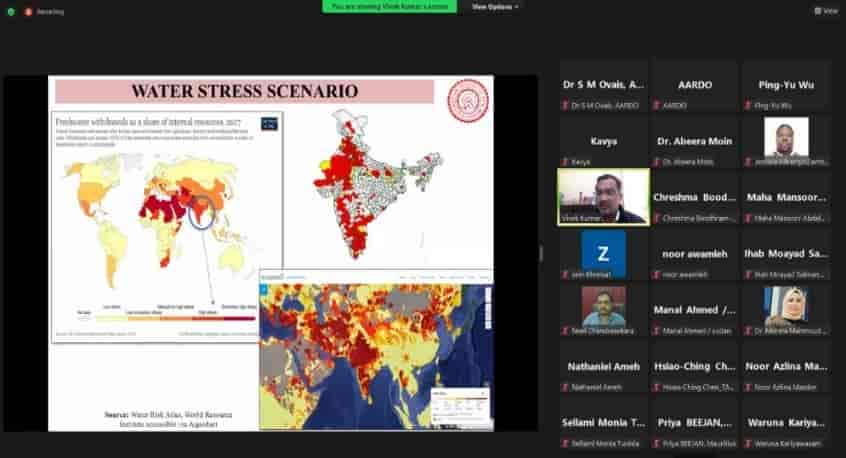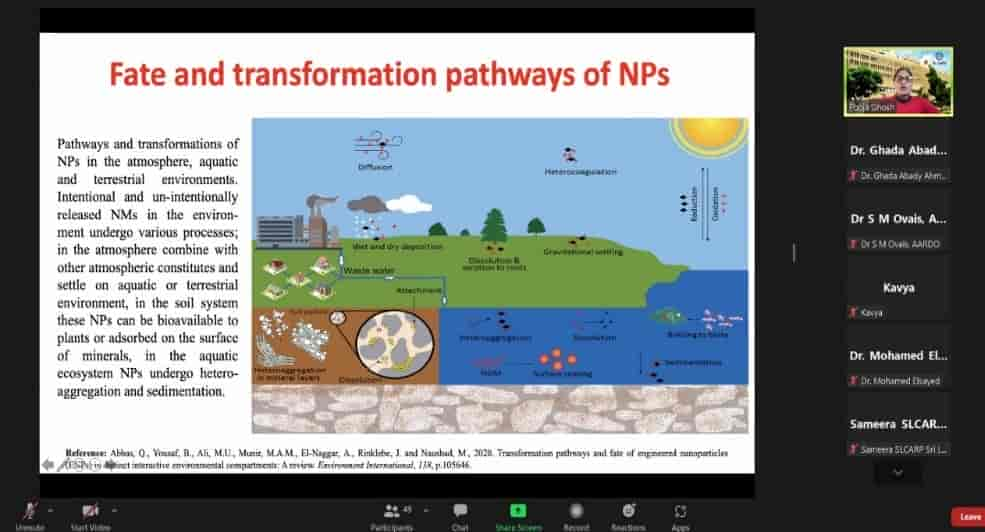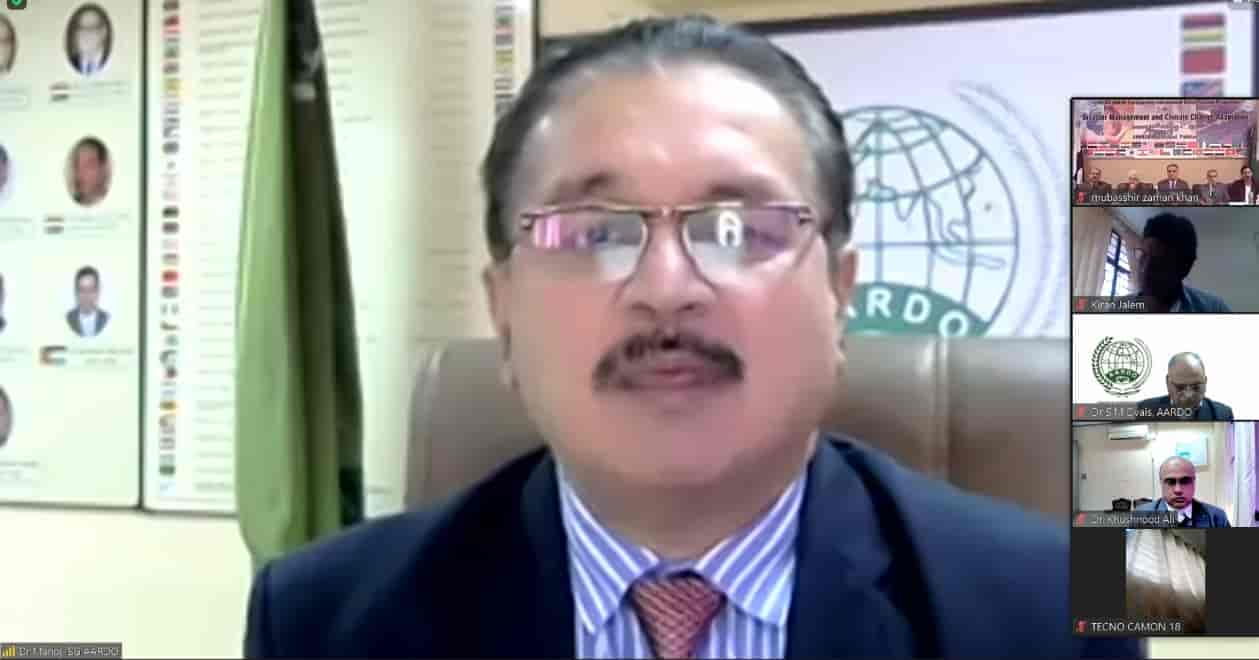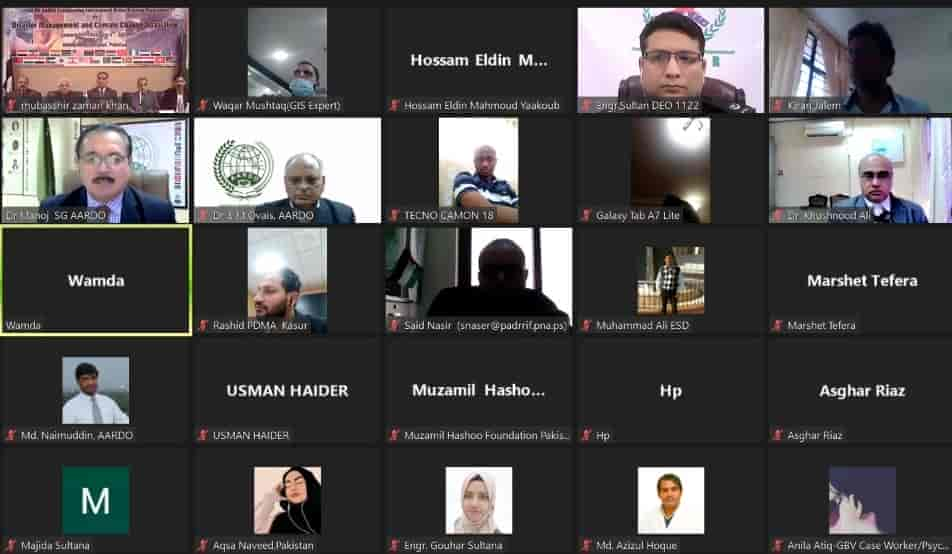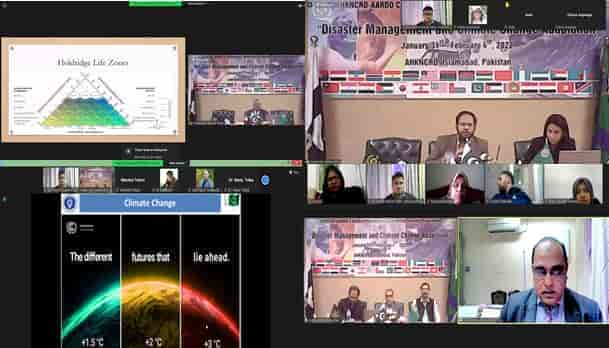News 2022
AARDO-ICAR CIFT International Offline training programme “Recent Technological Developments: Pre and Post Harvest Operations in Fisheries”
11 - 19 December
An international Training programme on “Recent Technological Developments : Pre and Post-Harvest Operations in Fisheries” was organized by AARDO in collaboration with ICAR-CIFT, Cochin, during 12-19 December 2022, under the additional contribution provided by Government of India. The international training programme had (10) ten participants from 10 AARDO member countries namely: Bangladesh, Ethiopia, Ghana, Iraq, India, Malaysia, Oman, Sudan, Tunisia and Zambia.
The inaugural session of the programme which was held on 12th December 2022, was attended by H.E the Secretary General, AARDO Dr Manoj Nardeosingh as Chief Guest along with Dr. A. Gopalkrishnan, Director, ICAR-CMFRI as Guest of Honour. The function was presided over by Dr. George Ninan, Director, ICAR-CIFT in presence of the Course Coordinators namely Dr A. K. Mohanty, Head, EIS Division; Dr Bindu J., Head, Fish Processing Division and Dr Ramesan M.P., Principal Scientist, Fishing Technology Division, ICAR-CIFT.
In his inaugural address, the Secretary General, stated that AARDO has, saddled itself with the mission of more science to the society and has been fully re-engineered and geared up to answer to the clarion call of stepping-up, speeding-up and scaling-up the transfer of innovations and affordable technologies in AARDO member countries. AARDO has come up with a sustainable model to transfer innovative, descriptive technologies in AARDO member countries and other concerned stakeholders”. He also further mentioned that participants may utilize AARDO platform for transferring of innovative affordable technologies developed by ICAR-CIFT, which may play an important role in fish production and its post-value addition in their respective countries.
Presiding over the inaugural function, Dr George Ninan, Director, ICAR-CIFT said, “Global fishery is gaining policy attention day by day owing to its potential for providing food and nutrition for the small farm holders, in addition to its livelihood implications on large-scale fisher community. The sector has established its dominance in the socio-economic growth of many developing economies by providing opportunities for income and employment generation across the value chain.” Dr A. Gopalkrishnan, Director, ICAR-CMFRI also delivered his felicitation address as Guest of Honour.
The main objectives and contents of the program revolved around identifying cost-effective technologies for fish harvesting; Responsible fishing for sustainable resource management in fisheries; Development and standardization of different post-harvest protocols and practices, value addition, and packaging techniques; Advanced techniques for extraction of biomedical, pharmaceutical and industrial product from aquatic organisms; Modern biotechnological tools and approaches for fish disease diagnostic and surveillance; Quality control, management and maintaining food safety standards in fish and fish-based products; Design and development of tools and techniques for harvesting and storage of fishes; Innovative extension management techniques, value chain development, gender and entrepreneurship in fisheries for livelihood security.
The programme was successfully concluded on 19th of December 2022. The valedictory function of the programme was graced by Dr. M. Karthikeyan, Director, Marine Products Export Development Authority as Chief Guest in presence of Dr. George Ninan, Director, ICAR-CIFT, who presided over the function. Highlighting the overwhelming export potential of fishery sector of India, the Chief Guest Dr. Karthikeyan lauded the role of CIFT in strengthening the Indian fish export. The participants, in their feedback highly cherished the importance of such training programme and expected a strong technical cooperation of their country with ICAR-CIFT for its high-end technologies. During the valedictory function, Dr. AK Mohanty, Head, Extension Division and Dr. J Bindu Head, FP Division, CIFT offered welcome address and vote of thanks respectively. Dr. Sajesh V K Senior Scientist, CIFT, presented the training report. At the end of valedictory function certificates were awarded to the participants.
International Training Programme on “Agricultural Engineering Technologies for Enhancing Productivity and Profitability in Agricultural Sector”, ICAR-CIAE, Bhopal, India
04-15 December 2022
AARDO in collaboration with the Ministry of Rural Development, Government of India, organized the above physical programme at Central Institute of Agricultural Engineering (CIAE), Bhopal, during 04 - 15 December 2022.
The programme was attended by ten (10) participants from ten (10) AARDO member countries, namely Bangladesh, Egypt, Kenya, Malaysia, Mauritius, Morocco, Oman, Palestine, Sri Lanka and Zambia.
During the various technical sessions of the training programme, subjects such as agricultural mechanization including precision agriculture, power operated and automated equipment, irrigation and drainage, processing & value addition, renewable energy, ergonomics, safety and gender issues in agricultural machinery, and Government strategies for enhancing the agricultural mechanization through support and schemes were covered through lectures, presentations, practical sessions, hands-on experience, field demonstration and Industrial visits.
The programme was concluded on 14th December 2022 with a valedictory ceremony, graced by H.E the Secretary General, Dr. Manoj Nardeosingh as Chief Guest, and Dr. C R Mehta, Director ICAR-CIAE Bhopal. His Excellency Dr. Manoj Nardeosingh, briefed about activities of AARDO and pointed out the similarities among the agrarian communities of Asian and African countries.
Dr. C. R. Mehta, in his address, assured the cooperation with AARDO in achieving its endeavour to promote relevant technologies in its member countries. He mentioned that training programme was instrumental in not only imparting knowledge but also in sharing of ideas in resolving issues and challenges of deprived and small farmers in the Asian and African countries.
Executive Committee – 75th Session
29 November – 01 December
The 75th Session of the Executive Committee of AARDO was held in New Delhi, India, on 29 November – 01 December 2022 under the chairmanship of Mr. Richard Fedieley, Director for Research, Statistics and Information Management, Ministry of Local Government, Decentralization and Rural Development, Government of the Republic of Ghana. All the thirteen (13) members of the Executive Committee, namely, Bangladesh, Republic of China (Taiwan), Egypt, Ghana, India, Kenya, Malaysia, Mauritius, Namibia, Palestine, Pakistan, Tunisia and Zambia attended the Session. The Secretary General, AARDO attended the meeting as Member Secretary to the Committee.
The meeting started with an address by H.E. the Secretary General, AARDO who warmly welcomed the Chief Guest, Hon’ble President and two Vice-Presidents of AARDO Executive Committee, distinguished delegates and the invited guests; and was followed an address by the Hon’ble President of AARDO Executive Committee who expressed his pleasure to be with all dignitaries and invitees in his opening remarks. Thereafter, the Hon’ble Chief Guest, Dr. Ajay Kumar Sood, Principal Scientific Advisor, Government of India inaugurated the Session. The inaugural session, held on 29 November 2022, was graced, among others, by a number of dignitaries including High Commissioners/Ambassadors and senior diplomats of member and eligible member countries as well as other high ranking dignitaries from India.
After adoption of the Provisional Agenda, followed by oath of office and secrecy by the Assistant Secretary General, the Executive Committee approved the decisions taken by the 77th and 78th Sessions of the Liaison Committee and adopted their final reports. The Committee also took note of the follow-up action taken/proposed to be taken by the AARDO Secretariat on the decisions/recommendations of the 20th General Session of AARDO Conference, 72nd, 73rd and 74th Sessions of the Executive Committee and 77th and 78th Sessions of the Liaison Committee.
The Committee adopted the
Review of Activities and Member Relations for the period July 2021 – July 2022 and adopted the audited Financial Statements together with the Report of the External Auditor for the year 2021 and unaudited financial statements for the period January - July 2022. The admission of Kingdom of Eswatini into AARDO as a full member was warmly welcomed and recommended by the Executive Committee to the 21st General Session of AARDO Conference for formal confirmation. The review of Membership Contribution for the period July 2021 - December 2021 was adopted and its position as on 31 July 2022 noted by the Committee; the matter relating to outstanding contribution of Libya to be taken up in the next Session of the Executive Committee and report of the AARDO Corpus Fund – Financial Management Committee also was adopted.
The Executive Committee approved, among others, the terms and conditions of service for the next Secretary General, ratified the service contract of the Assistant Secretary General; recommended, in principle, the scrutiny of comments of the member countries and proposed additions on the Amendments in the Constitution and Rules of Procedure. It also approved the human resource planning and Dearness Allowance on status quo for the locally recruited employees of AARDO.
The Executive Committee endorsed fourteen (14) MoUs that AARDO has signed with other organizations/institutions for collaborative activities. It also accepted the offer of the Government of Republic of Zambia to host the 76th Session in its country in the first week of July 2023.
As a part of the field visit programme, on 01 December 2022, the delegates visited National Cooperative Development Corporation – Laxmanrao Inamdar National Academy for Cooperative Research and Development (NCDC-LINAC) and the Development Alternative (DA) to get exposure on Indian rural development programmes through innovation and collaboration in enhancing the quality of life and providing opportunities to young entrepreneurs and women in rural areas. The delegates were also enlightened on
Nano Urea by the Indian Farmers Fertilizer Cooperative (IFFCO) and in the context of the forthcoming International Year of Millet (2023),
the Value Chain for Millet for Farmers was presented by the Millet Mart Venture Pvt. Ltd.
The meeting concluded on 01 December 2022 with the approval and adoption of the Summary Report of the Session.
AARDO-IIT Kanpur International Offline Training Programme on "Mitigating Climate Change While Harnessing Renewable Energy
16-25 November 2022
The African-Asian Rural Development Organization (AARDO), in collaboration with the Indian Institute of Technology, Kanpur organized under the additional contribution provided by Government of India, an International Training programme on Mitigating Climate Change While Harnessing Renewable Energy at IIT Kanpur, India, during 16-25th November 2022 . This programme aimed at creating awareness, educating the masses, & providing them with the fundamentals of engineering to facilitate them in developing their own solutions on climate change impact.
The inauguration of the Training Programme was held on 17th November 2022 at the Outreach Auditorium of IIT Kanpur. Prof. J. Ramkumar, Coordinator, RuTAG IIT Kanpur welcomed the participants and introduced the initiatives taken by IIT Kanpur to develop technologies to harness renewable energy. He mentioned that the RuTAG at IIT Kanpur along with the Imagineering Lab had taken many initiatives to develop sustainable technology. Dr. Sanjeeb K Behera, Head IEC Division, outlined the mission of AARDO and its relevance to today’s world. He mentioned that this training programme was an opportunity for the participants to expand their knowledge based on the recent developments in technology.
Prof. Abhay Karandikar, Director of IIT Kanpur said, “I hope that this programme would inspire more people to move towards sustainable energy. We have our dedicated Sustainable Energy Engineering Department to work on issues related to sustainability. Our focus is empowering the rural areas around us through the Rural Technology Action Group (RuTAG) established in our institute. A platform is given to rural innovations in this centre and we have also transferred technology to the African countries through AARDO. We’re delighted to have signed an MoU with AARDO for student exchange programs and high end skilling.” He wished the participants a pleasant stay and a valuable experience at IIT Kanpur.
Addressing the inaugural session, His Excellency Dr. Manoj Nardeosingh, Secretary-General, AARDO, said, “Climate change is one of the greatest challenges of the 21st century. Its most severe impacts may still be avoided if efforts are made to transform current energy systems”. He added that AARDO, a compendium/basket of technologies had been compiled in the form of dynamic database of innovative technologies captioned as “Affordable Technology Menu” (ATM), wherein available technologies for transfer as well as the innovative technology were parked. A few samples of selected technologies from the ATM have been handed over to four member countries.
“I am very much sure that during this training programme, the presentation of the renowned resource persons, country delegates and the deliberation on the subject will contribute positively in arriving at valuable recommendations,” H.E. the Secretary General added.
The programme was attended by ten (10) participants in relevant fields from 9 member countries namely Egypt, Ghana, Kenya, Lebanon, Morocco, Oman, Palestine, Sri Lanka and Zambia.
The prime objective of the program was to provide an insight into how climate is adversely affecting our earth, how activities like warming up of the ocean, floods and droughts, migration of people, extinction of various forms of life and other grievous consequences on the planet have been accelerated due to increasing emissions. Impart technical knowledge and skill in mitigating climate change through the use of clean and green energy and other sources of renewable energy to reduce dependency on fossil fuels, bring down emissions and to develop our industries in a sustainable manner. The training programme provided an opportunity to the learners to understand about the engineering behind solar energy production, the science that makes conversion of solar radiation to energy and conclude by elaborating on how use of renewable sources of energy can help us to tackle climate change effectively.
The valedictory session of the program was held on 25 November 2022 with valuable feedback from participants. The Chief Guest, Dr. Satyaki Roy. Media Technology Centre NPTEL IV, (National Coordinator) distributed the certificates to the participants and complimented them for successful completion of training programme. The valedictory function ended with a vote of thanks. During the session, participants also expressed their appreciation for the program and expressed their gratefulness to AARDO for organizing this important International Physical Training programme.
AARDO- Rajiv Gandhi National Ground Water Training and Research Institute (RGNGWTRI) Online Training Programme on “Technological Innovations on Integrated Water Management :
The Indian Experiences”
14-17 November 2022
The African-Asian Rural Development Organization (AARDO), in collaboration with Rajiv Gandhi National Ground Water Training and Research Institute (RGNGWTRI) organized International OnlineTraining programme on Technological Innovations on Integrated Water Management :The Indian Experiences. The training aimed at strengthening the research capacity of African-Asian countries, in effective ways of water management. It also targeted adoption of innovative techniques, as per the Indian experiences, in integrated water resources development and management.
Addressing the Inaugural session virtually on 14th November 2022, H.E. the Secretary General AARDO, Dr. Manoj Nardeosingh, said, “Science and technology can play an important part in bringing about social and economic transformation in a developing country, especially in rural areas. In the case of development of the rural areas, utilization, protection and enhancement of natural, physical and human resources are essential to make long-term improvements in rural living conditions”. He further added that “AARDO has reengineered the platform with an enhanced role in speedily and effectively transferring Available, Accessible & Affordable Technologies and Technological Solutions among member countries and targeted to provide more science to society”.
The programme was overwhelmingly attended by One Hundred Twenty (119) participants from 25 member countries and 2 eligible countries namely, Bangladesh, Burkina Faso, Egypt, Ethiopia, Gambia, Ghana, India, Iraq, Jordan, Kenya, Lebanon, Malaysia, Mauritius, Morocco, Namibia, Nigeria, Oman, Pakistan, Palestine, Sierra Leone, Sri Lanka, Sudan, Syria, Tunisia, Zambia, Uganda and Saudi Arabia.
The prime objective of the program was to provide insights into the innovative technologies in water management, developed by CGWB; to impart required skills to African-Asian countries in their scientific research and organizational capacity; to guide participants in developing water security plans in their country; to provide an opportunity to replicate innovative techniques based on the Indian model of integrated water resources development and management and to provide a platform for future collaborative studies with the AARDO member countries in Africa and Asia.
The programme successfully concluded on 17 November 2022 with valuable feedback from the participants. Mr. Sourabh Gupta, Regional Director, RGNGWTRI, summarized the training report and narrated on the experience of RGNGWTRI in organizing the programme, followed by valedictory addresses by Mr. Satish Kumar, Member, Central Ground, Water Board (CGWB), Mr. Sunil Kumar, Chairman, Central Ground Water Board (CGWB) and by H.E. Dr. Manoj Nardeosingh, Secretary General, AARDO. During the session the dignitaries assured that they would explore the possibilities of organising more offline training programmes for the benefits of the member countries. At the end of the programme, Mr. Kamal Dhameja, Technical Officer gave a vote of thanks.
Training Programme on “Regional Integrated Rural Development, Governance, Trade and Sustainable Development in Asia and the Pacific”, BARD, Cumilla, Bangladesh
04 - 25 November 2022
AARDO’s collaborative Institution, the Centre on Integrated Rural Development for Asia and Pacific (CIRDAP) organized a training programme on "Regional Integrated Rural Development, Governance, Trade and Sustainable Development in Asia and the Pacific" at BARD in Cumilla, Bangladesh, during 4-25 November 2022.
It was attended by eighteen participants from CIRDAP Member Countries (CMC) including Bangladesh, IR Iran, Lao PDR, Malaysia, Nepal, Philippines, Sri Lanka, Thailand, Vietnam and AARDO nominated trainee from Zambia.
The Honorable Minister, Ministry of Local Government, Rural Development and Cooperatives (LGRD), Government of the People's Republic of Bangladesh, His Excellency Mr. Md Tazul Islam, MP inaugurated the programme as the Chief Guest. Other dignitaries, Mr. Mashiur Rahman Secretary of Rural Development & Co-operatives Division, Ministry of Local Government, Rural Development and Cooperatives, Bangladesh, the former Director Generals of CIRDAP, Dr. Durga Prasad Paudyal, & Dr. Cherdsak Virapat and Director General, BARD, Mr. Md. Shahjahan also graced the inaugural function of the programme and delivered their addresses.
During the course of deliberations, major frameworks, conventions, and instruments relevant to Integrated Rural Development (IRD) and their sustainable use: SDGs, FAO, UNCTAD, UNCLOS, CBD, UNFCCC, the Sendai Framework for Disaster Risk Reduction and many others, Roles of international and regional bodies such as the UN institutions and other major regional mechanisms relevant to IRD and SDGs, Rural development models and best practices, community-based management, integrated rural development and natural resource management, emerging issues in IRD, policy-making, big data, and large-scale processes; ecosystem and regional scales of development were presented by the experts/resource persons. The programme was successfully concluded on 24 November 2022, with a closing ceremony attended by distinguished members from different agencies, embassies, and others institutions in Bangladesh.
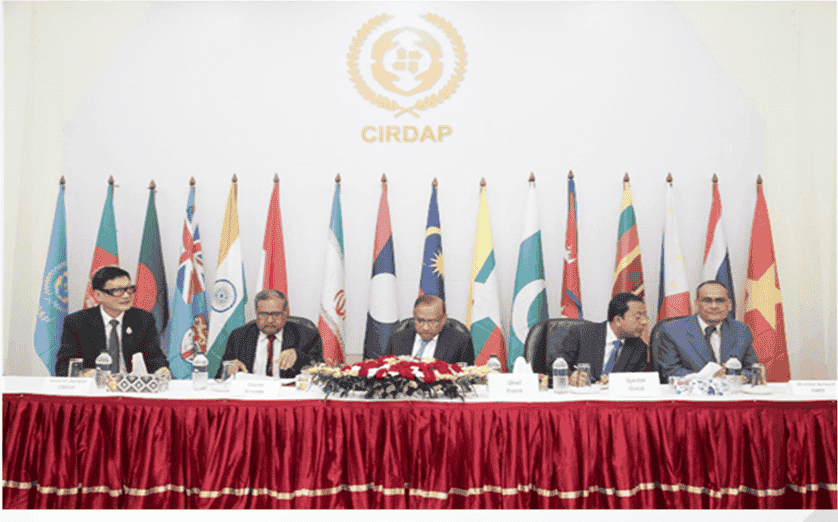
AARDO-UNZA, Online Training Programme on “Modern Concepts in Plant Diseases and Pest Management for Enhancing Quality and Productivity”
11 - 14 October 2022
AARDO, in collaboration with the University of Zambia (UNZA) has organised above titled online training programme, which aimed at contributing towards the attainment of SDGs, especially the one’s pertaining to food security, poverty reduction, and provision of sustainable livelihood especially in rural areas, by building human capacity for execution of agricultural program among communities.
The inauguration of the programme was virtually held on 11th October 2022. The programme coordinator Dr. Joyce Mufungwe, Ph.D, Lecturer and Researcher, UNZA, welcomed dignitaries and participants present during the inaugural session. The inaugural session started with welcome remarks and a brief introduction of the programme by the Acting Dean of the School of Agricultural Science, Prof Elias Kuntashula. The Guest of honour, Prof. Anne Lungowe Sikwibele, Vice Chancellor, UNZA orated his opening remarks and H.E. Dr. Manoj Nardeosingh, Secretary General, AARDO, delivered his inaugural address which enlightened the participants on the core theme of the programme. At the end of the session, Mr. Kamal Dhameja, Technical Officer, AARDO gave a vote of thankswhich was followed by a group photo session.
The programme was overwhelmingly attended by two hundred and one (201) participants in relevant fields from 24 member countries and 4 eligible member countries, namely, Algeria, Bangladesh, Burkina Faso, Egypt, Ethiopia, Gambia, Ghana, India, Iraq, Jordan, Kenya, Malaysia, Mauritius, Morocco, Namibia, Nigeria, Oman, Pakistan, Sri Lanka, Sudan, Syria, Taiwan, Tunisia, Zambia, Niger, Saudi Arabia, Somalia and Swaziland.
The prime objective of the programme was to sensitize participants to Identify the challenges associated with traditional methods of plant disease and pest management; recommend affordable, adaptable modern technologies and mitigation solutions for pests and plant diseases to reduce crop losses and suggest a model of an ecosystem-based strategy that focuses on long-term prevention of pests or their damage through a combination of techniques. In fulfilling the objectives of presentation on Modern concepts and approaches in insect pest management; the role of plant breeding in plant disease and pest management; Modern concepts and approaches in plant disease management were made by the renowned resource persons, during the technical sessions.
The programme successfully concluded on 14 October 2022 with valuable feedback from the participants. Dr. Paul Kachapulula, Head - Department of Plant Science, School of Agricultural Sciences, UNZA presented a summarized training report and narrated on the experience of UNZA in organizing the programme, followed by valedictory addresses by Dr. Sanjeeb K Behera, Head, IEC Division, AARDO. At the end of the programme, Dr. Joyce Mufungwe, Lecturer/Researcher, Department of Animal Science, School of Agricultural Sciences, UNZA gave a vote of thanks.
AARDO Liaison Committee: 79th Session
28 September 2022
The 79th Session of the Liaison Committee of African-Asian Rural Development Organization (AARDO) was held on 28 September 2022 at the Claridges Hotel, New Delhi, India. The session was held under the chairmanship of H.E. Mr Kwaku Asomah-Cheremeh, High Commissioner of Republic of Ghana to India, and Honourable Chairman of the Liaison Committee of AARDO. It was attended by twenty two (22) delegates from nineteen (19) member countries, namely, Bangladesh, Republic of China (Taiwan), Egypt, Ethiopia, Ghana, India, Jordan, Libya, Malaysia, Mauritius, Morocco, Namibia, Oman, Palestine, Pakistan, Sri Lanka, Sudan, Tunisia and Zambia. The International Cooperative Alliance – Asia and the Pacific (ICA –AP) attended the meeting as observer. H. E. Dr. Manoj Nardeosingh, Secretary General, AARDO attended the meeting as Member Secretary to the Liaison Committee and Mr. Rami Qtaishat, Assistant Secretary General, AARDO was equally present.
The Session commenced with the address of H.E. Dr. Manoj Nardeosingh, Secretary General, AARDO, who warmly welcomed the Chairman, two Vice Chairmen and other distinguished delegates to the 79th Session. It was followed by the address of H.E. Mr Kwaku Asomah-Cheremeh, High Commissioner of Republic of Ghana to India, and Honourable Chairman of the Liaison Committee of AARDO.
The quorum being complete, the Business Session started with the adoption of the Provisional Agenda and the Report of the 78th Session of Liaison Committee by the august House. Thereafter, the Liaison Committee was apprised of the follow-up actions taken/proposed to be taken by the AARDO Secretariat on the decisions/recommendations of the 78th Session of the Liaison Committee.
The Committee took note of the
review of AARDO activities relating to the Human Resource Development (HRD) Programmes, Development Pilot Projects and the six Regional Offices. The Committee was also informed about the status of Membership Contribution and initiatives taken by the AARDO Secretariat to strengthen the Member Relations and expand membership of AARDO for the period, January - July 2022. It equally took cognizance of the projected programmes of AARDO proposed to be organized from October 2022 to March 2023.
Moreover, the Committee decided to hold its next (80th) Session on 28th March 2023 and, approved a list of Special Invitees to attend therein, as Observers. During the meeting, several agenda items were presented using comprehensive audio visual power point presentations (ppt.)
On the sideline of the 79th Session of Liaison Committee and in the context of AARDO`s jubilee celebration, a Technology awareness and outreach event, in hybrid mode, was organised by AARDO at the same venue to create awareness and accelerate the transfer of affordable technology among AARDO member countries. In this ceremony, selected affordable technologies such as ground water level measuring device, treadle pump, oil extractor, soil organic carbon detection kit and taraltech water purifying device to eliminate water borne diseases and solar operated lantern were presented to interested member countries.
This event was a joint initiative of AARDO and the office of the Principal Scientific Office to Government of India. Same was attended, among others, by Ambassadors/High Commissioners and other delegates to the Liaison Committee, representatives from Ministry of External Affairs (MEA), Ministry of Rural Development (MoRD), Office of the Principal Scientific Adviser (PSA), and Rural Technology Action Group (RuTAG) and few Indian Institutes of Technology (IIT), Government of India. Besides, senior officials of AARDO’s nodal Ministries from Republic of Ghana, Republic of Namibia, Republic of the Sudan and Republic of Zambia attended the event online. Excellencies and senior diplomats from Embassies/High Commissions in New Delhi were handed over earmarked technological devices for onward transmission to their respective capitals. Dr (Mrs.) Parvinder Maini, Scientific Secretary, PSA, and Mr. Piyush Singh, Under Secretary, MEA equally addressed the gathering and encouraged more such initiatives.
The meeting ended with a concluding remark from H.E. Mr. Kwaku Asomah-Cheremeh, High Commissioner of the Republic of Ghana to India and Hon Chairman of the Liaison Committee which was followed by a group photo and a vote of thanks.
AARDO-ARC Online Training Program on “Application of Remote Sensing and GIS in Agriculture” (Arabic Language)
11 - 15 September 2022
In the era of information technology, GIS, space technology and land-based observation tools, Satellite-based optical and radar imagery are used widely in for timely crop production forecasts and drought assessment & monitoring of the crop field.
Considering the importance of the subject, AARDO and its Regional Office for North and East Africa in Cairo, in collaboration with the Soil, Water & Environment Research Institute (SWERI) of Agricultural Research Center (ARC), Egypt, organized an online international training program on “Application of Remote Sensing & GIS in Agriculture” during 11-15 September 2022, exclusively for Arabic speaking countries, with the main objective to understand remote sensing and GIS and their application in enhancing agricultural production.
The workshop was attended by ninety one (91) participants/experts from ten (10) member countries, namely, Iraq, Jordan, Morocco, Oman, Palestine, Sudan, Syria, Tunisia, Yemen and - the host country- Egypt besides two (2) perspective member countries, namely Algeria and Somalia.
The opening session of the program was held on 11th September 2022 and attended, among others, by H.E. Mr. Mohammad Osman, Undersecretary, Ministry of Social Solidarity, Government of the Arab Republic of Egypt, Major General Ahmed Anwar Abd Al-Aal, Director of Rural Development & Environment, Community of Sahel - Saharan States of Africa, Mr. Rami Qtaishat, Assistant Secretary General, AARDO and Mr. Mohamed Hassan Rashwan, Honorary Regional Representative of AARDO for North & Eastern Africa. After the dignitaries delivered their addresses, the session concluded with a vote of thanks by Mr. Mohd. Naimuddin, Program Coordinator, AARDO followed by group photo session.
In his address, H.E. Mr. Mohammad Osman, Undersecretary, Ministry of Social Solidarity, Government of the Arab Republic of Egypt thanked and appreciated AARDO, its regional offices and officials for their great efforts, under the leadership of H.E. the Secretary General Dr. Manoj Nardeosingh, for the betterment of the rural community in the member countries. He emphasized that AARDO’s HRD activities support member countries in achieving their developmental goals. Huge number of the officials from member countries in Africa and Asia benefited from AARDO programs.
The Assistant Secretary General, in his address, highlighted the importance of modern technology, especially remote sensing and GIS technology in agriculture for acquiring updated and accurate field data and taking on-time measures for getting enhanced and better yields. He mentioned that AARDO, in this regard, has evolved a sustainable ecosystem with a basket of innovative & disruptive technologies called Affordable Technologies Menu (ATM) for Agricultural and Rural Development. The ATM would facilitate sharing of ICT & technological solutions among AARDO member countries and other concerned stakeholders. He urged member countries to visit AARDO website and make use of AARDO services to get access and transfer available affordable technologies for the benefit of rural/agricultural communities.
During the five days technical sessions, experts/resource persons from Soil, Water & Environment Research Institute (SWERI) of Agricultural Research Center (ARC), Egypt discussed and highlighted the topics like introduction to remote sensing, its kinds and uses; Geographical Positioning (GPS) devices: geometric correction of satellite data; Wave and non-wave segmentation of space data; Tracking soil fertility using satellite data and geographical Information systems.
The valedictory session of the program was held on 15 September 2022, where the participants expressed appreciation for the program and their gratefulness to the organizers for organizing this important online training program in the Arabic language.
On this occasion, Mr. Mohammad Naimuddin, Program Coordinator, AARDO thanked the Director of Soil, Water & Environment Research Institute (SWERI) and Honorary Regional Representative of AARDO for North & Eastern Africa, and through them, the Government of Egypt for kind cooperation in organizing AARDO activities in the spirit of African-Asian Solidarity and south-south cooperation. He requested all participants to register as AARDO alumni and get connected with AARDO through its social networking accounts like LinkedIn and Facebook, and to visit AARDO’s website for updates on its programs. Mr. Mohamed Hassan Rashwan, Honorary Regional Representative of AARDO for North & Eastern Africa also thanked the Secretary General, Assistant Secretary General for their guidance and support in organizing such programs and thanked the participants for their active participation and experts for their contributions in making this program successful.
Delegation from Bahir Dar University, Ethiopia
5 September 2022
A delegation from Bahir Dar University from Federal Democratic Republic of Ethiopia, headed by Dr. Firew Tegegn, President of the University, visited the AARDO Secretariat on 5th September 2022 to discuss and explore possibilities of collaboration. Other members of the delegation were, Dr. Essey Kebede, Vice President, Dr. Belayneh Kassa, Vice Dean College of Business & Economics and Mr. Yibeltal Maru, ICT Director. Delegation was received by the Secretary General, Assistant Secretary General and senior officers. Presentations were made by AARDO and Head of the delegation. Delegation was also briefed about the participation from the Government of Ethiopia in Organization’s human resource development programmes and organizational meetings.
During the discussions it was agreed that University will consider organizing collaborative
programmes. Delegation will also pursue with the Ministry of Agriculture and Natural
Resources, Government of Ethiopia, AARDO's Nodal Ministry for their active participation from Ethiopia in all programmes of AARDO. Moreover, Ethiopia Institute of Agricultural
Research (EIAR) and Bahir Dar University could support in identification of need-based
technologies and its transfer to Ethiopia.H. E. the Secretary General presented a set of AARDO publications to the delegation.
Delegation from Mauritius visited AARDO Secretariat
27 August 2022
Delegation from Republic of Mauritius headed by Honourable Soomilduth Bholah, Minister of Industrial Development, SMEs and Cooperatives visited AARDO Secretariat on 27th August (Saturday) at 10:00 AM. The following dignitaries were part of the delegation:
- Mr. Jean Daniel Philipe Labonne
Deputy Permanent Secretary (SME Division)
- Mr. Ravin Rampersad
CEO, SME Mauritius
- Mr. Sanjeev Coonjobeeharry
Director, National Co-operative College
H.E. Dr. Manoj Nardeosingh and other senior officers received the delegation. H.E. the Secretary General briefed the delegation about ongoing activities of AARDO and their benefits for member countries, including Mauritius. Honourable Minister thanked AARDO for support provided, especially to the cooperative and SME sectors in Mauritius. Furthermore, matters such as identification of a Centre of Excellence in Mauritius, promotion of SMEs for fruit processing, fishermen cooperatives and appropriate transfer of technologies, etc. were also discussed. The Secretary General presented a set of publication and memento to the Honourable Minister.
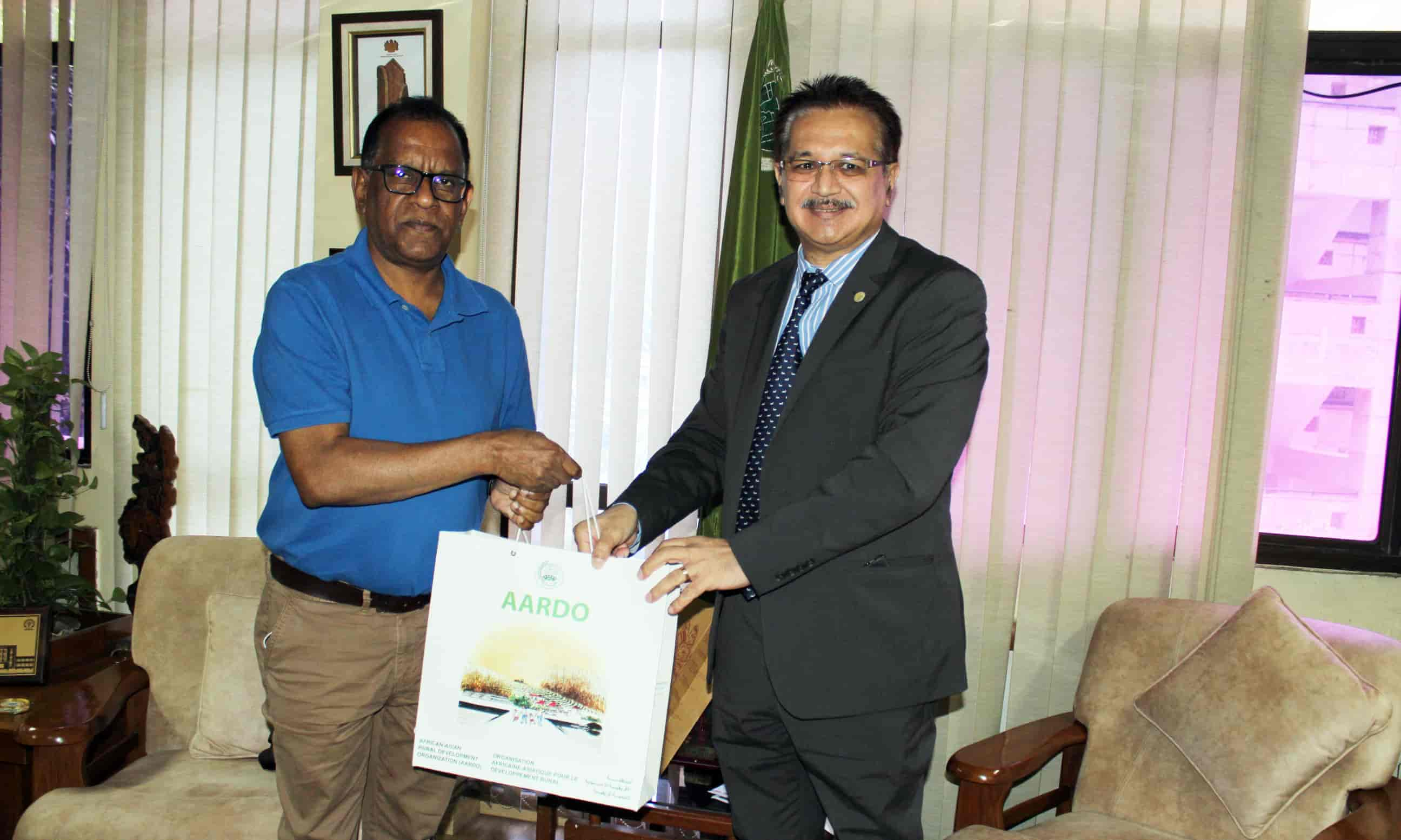
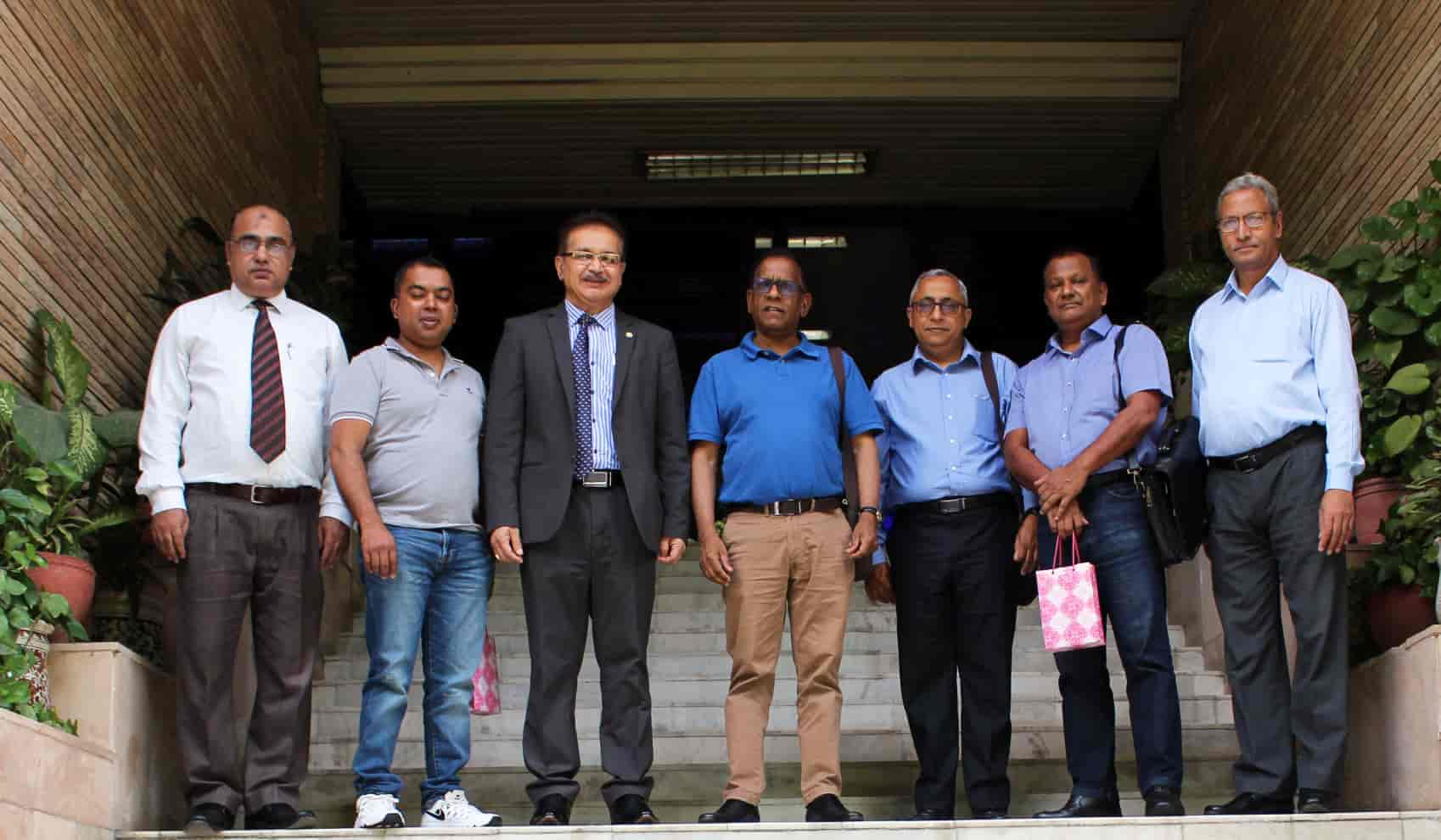
AARDO- College of Veterinary Medicine (CVM), University of Bahri Online Training Programme on “Climate Change Challenge: The Way Forward to Reinforcement of Livestock Systems in Developing Countries”
23 - 26 August
AARDO, in collaboration with the College of Veterinary Medicine (CVM), University of Bahri organized the above-titled online training programme for “Climate Change Challenge: The Way Forward to Reinforcement of Livestock Systems in Developing Countries”.
The inaugural session of the training programme began on 23 August 2022 with the welcome address by Dr. Mortada Elhassan, College of Veterinary Medicine (CVM), University of Bahri followed by the Introduction of the theme of the program by the Dr. Nabaa Kamal, Dean of the University. The presidential address was delivered by Dr. Yasir Osman, Cultural Relationship Manager, University of Bahri on behalf of the Dr. El Mamoun Haroun Osman Deputy Vice–Chancellor of the university. H.E. Dr. Manoj Nardeo Singh, Secretary General, AARDO and the honourable Chief Guest of the programme delivered his address and enlightened the participants on the core theme of the programme. During his address, Excellency emphasised on the urgent need for the adaptation of new methods to mitigate the detrimental effects of extreme climates in livestock. At the end of the session, Dr. Sanjeeb K Behera, Head, IEC Division, AARDO gave the vote of thanks followed by a group photo session.
The inaugural programme was attended by 160 participants in relevant fields from 25 member countries and 6 eligible countries, namely, Algeria, Bangladesh, Burkina Faso, Egypt, Ethiopia, Kingdom of Eswatini (Swaziland), Gambia, Ghana, India, Indonesia, Iraq, Jordan, Kenya, Malawi, Malaysia, Mauritius, Morocco, Nigeria, Oman, Pakistan, Palestine, Saudi Arabia, Sri Lanka, Sudan, ABS Sudan, Tanzania, Tunisia, Somalia, United States of America, Yemen, Zambia
The main objectives of this program are to identify the impact of climate change on livestock production systems in developing countries and recommend simple adaptation and mitigation solutions against climate variabilities. The programme was highly participatory and interactive. During these four days programme, the resource person sensitized the participants on variation of pastoral and rural livelihoods vulnerability across diverse agro-ecological ecosystems; assessing the dynamics of livestock productivity on livelihoods as a consequent impact of climate change; identifying the impact of climate change on livestock health and welfare; recognizing and the potential solutions and adaptation to mitigate climate change effects on livestock systems in developing countries.
The programme successfully concluded on 26th August 2022 with valuable feedback from the participants. Dr. Nabaak Kamal , Dean, College of Veterinary Medicine, University of Bahri, presented an overview of the programme. The valedictory address was delivered by Mr. Kamal Dhameja, Technical Officer, AARDO on behalf of Mr. Rami Qtaishat, Assistant Secretary General, AARDO.
AARDO-FERO International Online Training Programme on “Innovation for Sustainable and Resilient Agriculture: The Korean Experience”, FERO, R.O. Korea
22 - 25 August
The Far East Regional Office (FERO) of AARDO, since its establishment in 1973 at Seoul, Republic of Korea, has been effectively promoting the interest of AARDO by assisting in execution of its activities & programmes, dissemination of information and strengthening its network in the region. AARDO, in collaboration with FERO and Korea FAO Association, organized an International Online Training Programme on “Innovation for Sustainable and Resilient Agriculture: The Korean Experience” during 22-25 August 2022. The programme aimed at exposing and discussing best practices and innovative technologies to enhance knowledge and understanding of the participants on climate smart, resilient and sustainable agriculture in Korea.
The inauguration of the programme held on 22 August, was graced by Dr. Jun-won Lee, Chairman, Korea FAO Association & the Honorary Regional Representative of AARDO for the Far East Region and Mr. Rami Mahmoud Abdul Halim Al Qtaishat, Assistant Secretary General, AARDO.
This programme received an overwhelming response from the AARDO member countries and its centers of excellence. It was attended by 130 participants from 24 countries, namely, Bangladesh, Burkina Faso, Republic of China (Taiwan), Egypt, Eswatini, Ethiopia, Eritrea, Gambia, Ghana, India, Iraq, Jordan, Malaysia, Morocco, Niger, Nigeria, Pakistan, Philippines, Sri Lanka, Sudan, Syria, Tunisia, Yemen and Zambia.
During the course of deliberation, major four themes namely Agricultural Cooperatives & Relevant Policies; Smart Irrigation System in Korea; Affordable Appropriate Agricultural Technology & Practices; and Plant Protection and Seed Sector Policy in Korea were addressed by eminent resource persons/experts from various Institutions in Korea. The first lecture succinctly described the cooperative structure in Korea and its functions and also highlighted key policies and strategies. While the second lecture focussed on irrigation systems in Korea and its challenges. It also discussed the way forward to adapt appropriate irrigation technologies as per the local climatic conditions and issues of adaptation and replication. The third lecture highlighted appropriate agricultural technology and practices in Korea and how the agricultural sector evolved through various development stages to overcome challenges and adopt smart farming and climate smart practices for sustainable agricultural development. It also explained as to how the 4th Industrial Revolution has blurred the boundaries between the physical, digital, and biological worlds. The convergence of agriculture and smart technologies such as Artificial Intelligence (AI), Robotics, Internet of Things (IoT), 3D Printing, Genetic Engineering, Quantum Computing, Blockchains has brought numerous advantages to the Korean agriculture. The fourth and last lecture demonstrated the importance of seed sector in successful transformation of agriculture sector in Korea.
The programme has succeeded in highlighting innovative technologies, viable solutions and successful Korean practices and models that could be applied in AARDO member countries to overcome the impending challenges. The training programme successfully concluded on 25th August 2022 with the closing remarks by Ms. Hanna Kim, Manager, FERO and Dr. Khushnood Ali, Head, Research Division, AARDO; and with the positive feedback from the participants highlighting that AARDO member countries holds enormous potential to adapt and replicate successful Korean technologies and best practices for sustainable and resilient agriculture.
AARDO and CIFOR-ICRAF Online International E-webinar series of e-lecture
8 - 11 August
African-Asian Rural Development Organization (AARDO) organized Webinar Series of E-Lectures in collaboration with the Centre for International Forestry Research (CIFOR) and International Centre for Research in Agroforestry (ICRAF). “CIFOR-ICRAF” is a research institute uniting best minds to find nature-based solutions for forest and tree landscapes. CIFOR-ICRAF is working in over 40 countries, with over 700 staff members working in different projects, oldest and most globally recognized international research centres in their respective fields of agroforestry and forestry.
AARDO and CIFOR-ICRAF organized four E-Lectures under the captioned theme of “Role of Agro-Forestry in Poverty Reduction”, as per details given below:
- Enabling Smallholder to Produce and Consume more Nutritious Food through Agroforestry Systems by Dr Rajendra Chaudhary, Project Manager, Odisha Agro Forestry Project on 8th August 2022.
- Agroforestry for Nourishing Livelihoods and Landscapes by Dr Chandrashekhar Biradar, Chief of Party, Tree Outside India Program and Country Director on 9th August 2022
- Agroforestry: Regional Perspective and New Dimensions by Dr Shiv Dhyani, Country Coordinator India on 10th August 2022.
- Agroforestry: Global Perspective on Policies and Practices by Dr Javed Rizvi, Director, Asia Continental Program on 11th August 2022.
The objective of the E-lecture series was to promote the contribution of agroforestry in building of national economy and in fostering climate resilience through diversified land use and agricultural incomes, managing natural resources, meeting the demand for fuel, fodder and wood.
Numerous Policymakers and Officials from 11 countries, namely, Bangladesh, Burkina Faso, RO China (Taiwan), Ethiopia, Egypt, Gambia, Ghana, India, Malaysia, Nigeria, and Zambia attended the above lectures.
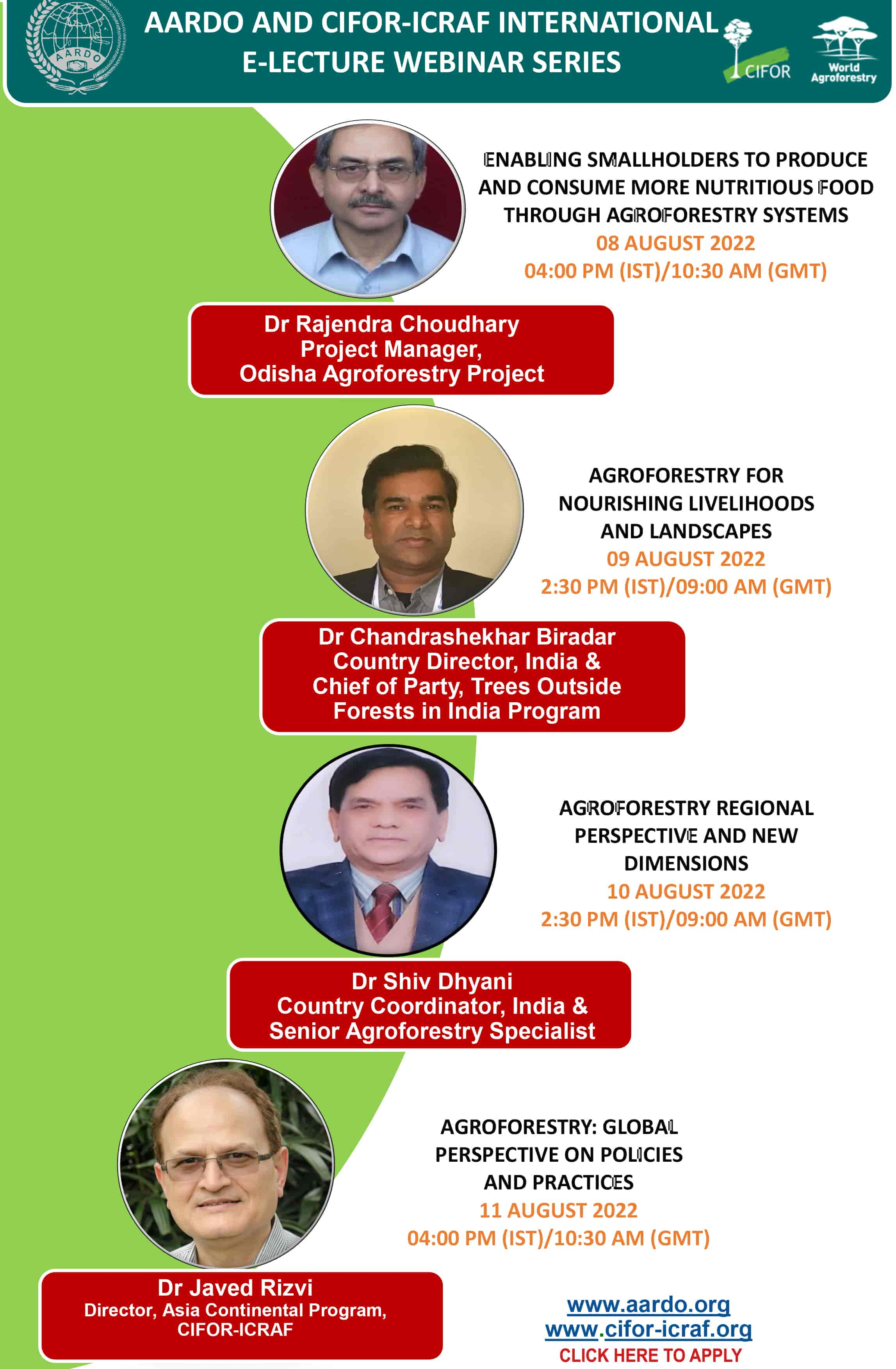
Post Graduate Diploma in Rural Development Management (PGDRDM) at National Institute of Rural Development & Panchayati Raj (NIRD-PR), Hyderabad, India
01 August 2022- 31 July 2023
NIRD-PR is an apex level autonomous rural development institution under the Ministry of Rural Development, Government of India. The institute conducts research, organizes trainings and provides consultancy services in the field of rural development.
AARDO, in collaboration with the Ministry of Rural Development, Government of India, has organized a fully residential One Year Post Graduate Diploma Programme in Rural Development Management (PGDRDM) at NIRD-PR at Hyderabad, India, for the session 01 August 2022 to 31 July 2023, under the additional contribution by the esteemed Government of India to AARDO. The programme aimed at creating committed and competent cadre of Rural Development professionals. While laying the theoretical foundations of rural development, the programme imparts management techniques to enhance the understanding of the paradigm and practices of rural development. Currently, four candidates, one each from Malawi, Namibia, Sudan and Zambia are attending the programme.
AARDO-School of Agriculture, University of Ghana, Online Training Programme on “Agri-Innovation and Technology Transfer for Sustainable Development, at School of Agriculture”
26 - 29 July
AARDO, in collaboration with the School of Agriculture (SOA), University of Ghana organised the above titled online training programme for intricate research commercialization and technology transfer with particular reference to agricultural science and technology-based innovations.
The inaugural session of the training programme began on 26th July 2022 with the welcome address by Prof. Irene S. Egyir Associate Professor & Dean, School of Agriculture, School of Agriculture, University of Ghana, followed by the inaugural address by the Chief Guest H.E. Dr. Manoj Nardeo Singh, Secretary General, AARDO.
The inaugural address was followed by the remarks of Mr. Raphael Adu-Gyan, Principal Development Planning Officer & Honorary Regional Representative of AARDO for West Africa, Ministry of Local Government and Rural Development, Ghana. At the end of the session, Dr. Sanjeeb K Behera, Head, IEC Division gave the vote of thanks followed by a group photo session.
While Prof. Irene S. Egyir introduced the University of Ghana and its School of Agriculture and the role being played by the SoA in transferring affordable technologies in the field of agricultural development in Africa and the objectives of the training programme, H.E. Dr. Manoj Nardeosingh highlighted the importance of technology in the context of rural and agricultural development and AARDO’s commitment to play the facilitator role in this endeavour.
The programme was attended by one hundred forty-five (145) participants in relevant fields from 21 member countries and 2 eligible member countries, namely, Bangladesh, Burkina Faso, R.O China (Taiwan), Egypt, Ethiopia, Gambia, Ghana, India, Jordan, Liberia, Malaysia, Mauritius, Namibia, Nigeria, Oman, Pakistan, Palestine, Philippine Sri Lanka, Sudan, Syria, Tunisia, Uganda and Zambia.
The broad objectives of the programme were to sensitize participants on the key steps in innovations, research commercialisation processes, research related to innovation activities and processes, and identifying opportunities for capturing value from research for transfer; procedures involved in protecting and managing Intellectual Property, through case studies and the legal framework (IPR) underpinning these rights; Industry perspectives on the value of higher degrees in agricultural science, career possibilities and pathways; and Understanding the commercialisation process and developing the skills to manage research and new product and service development. During the sessions, five (5) renowned resource persons delivered their presentations on the broad scope of agriculture (history of practices); The innovation process (from creativity to entrepreneurship); Agricultural research process and Commercialisation of Results; Illustrative examples of research results-the Africa region perspective and Technology Transfer and Intellectual property.
The programme successfully concluded on 29 July 2022 with valuable feedback from the participants. by Prof. Irene S. Egyir Associate Professor & Dean School of Agriculture, School of Agriculture, University of Ghana summarised the programme, followed by valedictory addresse of Dr. Sanjeeb K Behera, Head-IEC Division AARDO. At the end of the programme, Mr. Kamal Dhameja, Technical Officer gave a vote of thanks.

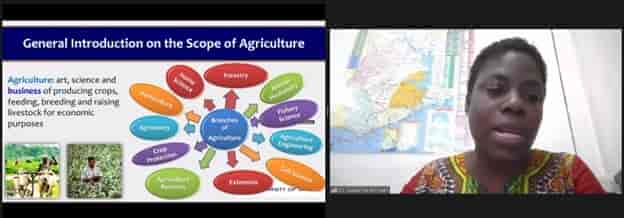
AARDO-IAV HASSAN II- CULTUR-NELGA, Online Training Programme on “Adaption of Optimized Water Resource Management for- Sustainable Development”
18 - 21 July
AARDO, in collaboration with the Agronomic and Veterinary Institute Hassan II NELGA and CALTUR, Morocco has organised above titled online training programme,
to interalia explore and analyse Integrated water resources management, Qualitative and quantitative hydrological modelling water security, and Building Information Modelling (BIM).
The inauguration of the programme was virtually held on 18th July 2022. The session started with welcome address by Prof. Moha El-Ayachi, Regional coordinator of NELGA, IAV Hassan II, Morocco, followed by Introduction on the theme of the e-training programme by Prof. Mohammed Amine El Ouariti, CEO of CULTUR. H.E. Dr. Manoj Nardeo Singh, Secretary General, AARDO, Chief Guest of the programme delivered his address and enlightened the participants on the core theme of the programme. At the end of the session, Mr. Kamal Dhameja, Technical Officer, IEC Division gave a vote of thanks followed by a group photo session.
The programme was overwhelmingly attended by Ninety One (91) participants in relevant fields from 19 member countries and 4 eligible member countries, namely, Burkina Faso, Egypt, Ethiopia, Ghana, India, Iraq, Jordan, Kenya, Mali Mauritius, Morocco, Niger, Nigeria, Oman, Pakistan, Palestine, Sri Lanka, Sudan, Syria, Tanzania, Tunisia, Uganda, Zambia.
The prime objective of the programme was to sensitize participants on Integrated Water Resources Management (IWRM) and the IWRM concept as applied in Morocco; Water Management through the lens of hydrological issues; Water use efficiency to optimize water allocation and water production; Application of Building Information Modelling (BIM) in agriculture; and Digital transformation in agriculture by using information and communication technology (ICT), that assists farmers in production management.
This one-week training programme was comprised of four technical sessions. During the sessions, five (5) renowned resource persons delivered their presentation on the aforesaid thematic areas and had technical discussion and elucidation with the participants.
The programme successfully concluded on 21 July 2022 with valuable feedback from the participants. Prof. Mohammed Amine El Ouariti, CEO of CULTUR summarised the programme, followed by valedictory addresses by Prof. Moha El-Ayachi, Regional coordinator of NELGA, IAV Hassan II, Morocco and Dr. Sanjeeb K Behera, Head-IEC Division AARDO. At the end of the programme, Mr. Kamal Dhameja, Technical Officer gave a the vote of thanks.
AARDO-Indian Institute of Management Kozhikode (IIMK) Online International Training Programme on “Social Innovation for Rural Development”
29 - 30 June, 4 - 7 & 11 - 12 July
The African-Asian Rural Development Organization (AARDO) and Indian Institute of Management Kozhikode (IIMK) jointly organized an online international training programme on the above-titled programme which focus on social enterprises and initiatives for livelihood issues encompassing agriculture, education and training, rural entrepreneurship and so on towards building a strong economic foundation for rural areas. It also covered the empowerment of women and backward groups – with a special focus on creating awareness of opportunities in their environments to bring social innovation for rural development.
The virtual inauguration of this international training program was held on 29th June 2022 with the welcome address of Prof. Surya Prakash Pati, Chairperson, Management Development Programme (MDP) & Faculty Development Program(FDP), IIM, Kozhikode. Thereafter Prof. Anubha Shekar Sinha, Associate Professor, IIMK and programme coordinator introduced the theme and objectives of the programme, followed by the Presidential Remarks by Prof. G. Sridhar, Dean, Executive Education, IIMK and address by Chief Guest Dr. Manoj Nardeosingh, Secretary General, AARDO. During his inaugural address, H E the Secretary General mentioned that Social Innovation has recently been seen as a promising solution to address the challenges of the rural areas. In rural areas, civil society usually plays a leading role in rural social innovation, which may be achieved through capacity building, knowledge sharing, replacing traditional technology used in agriculture production, livelihoods, health, and education. There was a dire need to motivate leaders to build innovative methodologies and comprehensive social innovation models to address the magnitude and complexities of issues in the rural landscape. The session concluded with a vote of thanks by Mr. Kamal Dhameja, Technical Officer, IEC Division, AARDO, followed by a group photo.
Earlier, speaking on the game-changing MoU signed between AARDO and IIM Kozhikode Prof. Debashis Chatterjee, Director IIM Kozhikode had added, “Coming together of these two institutions for the greater good of the common people has tremendous potential to make difference to the life of billions of people of two continents- Africa and Asia which are bound by similar legacies and aspire for a bright future. IIM Kozhikode seeks to contribute the Indian Management wisdom for solving ever-changing technological Meta trends, which will overwhelm the rural life and agriculture sector in the new world order, driven by the rising Asia and aspiring Africa by means of successfully implementing studied Sustainable Agriculture and Sustainable Rural Development practices.”
The programme was attended by sixty-three (63) participants, operating in relevant fields, from 26 AARDO member countries and 3 eligible member countries, namely, Algeria, Bangladesh, Burkina Faso, Egypt, Ethiopia, Gambia, Ghana, India, Jordan, Kenya, Lesotho, Liberia, Malawi, Malaysia, Mauritius, Morocco, Namibia, Nigeria, Oman, Pakistan, Palestine, Philippine, Sierra Leone, Sri Lanka, Sudan, Syria, Taiwan, Tunisia, and Zambia.
The course was designed broadly to cover aspects of rural development highlighting the institutions involved in rural development and their specific role and livelihood opportunities in rural areas – significant changes in the past few decades, etc. During these eight-day sessions, the resource persons interacted with the participants on themes like Rural development: An overview and challenges in the future; The Challenge of Transforming Agriculture in Developing Countries: A Public Policy Perspective Social Innovation in a Rural Enterprise: Generation of Livelihood; Tenets of Social Innovation: Exemplars from the world; Rural Marketing & Agribusiness; Financial aspects of Social innovations: Understanding how Impact Investment can help in rural development, Change leaders’ role in social innovation, etc. The programme had a participatory approach through country projects presented by the participants, where they highlighted challenges encountered for social innovation in their respective countries.
The Valedictory Session was held on 12th July 2022, and began with a glimpse of the eight days sessions by Prof. Anubha Shekar Sinha, Associate Professor, IIMK and programme coordinator. She also extended her thanks to AARDO, resource persons and participants. Dr. Sanjeeb K Behera, Head, IEC Division, AARDO in his closing remarks referred to several forms of social innovations in the context of rural and agricultural development and mentioned that despite limitations of time and space, IIM Kozhikode and Prof. Anubha in particular, beautifully crafted the online training programme and made this online training programme unique in by many ways. He also expressed his sincere thanks to the Dr. Manoj Nardeosingh, Secretary General, AARDO and Prof. Debashis Chatterjee Banerjee, Director, IIMK for considering organising such an important training programme. He also thanked Prof. Anubha Shekher Sinha for her innovative approaches to the training programme and made it a real success. On behalf of AARDO, Mr. Kamal Dhameja, Technical Officer, IEC Division also gave the vote of thanks wherein he expressed his gratitude to the Secretary, General, AARDO, Director, IIMK, Programme coordinator for their kind guidance and support in organizing the programme, and also thanked the learned resource persons for their presentation and lively interaction with the participants during the technical sessions. Besides, hHe also extended his gratitude thanks to the staff of MDP office IIMK and AARDO team members, who were involved during the programme for their tireless efforts behind the screen to make this programme a grand success.
The programme ended with feedback from the participants.
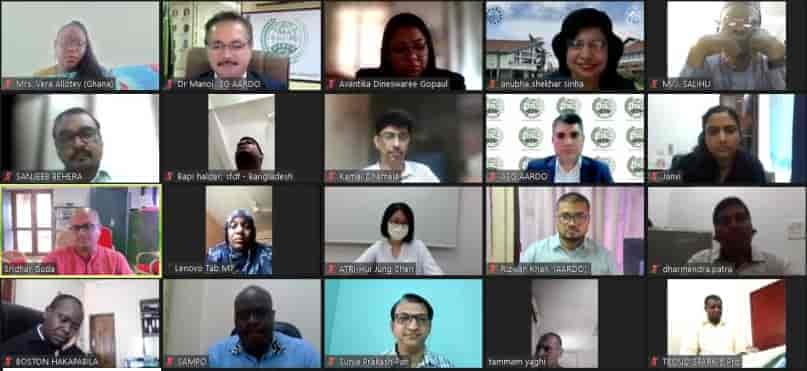
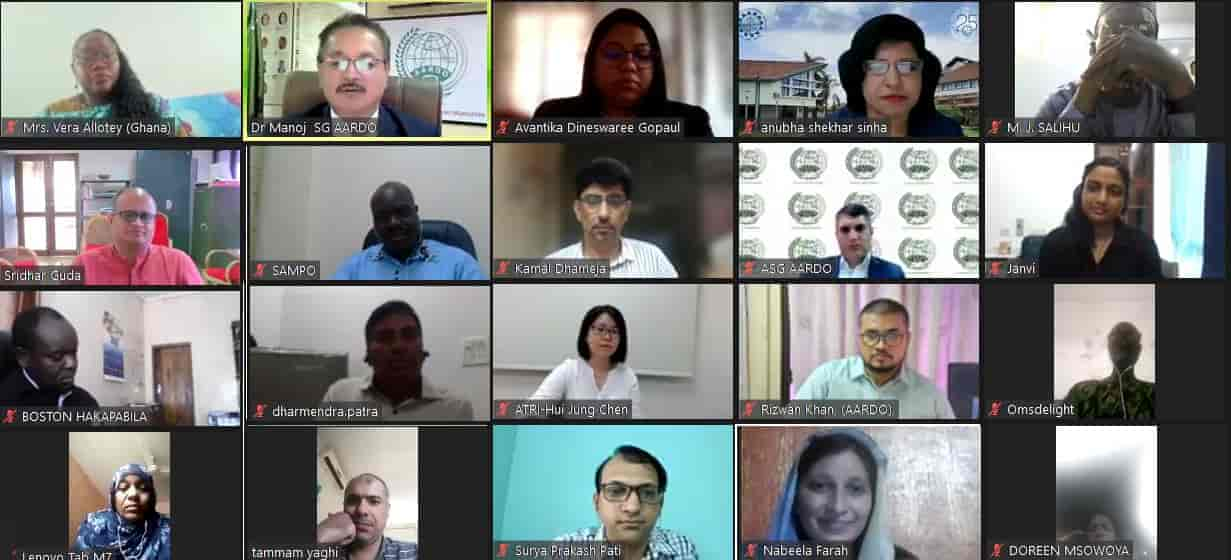
AARDO-EICA Online Regional Workshop on “Rooftop (Soilless) Farming as Income Generating Projects (Arabic Language)”
5 - 9 June
The challenges facing soil-based agriculture have led to the invention of soilless agriculture. The soil-less farming may change the face of agriculture by providing a more sustainable and productive alternative to traditional cultivation. The main advantages of soilless over traditional cultivation systems consist in that nutrients, oxygen and water required for healthy plant growth are better controlled, and that soil-borne diseases can be prevented, generally resulting in increased yield and high quality.
In traditional farming practice, the soil is the most common growing media used for growing crops throughout the world as it provides adequate support, nutrition, air, and water required for optimum growth of the plants. However, soils are posing some serious limitations mainly in safe food production due to the presence of soil-borne diseases, nematodes, drainage and other factors.
Furthermore, fertile soil is disappearing fast because of climate change and intensive farming, just as the world needs to feed more people. Growing enough food to feed the world’s population comes with an environmental price tag. Traditional farming practices can use too much water, cause deforestation and soil erosion and lead to pesticide overuse. Rooftop farming is being more and more recognized as a partial solution to rapid urbanization also.
Considering the importance of the subject, AARDO, in collaboration with its Regional Office for North and Eastern Africa and the Egyptian International Centre for Agriculture (EICA), Cairo, Egypt organized an online regional workshop titled “Rooftop (Soilless) Farming as Income Generating Projects”, during 5 – 9 June 2022, exclusively for Arabic speaking countries. This workshop focused on the importance of soilless farming for safe and free of pesticides food; Achieving self-sufficiency in vegetables, fruits, medicinal and aromatic plants; Increasing efficiency of water uses; Optimum utilization of available space and intensification of agriculture; Overcoming the problems faced in traditional agriculture of planting in the soil, such as nematode diseases and bacteria; and Providing job opportunities for youth.
The workshop was attended by fifty four (54) participants/experts from six (6) AARDO member countries, namely, Jordan, Morocco, Oman, Sudan, Tunisia, and the host country-Egypt and one (1) eligible member country, namely, Algeria.
The opening session of the workshop was held on 5 June 2022 with the welcome note of Mr. Mohamed Hassan Rashwan, Honorary Regional Representative of AARDO for North & Eastern Africa, followed by the inaugural address of Mr. Rami Qtaishat, Assistant Secretary General, AARDO, and speech of Prof. Dr. Hani Sabri, Director General, Egyptian International Centre for Agriculture (EICA), Cairo. Mr. Mohammad Naimuddin, Translation Officer (Arabic) and coordinator of the program from AARDO offered the vote of Thanks during the opening session.
In his inaugural address, the Assistant Secretary General highlighted the importance and need for rooftop (soilless) farming for increasing food production in the context of population growth and feeding them with healthy and nutritional food. Traditional farming practices can use too much water, cause deforestation and soil erosion, and lead to pesticide overuse. Rooftop farming is a partial solution to rapid urbanization also. Further, he mentioned the basket of innovative & disruptive technologies, which have been parked online under different verticals in the Affordable Technologies Menu (ATM) on the website of the Organization.
During the technical sessions of the workshop, experts/resource persons from the Egyptian International Centre for Agriculture (EICA) and other institutes in Egypt, covered pertinent issues related to the workshop subject, which interalia included topics like introduction of soilless farming, its basics and importance; climate changes and its impact on the soilless farming; irrigation and fertility and nutritional solution; shortage of nutrition (reasons and remediation); and economies of soilless farming (economic evaluation).
The valedictory session of the workshop was held on 9 June 2022, which was addressed by Prof. Dr. Hani Sabri, Director General, Egyptian International Centre for Agriculture (EICA), Cairo, Mr. Mohamed Hassan Rashwan, Honorary Regional Representative of AARDO for North & Eastern Africa and Mr. Mohammad Naimuddin, Translation Officer (Arabic) and coordinator of the program from AARDO. On this occasion, several participants also expressed their appreciation for the program, and its important contents and expressed their gratefulness to AARDO, its Regional Office located at Cairo and EICA for organizing this important online training workshop in the Arabic language.
AARDO-NI-MSME Online International Training Programme on
“Revival of MSMEs after Pandemic”
30 May – 03 June
African Asian Rural Development Organization (AARDO) and National Institute for Micro Small and Medium Enterprises (ni-msme) jointly organized an online international training programme on “Revival of MSMEs after Pandemic” for capacity enhancement through sharing of experiences, transfer of knowledge and viable technological solutions to help the AARDO member countries overcome the existing and impending challenges and revive their MSMEs after the Pandemic.
The programme was virtually inaugurated by H. E. Dr. Manoj Nardeosingh, Secretary General, AARDO following the opening remarks and briefing on the programme by Dr K V Reddy, Programme Director and Rector, National Institute for Micro Small and Medium Enterprises (ni-msme), Hyderabad on 30th May 2022. Appreciating the participants for their keen interest, the Secretary General hoped that they would take the learning of the programme to help their respective countries revive MSMEs after pandemic.
The COVID-19 crisis has been having ripple effects on economies and affected enterprises. Micro, small and medium enterprises which play a major role in emerging economies are amongst the hardest hit. The unprecedented outbreak of COVID-19 brought misery to all the sectors, including micro, small and medium enterprises. The untried lockdown undersized the business activities of the MSMEs sector and mounted adverse shocks in the form of non-procurement of raw materials, reduced production and supply of final products, and non-availability of employees to work in the process of production. The consequences were wide and open, like loss of employment, reduction in revenue generation, declined sales and a cut back in the income of the working class.
The impact of pandemic was widespread and observed in shutting down of operations in 70% of the MSMEs, reduction of 20-5% in their earnings, loss of 66% in their profitability, shortage of raw materials, delayed payments and loss of orders and millions of jobs. This training programme on “Revival of MSMEs after Pandemic” focused on the policies implemented and the mitigation process adopted in different developing economies in the African Asian region to sustain and amplify the growth of MSMEs during and after pandemic.
The programme consisted of five technical sessions, in which, eight lectures were delivered by eminent resource persons/experts of ni-msme who shared their valuable experiences and interacted with participants. The presentations given by resource persons were mainly focused on ‘Impact of pandemic on MSMEs in Developing Countries’; ‘Financial support and credit incentives for MSMEs’; ‘COVID-19 Relief for MSMEs sector by governments’; ‘Technology support to mitigate the crisis’; ‘Skill development to support the manufacturing of products aligned to pandemic’; ‘Global strategies for Revival of MSMEs’; and ‘Strategies for new market orders. A session of the programme was dedicated to the presentations by participants in which they shared experiences of their respective countries.
The programme was attended by 47 participants from 15 countries, namely, Bangladesh, Burkina Faso, RO China (Taiwan), Egypt, Gambia, Ghana, Jordan, Morocco, Nigeria, Pakistan, Sri Lanka, Sudan, Tunisia, and Yemen, and also from Myanmar representing CIRDAP respectively for their virtual presence in this programme.
The programme successfully concluded on 3rd June 2022 following the valedictory remarks by Dr Glory Swarupa, Director General, ni-msme. Following positive feedback by the evaluation was made by the Programme Director and Programme Coordinator respectively.
AARDO-NI-MSME Online International Training Programme on
“Strategies to Mitigate Challenges of Entrepreneurs”
23 - 27 May 2022
African Asian Rural Development Organization (AARDO) and National Institute for Micro Small and Medium Enterprises (ni-msme) jointly organized an online international training programme on “Strategies to Mitigate Challenges of Entrepreneurs” for capacity enhancement through sharing of experiences transfer of knowledge and viable technological solutions to help the member countries overcome the existing and impending challenges in the African-Asian region.
The programme was virtually inaugurated by H. E. Dr. Manoj Nardeosingh, Secretary General, AARDO following the special remarks by Dr S Glory Swarupa, Director General, National Institute for Micro Small and Medium Enterprises (ni-msme), Hyderabad on 23rd May 2022. The Secretary General appreciated the participants for their keen interest and hoped that they would take the learning from the programme to help MSMEs move out of present precarious conditions in their respective countries. The MSME sector has been hit hard by the Covid-19 pandemic and need to be recuperated and expanded to give impetus to the economies and create employment opportunities to cater to the upcoming demand.
The programme was attended by fifty (50) government functionaries and entrepreneurs from eighteen (18) countries, namely, Bangladesh, Burkina Faso, Republic of China (Taiwan), Ethiopia, Egypt, Gambia, Ghana, Jordan, Morocco, Myanmar, Nigeria, Pakistan, Palestine, Sri Lanka, Sudan, Tunisia, Turkey and Zambia.
The programme consisted of five technical session, in which, ten eminent experts and guest speakers from ni-msme and some leading organizations/institutions delivered lectures, shared their valuable experiences. Their presentations were mainly focused on ‘Operations of Micro and Small Enterprises’, ‘Analysis of Business Operations and Designing Corrective Measures’, ‘Issues and Challenges of Prospective & Practicing Entrepreneurs’, ‘Business Mentor for Start-ups’, ‘MSME Schemes – Innovation’, ‘Technology Up-gradation, Quality Improvement &Marketing Assistance’, ‘Waste Management’, ‘Reduce, Reuse & Recycle’, ‘Innovative Marketing Strategies for Micro and Small Enterprises’, ‘Quality Management Tools’, ‘5s, Kaizen and Lean’, ‘Crisis Management & Exit Strategy for Small Businesses’, and ‘Emerging Business Opportunities in e-commerce’.
The programme successfully concluded on 27th May 2022 with positive feedback from the participants. Mr. Rami Qtaishat, Assistant Secretary General, AARDO delivered his valedictory remarks following an overall evaluation and remarks by Programme Director and Programme Coordinator respectively.
AARDO-EICA Online Regional Workshop on “The Role of Cooperatives in Supporting Small Projects (Arabic Language)”,Egyptian International Centre for Agriculture (EICA), Cairo, Egypt
15 - 19 May 2022
Cooperatives play an important role in reducing poverty. All cooperatives, social or economic, ensure the growth and prosperity of the communities. In developing countries, where there is often a lack of access to capital, education, and training, cooperative structures allow communities to pool together their resources to solve problems, identify common goals and target the causes and symptoms of poverty.
Cooperative societies have not only contributed to the development of small-scale businesses but are in themselves small-scale businesses. Cooperatives have always promoted small business development through entrepreneurial development, funding, provision of entrepreneurship, promotion of the establishment of small-scale industries, promotion of smallholder agriculture, etc.
Considering the importance of the subject, AARDO, in collaboration with its regional office for North and Eastern Africa and the Egyptian International Centre for Agriculture (EICA), Cairo, Egypt organized an online regional workshop titled “The Role of Cooperatives in Supporting Small Projects” during 15-19 May 2022, specially for Arabic speaking countries. This workshop reviewed the role of cooperatives in providing sources of financing for small projects, highlighted the role of cooperatives in providing job opportunities, the contribution of cooperatives in the marketing of small projects, and accelerating rural development through agricultural cooperatives, etc.
The workshop was attended by eighty-three (83) participants/experts from seven (7) AARDO member countries, namely, Jordan, Lebanon, Libya, Palestine, Sudan, Tunisia, and the host country-Egypt and one (1) eligible member country, namely, Algeria.
The opening session of the workshop was held on 15 May 2022, which began with the welcoming remarks by Mr. Mohamed Hassan Rashwan, Honorary Regional Representative of AARDO for North & Eastern Africa, followed by the address of Prof. Dr. Hani Sabri, Director General, Egyptian International Centre for Agriculture (EICA), Cairo and the opening address of Mr. Rami Qtaishat, Assistant Secretary General, AARDO. The Assistant Secretary General, in his address, highlighted the important role of the cooperatives in reducing poverty in general, and in the development of small projects by providing support in funding, entrepreneurship development, and marketing. He also referred to AARDO’s efforts to develop networking among rural and agricultural development institutions, universities, research organizations and centers of excellence and creation of knowledge centers and consortiums in the African-Asian region for rural development management, research, and consultancy with a special focus on new and emerging technologies in the field of rural and agricultural development. He emphasized the basket of innovative & disruptive technologies, which have been parked online under different verticals in the Affordable Technologies Menu (ATM) in the website of the Organization.
During the technical sessions of the workshop, experts/resource persons from the Egyptian International Centre for Agriculture (EICA) and other institutes in Egypt, covered pertinent issues related to the workshop subject, including: current condition of cooperatives and its role in fulfilling future need; role of cooperatives in achieving food security and social justice; obstacles for agricultural cooperatives in Egypt; role of cooperatives in supporting small projects and achieving sustainable development; and role of cooperatives in framing post-covid strategies.
The valedictory session of the workshop was held on 19 May 2022, wherein Prof. Dr. Hani Sabri, Director General, Egyptian International Centre for Agriculture (EICA), Cairo gave concluding remarks and expressed his thanks and appreciation for AARDO and its regional office for cooperating and coordinating with the center for AARDO activities. Mr. Mohamed Hassan Rashwan, Honorary Regional Representative of AARDO for North & Eastern Africa, in his concluding remarks, thanked the Secretary General and the AARDO Secretariat for the guidance and support for conducting the capacity building programs, including this important workshop on “Role of Cooperatives in Supporting Small projects” organized in collaboration with EICA for the larger benefit of AARDO member countries. On this occasion, on behalf of AARDO, Mr. Mohammad Naimuddin, Translation Officer (Arabic) and coordinator of the program from AARDO, extended sincere thanks and gratitude to the Director General of the Egyptian International Center for Agriculture (EICA), faculty members, resource persons/experts, Honorary Regional Representative of AARDO for North & Eastern Africa and all the participants for their contributions and active participation in making the workshop successful. Emphasizing the need for and importance of networking in the context of changing global scenario, he urged the participants to keep in touch through virtual platforms and share successful experiences and innovative strategies of their respective countries for the greater benefit of AARDO member countries. He further requested all participants to register themselves as AARDO alumni, for which a link had been created on the website of the organization (https://aardo.org/Alumini.php). During the session, several participants also expressed their appreciation for the program, its important contents and expressed their gratefulness to AARDO, its regional office and EICA for organizing this important online training workshop in Arabic language.
Online International Training Programme on "Extension Management Strategy for Fishpreneurship”, at ICAR-CIFT, Kochi, India
09-12 May 2022
AARDO, in collaboration with the ICAR-Central Institute of Fisheries Technology (CIFT), organized an online International Training Programme on " Extension Management Strategy for Fishpreneurship”, at ICAR-CIFT, Kochi, India between 09-12 May 2022 to share the different strategies and approaches relevant to the title of the programme, which included fishing, fish processing, aquaculture development, developing products from fish waste, seafood safety and quality standards, engineering application in fisheries, novel extension techniques, entrepreneurship development, agri-business incubation practices, value chain management, gender in fisheries, labour issues and new marketing approaches for fish and fishery products with the participants of AARDO member countries.
The virtual inauguration of this international training program was held on 09th May 2022 with the welcome notes of Dr. S. Ashaletha, Principal Scientist & Course Coordinator, EIS Division, ICAR-CIFT, Cochin and Dr. A.K. Mohanty, Head, EIS Division & Course Director, ICAR-CIFT, Cochin gave highlights of the programme, followed by the Presidential Remarks by Dr. Leela Edwin, Director (Acting), ICAR-CIFT, Cochin and address by Chief Guest Dr. Manoj Nardeosingh, Secretary General, AARDO, New Delhi. During the inaugural session H E the Secretary General, in his address, mentioned that “well-structured fisheries supply chains, usually attributed to efficient production practices, post-harvest management, market access, effective institutional arrangements and good governance, is indeed the cry of the day and the present programme has been professionally designed to provide useful insights and viable practical solutions for the development of fispreneurship which is assuming a new dimension after covid and with potential development”. The session was concluded with a vote of thanks by Dr. Sajeev M.V., Senior Scientist & Course Coordinator, EIS Division, ICAR-CIFT, Cochin on behalf of the ICAR-CIFT.
The programme was attended by fifty-five (55) participants, working in relevant fields, from 17 AARDO member countries, namely, Egypt, India, Kenya, Liberia, Malawi, Malaysia, Mauritius, Morocco, Nigeria, Oman, Pakistan, Sri Lanka, Sudan, Syria, Taiwan, Tunisia, Zambia, besides two eligible member countries namely Guinea and Myanmar
.
The broad objectives of the programme were acquainting the development personnel/ extension workers/ researchers working in the fisheries entrepreneurship development sector with a cafeteria of technologies available in the fisheries sector; imparting skill-based knowledge and sharing experience of successful entrepreneurs/start-ups so as to decipher the business opportunities for rural development in Afro-Asian countries, and effectively utilize ICTs for sharing of knowledge and impart training among Afro-Asian nations for shared growth and development in the fishery entrepreneurship.
During these four days programme, the resource person sensitised the participants on developing entrepreneurship in the fishery: Scopes and opportunities; Technologies of ICAR- CIFT for sustainable livelihood security; Micro-entrepreneurship development through value addition and processing of fish; Linking producer to consumer in fishery through visible value chain; Vertical coordination of small farms with exporters and processors; Agribusiness in fishery and role of women; Consumer behaviour analysis for fish-based enterprises.; Improved fish marketing system; Business opportunity, product identification and market survey; Quality management in agribusiness; and Business Plan development. ,
The Valedictory Session was held on 12 May 2022, wherein Dr. S. Ashaletha, Principal Scientist & Course Coordinator, EIS Division, ICAR-CIFT, Cochin, gave a glimpse of the four days sessions and also extend thanks to AARDO, resource persons and participants. Dr. A.K. Mohanty, Principal Coordinator of the program from CIFT also expressed his thanks to the Secretary General, AARDO, New Delhi for considering organizing training programme in collaboration with CIFT. He also thanked Dr. Leela Edwin, Director (Acting), ICAR-CIFT, Cochin, as with her guidance and support the programme was made successful. On behalf of AARDO, Dr Sanjeeb K Behera, Head, IEC Division, in his concluding remarks thanked the CIFT Director, Course Director and Principal Coordinator, and learned resource persons for their presentation and lively interaction with the participants during the technical sessions. In response to the queries from the participants, he further mentioned that under the Development Pilot projects, participants may submit their proposals through the nodal ministries in their respective countries for transferring technologies/development projects. Besides, He also extended his thanks to Mr. Chandrasekhar of CIFT, and Mr. Kamal Dhameja, Technical Officer of AARDO and others from both AARDO and CIFT, who were involved during the programme for their tireless efforts behind the screen to make this program a grand success. A Vote of Thanks was given by Dr. Chandrasekhar V., Senior Scientist & Course Coordinator, EIS Division, ICAR-CIFT, Cochin
The programme ended with a photo session of all participants.
AARDO-IIMK Sign MoU to Promote Sustainable Agriculture And Rural Development among AARDO Member countries
28 April 2022
A Memorandum of Understanding (MoU) was signed between His Excellency Dr. Manoj Nardeosingh, Secretary General, African Asian Rural Development Organisation (AARDO) and Prof. Debashis Chatterjee, Director, Indian Institute of Management Kozhikode at AARDO Secretariat, New Delhi, India on 28th April 2022.
The MoU, considering the mutual interest in agriculture and sustainable rural development in AARDO Member Countries, seeks that both the Organizations will cooperate and collaborate with each other to achieve common objectives, in particular with regard to addressing the challenges in agriculture and sustainable rural development; through research, publication, consultancy and advisory. Impetus will also be given to advance new knowledge and its sharing, innovative solutions, interventions and capacity enhancement to benefit and strengthen rural communities of AARDO member countries.
H.E Dr. Nardeosingh added, “I am happy with the signing of this MoU with IIM Kozhikode. It will now bring regular interaction between the officials of member countries and the learned faculty members of IIMK through different technical programmes, which would leverage on better management and leadership skills towards addressing the contemporary issues and impending challenges, in rural areas of AARDO member countries. AARDO would immensely benefit from the advanced scientific management methodology and tools to directly and indirectly impact upon and improve the life of rural communities.”
Expressing happiness on the growing global footprints and international collaborations that IIM Kozhikode has been pioneering for an Indian B-School, Prof. Chatterjee added, “Coming together of these two institutions for the greater good of the common people has tremendous potential to make difference to the life of billions of people of two continents- Africa and Asia which are bound by similar legacies and aspire for a bright future. IIM Kozhikode seeks to contribute the Indian Management wisdom for solving ever-changing technological Meta trends, which will overwhelm the rural life and agriculture sector in the new world order, driven by the rising Asia and aspiring Africa by means of successfully implementing studied Sustainable Agriculture and Sustainable Rural Development practices.”
The MoU also endeavours to recognise the need for enhancing self-reliance, economic resilience and social well-being of the people through ensuring sustainable livelihoods, improved quality of life and healthy environment in the Member Countries. It also has a provision to act as forum to facilitate exchange of views and ideas for continuing dialogues on South-South and Triangular model of Cooperation for agricultural and rural development. Knowledge support and managerial professional development in the areas of fisheries, energy, livestock, sericulture, aquaculture, transportation, sustainable agriculture, rural settlement food processing & value-addition, water & waste management, diffusion and transfer models/channels for effective adoption of innovative, affordable and appropriate management practices are also part of this landmark MoU.
AARDO and IIMK will endeavour to organise international, regional online training programmes /in-country training programmes/workshops/seminars to strengthen the institutional capacity of the Member Countries. They will also jointly conduct research, implement development projects exchange experts/specialists, create exchange programmes with Universities/Institutes in member countries and provide technical support in project formulations and consultancy, for success of mainly developing countries in the Asian-African region coming under the umbrella of AARDO.
Visit of SG to IIT Kharagpur
11 April 2022
The Secretary General, AARDO along with one of his senior officers visited the Indian Institute of Technology, Kharagpur on 11th April 2022 for the official signing ceremony of the MoU between the two institutions and for discussions about its implementation and new avenues of cooperation.
The Indian Institute of Technology Kharagpur (IITKGP) is a premier institute of the country established in 1951 to train engineers and researchers. It is the first IIT that was created by the Government of India and has been recognized as an institute of national importance. It offers bachelors, masters and doctoral degrees in various areas under different departments, centres, and schools. Among the 23 IITs, IIT Kharagpur has the sole distinction of having an Agricultural and Food Engineering (AgFE) Department and Centre for Rural Development, Innovation and Sustainable Technologies (CRDIST). The Department is adequately experienced in the creation and dissemination of appropriate rural technologies, through its recent flagship initiatives. Rural Technology Action Group (RuTAG) and Design and Innovation Centre (DIC) are platforms that have successfully translated research ideas into meaningful prototypes that address agricultural and rural issues. The AgFE Department has been developing and transferring technologies and facilities that are directly or indirectly helping rural communities.
A Memorandum of Understanding (MoU) was entered between the African-Asian Rural Development Organization and the Indian Institute of Technology Kharagpur on 11 April 2022 to cooperate and collaborate with a view to achieving common objectives with regard to addressing the challenges in the field of agriculture and rural development through technological innovations, solutions, interventions and capacity enhancement to benefit and strengthen rural societies. The established cordial ties and strengthened cooperation between the two organizations will greatly benefit rural communities, farmers, entrepreneurs, executives, functionaries and policymakers of AARDO member countries in Africa and Asia.
During this visit, the Secretary General visited different laboratories of the Agricultures and Food Engineering Department and hold discussions with the faculty members of the department on possible areas of collaboration, besides the modalities of admission of students/officers from member countries to the M.S. Research programme of the Institute.
The Secretary General also visited the Centre for Rural Development, Innovation and Sustainable Technologies (CRDIST)Rural Technology Action Group (RuTAG) and Design and Innovation Centre (DIC) during this visit.
AARDO - MARDI Online International Training Programme on “Advancement in Livestock Reproduction Technologies”
21 - 31 March 2022
AARDO, in collaboration with Malaysian Agricultural Research and Development Institute (MARDI), organized an International Training Programme on “Advancement in Livestock Reproduction Technologies” (Online mode) for capacity enhancement through transfer of knowledge and innovative technological solutions for the development of livestock sector in the member countries in Africa and Asia.
The inauguration of the programme was virtually officiated by H. E. Dr. Manoj Nardeosingh, Secretary General, AARDO, following the opening remarks by Dr Asfaliza binti Ramli, Deputy Director General, (Development & Operations), Malaysian Agricultural Research and Development Institute (MARDI) on 21st March 2022.
The programme received an overwhelming response from twenty-three (23) member countries and was attended by one hundred eighteen (118) experts and functionaries from Bangladesh, Republic of China (Taiwan), Egypt, Ethiopia, Ghana, India, Iraq, Jordan, Kenya, Liberia, Malawi, Malaysia, Mauritius, Nigeria, Oman, Pakistan, Palestine, Sri Lanka, Sudan, Syria, Tunisia, Yemen and Zambia.
Livestock is important as a source of livelihood and for nutritional food security, especially for the rural population. The livestock sector accounts for about 40 percent of agricultural GDP, ranging between 30 - 80% in individual AARDO member countries. The performance of this sector is to be improved. The total livestock population was 4941.4 million in AARDO member countries (2017), representing 16.8% of the total livestock population in the world.
A few of the AARDO member countries namely, India, Pakistan, Bangladesh Malaysia, Nigeria, Sudan, and Tunisia have got higher livestock population though the entire region holds immense potential that needs to be tapped.
The sustainability of livestock establishment depends on the ability of the animals to reproduce. Hence, the high reproductive efficiency is a much sought-after trait in livestock sector. The need for faster rate of reproduction and better-quality animals have prompted new technologies in reproduction to be developed. These technologies, termed as Assisted Reproductive Technologies (ART), can help the industry to obtain more offspring with better quality in shorter time-span.
The program highlighted Malaysia's development of various livestock-assisted reproduction biotechnologies at its research institutions. The most common types of assisted reproduction biotechnology are in vivo gamete production (artificial insemination, multiple ovulations, and embryo transfer) and in vitro embryo production and manipulations (in vitro maturation, fertilization and culture; cryopreservation and sexing). The program also highlighted several aspects that are related or are enablers for successful usage of these technologies. The main important application of reproductive biotechnology in livestock is the rapid genetic improvement to increase meat and milk production. Another critical application of reproductive biotechnology is controlling infectious diseases caused by the movement of genetic resources, such as recent outbreaks of Foot and Mouth Disease (FMD) and Lumpy Skin Diseases (LSD). With this background, AARDO and MARDI organized an international training programme (Online) with the following objectives:
- To discuss developments in livestock-assisted reproductive biotechnology;
- To discuss new reproductive biotechnology technologies that can provide rapid genetic improvement to increase livestock production; and
- To share practical knowledge and experiences of African-Asian countries, as well as to build participants' capacity in reproductive bio-technology of livestock.
This interactive training programme, spread over two weeks, comprised 7 technical sessions and highlighted the Advancement in Livestock Reproduction Technologies in Malaysia. During the technical sessions, eminent experts of MARDI and guest speakers from a few renowned institutions delivered their lectures on ‘Livestock Production in Malaysia’, ‘Selection for Quality Genetic Resources’, ‘Enablers to Apply Reproductive Technologies’, ‘Overview of Reproductive Technologies’, ‘Male Reproduction’, ‘Female Reproduction’, and ‘Applications of Reproductive Technologies’. The experts shared their valuable experiences through presentations leveraged on reproductive biotechnology and discussed various aspects of livestock reproduction.
The training programme successfully concluded with positive feedback from the participants and evaluation by Programme Director followed by valedictory remarks by Programme Coordinator on 31st March 2022.
AARDO Liaison Committee: 78th Session
31 March 2022
The 78th Session of the Liaison Committee of African - Asian Rural Development Organization (AARDO) was held on 31st March 2022 at the Claridges Hotel, New Delhi, India. This session witnessed a change in office bearers of Liaison Committee. The Session commenced under the chairmanship of H.E. Dato Hidayat Abdul Hamid, High Commissioner of Malaysia to India and the Hon’ble Chairman of the Liaison Committee. After adoption of the Provisional Agenda, new Chairman of the Liaison Committee, Mr. Sebastian Beliwine, Deputy High Commissioner took over the charge of the chairmanship of Liaison Committee, on behalf of His Excellency, the High Commissioner of the Republic of Ghana, following the election of Republic of Ghana as the President of AARDO, during the 20th General Session of AARDO Conference, held in December 2021. Similarly, the representative of the esteemed Embassy of Arab Republic of Egypt and H.E. the High Commissioner of Malaysia assumed the offices of the Vice-Chairmen of Liaison Committee from Africa and Asia, respectively. The Secretary General and other distinguished delegates extended a warm welcome to the new Chairman and two Vice-Chairmen of the Liaison Committee.
The Session was attended by twenty nine (29) delegates from twenty one (21) member countries, namely, Republic of China (Taiwan), Egypt, Ethiopia, Ghana, India, Iraq, Kenya, Lebanon, Libya, Malaysia, Morocco, Namibia, Oman, Palestine, Pakistan, Sri Lanka, Sudan, Tunisia, Syria, Yemen and Zambia. H. E. Dr. Manoj Nardeosingh, Secretary General, AARDO attended the meeting as Member Secretary to the Liaison Committee.
The Session began with the address of H.E. Dr. Manoj Nardeosingh, Secretary General, AARDO, who warmly welcomed the chairman and other distinguished delegates to the 78th Session. It was followed by the address of H.E. Dato Hidayat Abdul Hamid, High Commissioner of Malaysia to India. The new Chairman of the 78th Session of the Liaison Committee also delivered his address after assuming the charge of the office of the Chairman. Mr Rami Mahmound Abdul Halim Qtaishat, new Assistant Secretary General, who joined AARDO Secretariat on 11 March 2022, also introduced himself to the Liaison Committee.
The quorum being complete, the Business Session started with the adoption of the Provisional Agenda and Summary Report of the 77th Session of Liaison Committee by the House. Thereafter, Liaison Committee was apprised of the follow-up actions taken/proposed to be taken by the AARDO Secretariat on the decisions/recommendations of the AARDO Conference: 20th General Session, 72nd, 73rd and 74th Sessions of the Executive Committee and the 77th Session of Liaison Committee.
The Committee equally took note of the
review of AARDO activities relating to the Human Resource Development (HRD) Programmes, Development Pilot Projects and the Regional Offices. The Committee was also informed about the status of Membership Contribution and initiatives taken by the AARDO Secretariat to strengthen the Member Relations and expand membership of AARDO for the period, July – December 2021. It equally took cognizance of the projected programmes of AARDO scheduled to be held from April to September 2022.
Moreover, the Committee decided to hold its next (79th) Session on 28th September 2022 and, accordingly approved a list of Special Invitees to attend therein, as Observers. Several agenda items were presented using comprehensive audio visual ppt. presentations.
During the Business Session, the AARDO Secretariat also organised its customary “Technology Exposure Session” which included presentations on
‘UPL- Sustainable Agriculture and Rural Technologies for African-Asian Countries’,
India Accelerated - Stage Startups Ecosystem and a potable water purifier technology - Taraltech reactor.
The meeting concluded with a note of thanks to the participating delegates.
Online International Training Programme on the Role of Innovative Primary Health Care (PHC) for Sustainable Development”, at IIT Madras, Chennai, India
22 - 25 March 2022
AARDO, in collaboration with the Indian Institute of Technology, Madras (IIT Madras), organized an online International Training Programme on above titled between 22-25 March 2022, for implementation of innovative primary health care (PHC) for sustainable development for achieving the uphill colossal tasks of SDGs, sustainable rural transformation and inclusive growth.
The virtual inauguration of this international training program was held on 22 March with the welcome address of Prof. Sudarsan Padmanabhan, Associate Professor, HSS, IIT Madras and an introduction of Office of Global Engagement and SIDDHI, IITM - AARDO Collaboration was given by Prof. Raghunathan Rengaswamy, Dean – Global Engagement, IIT Madras. Prof. V. R. Muraleedharan, Professor, HSS, IIT Madras introduced the theme of the e-training program. Dr. T.S. Selvavinayagam, Director of Public Health & Preventive Medicine, Govt. of Tamilnādu delivered his special remarks, followed by the Chief Guest's address of Dr. J. Radhakrishnan, IAS, Principal Secretary to Government, Health and Family Welfare Department, Govt. of Tamilnadu. H.E. Dr. Manoj Nardeosingh Secretary General, AARDO gave the Presidential address. The inaugural session was concluded with the vote of thanks by Dr. Karthik Raman, Associate Professor, Biotechnology, IIT Madras.
During the inauguration session, Dr. T.S. Selvavinayagam, Director of Public Health & Preventive Medicine, Govt. of Tamilnadu mentioned that the Tamilnadu government had been focusing on digitizing several aspects of public healthcare. The main challenge was that these ideas have to be implemented in accordance with the requirements at the field level. Sharing the PHC experience of Tamil Nadu, Dr. J. Radhakrishnan, IAS, Principal Secretary to Government, Department of Health and Family Welfare, Government of Tamil Nadu evaluated that the structures and stakeholders in the health sector and added that the pandemic taught the Tamil Nadu government to never compromise on public healthcare. One of the key challenges regarding public healthcare that needs to be addressed is that healthcare programs need to be flexible. While there is a need for trained manpower to execute the public healthcare programs, around 35 percent of the personnel are on a contractual basis. This is another challenge that needs to be addressed."
Addressing the Inaugural session virtually, His Excellency Dr. Manoj Nardeosingh, Secretary-General, AARDO, highlighted that, "As a result of COVID pandemic, economies have crippled and the impact is higher in rural areas of Africa and Asia. Science and technology can play a major role in addressing several issues such as poverty, health, climate change, and hunger. It is important to leverage science and technology to establish an equitable healthcare system to provide inclusive healthcare to everyone, especially for those in rural areas."
The programme was attended by Seventy Four (74) participants, working in relevant fields from AARDO Member countries.
The broad objectives of the programme were to sensitize the participants about the PHC situation in AARDO Member countries with a focus on India; building of primary health care capacity in diverse settings in India, especially in the context of the COVID-19 situation; elucidate the role of the public and private sector in PHC in India; the role of Artificial Intelligence in PHC in India through Health and Wellness Centres and to learn how Indian best practices could be replicated in AARDO member countries.
During this four days programme, consisting of 04 technical sessions, eminent resource persons shared their valuable experiences and elaborated approaches to Implementing Primary Health Care: Government’s efforts and PPP Model; Primary Health Care / Health Care Delivery System / Health Reforms & Health infrastructure in India; Innovative, cost-effective technologies in the Primary Health Care; Importance of Health Informative in Policy Planning to achieve sustainable Development; The role of technologies in reducing the gap existing between developing and developed countries in the context of PHC.
The concluding session was held on 25th March 2022, wherein Mr. S. Ruthramoorthy,_ thanked AARDO and the participants for making this training program successful and hoped that the collaboration between the two institutions will continue for the larger benefit of member countries. On behalf of AARDO, Dr Sanjeeb K Behera, Head, IEC Division thanked the dignitaries who graced the inaugural session and resource persons for sharing their experiences, which may play an important role in formulating a strong PHC system in AARDO member countries. During his address, he conveyed that member countries can approach AARDO through their respective nodal ministries for deputation of experts, research study and development pilot project, transfer for technology for the establishment of strong PHC system in their respective countries. Dr. Behera also extended his thanks to the moderators, as their experience played an important role between participants and resource person.
At the end of his address, on behalf of the Secretary General of AARDO, he thanked Prof. Sudarsan Padmanabhan, Associate Professor, HSS, IIT Madras, Ms. Lisa, Mr. Vinoth and Mr. Rudra of IITM and Mr. Kamal Dhameja, Technical Officer and all colleagues from AARDO from AARDO for their contribution to make this program a grand success.
AARDO-MARDI Online Training Programme on “Role of Healthy Soil Plant Interactions Towards Achieving Resilient Agriculture”
21 February - 03 March 2022
AARDO and Malaysian Agricultural Research and Development Institute (MARDI) jointly organized an online international training programme on “Role of Healthy Soil Plant Interactions Towards Achieving Resilient Agriculture” for capacity enhancement through transfer of knowledge and innovative technology and technological solutions for the Agri development in member countries in Africa and Asia.
The inauguration of the programme was virtually conducted by H. E. Dr. Manoj Nardeosingh, Secretary General, AARDO, following the opening remarks by Mr. Tapsir Bin Serin, Deputy Director General (Development & Operations), Malaysian Agricultural Research and Development Institute (MARDI) on 21st February 2022.
The programme was overwhelmingly attended by one hundred three (103) experts and functionaries in relevant fields from 20 member countries, namely, Bangladesh, Republic of China (Taiwan), Egypt, Ghana, India, Iraq, Jordan, Liberia, Malaysia, Mauritius, Nigeria, Namibia, Oman, Pakistan, Palestine, Sri Lanka, Sudan, Syria, Tunisia and Zambia.
This two week interactive training programme, comprised of seven technical sessions. During the sessions, thirteen (13) highly informative and scientific presentations were delivered by learned experts of MARDI and eminent guest speakers who shared with participants their valuable experiences and research outcomes exposing innovative technologies. Their presentations covered various aspects which included ‘Management of soil health for sustainable agriculture’; ‘Biological indicators for healthier soil-plant interaction’; ‘Role of soil-plant interaction for sustainable agriculture’; ‘Soil conservation strategies for sustainable agriculture in highland area’; ‘Application of biochar for crop productivity under marginal soils’; ‘Remediation of contaminated soil for crop production’; ‘Advances in detection techniques in contaminated soil’; ‘ISR technology for disease management’; ‘Biological control as tool for disease management in vegetables & fruits cultivation’; ‘Integrated pest management for rice, fruits and vegetables’; ‘Ecological engineering for sustainable management of pest’; ‘Sustainable tropical peat soil management for improved crop production and reduce greenhouse gas emission’; and ‘Adaptation and mitigation strategies of GHG emission in rice production system’.
Following an interactive session, the programme concluded on 3rd March 2022 with positive feedback of the participants and an overall evaluation and remarks by Programme Director and Programme Coordinator, respectively.
AARDO-IIT Delhi Online Training Programme on “Effective utilization of Biomass for Food, Fodder and Fuel” Centre for Rural Development & Technology (CRDT) Indian Institute of Technology (IIT) Delhi, India
14 - 18 February 2022
African Asian Rural Development Organization (AARDO) and Indian Institute of Technology (IIT) Delhi jointly organized an Online International Training Programme on “Effective Utilization of Biomass for Food, Fodder and Fuel” during 14 -18 February 2022
The programme was attended by 41 (forty-one) functionaries from (16) sixteen AARDO member countries, namely, Bangladesh, Burkina Faso, R. O. China (Taiwan), Egypt, Ghana, India, Jordan, Malaysia, Mauritius, Nigeria, Oman, Palestine, Sri Lanka, Sudan, Syria and Zambia.
While Prof. P M V Subbarao, Head CRDT, IIT Delhi delivered a welcome address, the inauguration of the programme was performed by H.E. Dr Manoj Nardeosingh, Secretary General, AARDO on 14 February 2022. Following the formal remarks, the Programme Director Dr. Kavya Dashora, Associate Professor, Centre for Rural Development and Technology (CRDT), IIT Delhi briefly explained about the programme contents.
The main objective of the programme was to highlight the biomass potential and developing awareness of creating wealth from waste referring to circular economy. The programme further aimed at building capacity to help reduce the burden on fossil fuels and other limited resources and shifting the focus on recurring, biodegradable and ecofriendly options.
During the program, highly informative and interesting lectures were delivered by IIT experts who interacted with participants and responded to their queries. Prof Anushree Malik has talked about the Scope of Development of Alternate Fuel and Food Using Algal Biomass. She lucidly explained the process of converting the Algal Biomass using innovative technology developed by IIT Delhi.
Prof. V K Vijay has exposed the innovative technology he has been working on for long time to convert Cow-dung into Biogas and Generate the cost effective and environment friendly Green Fuel for running vehicles.
Prof. Hari Prasad has delivered a thought-provoking lecture, dating back to the origin of the universe, explaining how important the Lignocellulosic Biomass for our planet are.
Dr Kavya Dashora discussed about “Biomass: as a Key Resource for Waste to Wealth”. Also, Prof Kavya explained in detail about “Nanotechnology and its application in Agriculture while using Cow-dung”.
Following an interactive session, the programme was successfully concluded on 18th February 2022 with positive feedback of the participants and the overall evaluation and remarks by Programme Director and Programme Coordinator, respectively.
AARDO-IIT Delhi Online Training Programme on
“Nanotoxicity in the Agri-Food Chain in African-Asian Countries”
Centre for Rural Development & Technology (CRDT)
Indian Institute of Technology Delhi, India
07 - 11 February 2022
African Asian Rural Development Organisation (AARDO) and Indian Institute of Technology (IIT) Delhi jointly organised an international training programme on “Nanotoxicity in the Agri-Food Chain in African-Asian Countries” during 07-11 February 2022.
The programme was attended by 57 (fifty-seven) functionaries in the relevant fields from nineteen 19 AARDO member countries, namely, Bangladesh, Burkina Faso, R O China (Taiwan), Egypt, Ghana, India, Iraq, Jordan, Malaysia, Mauritius, Nigeria, Oman, Pakistan, Sri Lanka, Sudan, Syria, Tunisia, Yemen and Zambia.
The programme was virtually inaugurated by H.E. Dr Manoj Nardeosingh, Secretary General, AARDO following an official welcome of the participants by Programme Director Prof. Kavya Dashora of the Centre for Rural Development and Technology (CRDT), Indian Institute of Technology Delhi on 07 February 2022.
The major aims of the programme were to highlight the potential toxicity of nanoparticles in agriculture in the African-Asian region and to caution against the unguarded use of nanoparticles in agriculture resulting in residues in water bodies, soil and atmosphere. The programme also provided a forum to discuss the possible regulations and mitigation strategies to avoid mass-scale contamination of nanoparticles.
The major components of the programme highlighted key issues such as ‘Nanoparticles: Boon or Bane for food production systems’, and ‘Nanotoxicity in composting: Impact and its management’ were discussed in detail by Prof. Kavya Dashora.
While Prof Vivek Kumar focussed his lecture on ‘Nanotoxicity in waste water in irrigation system’, Prof. Pooja Ghosh talked about ‘Impact of Nanoparticles as emerging contaminants in environment’, and Prof Arun Kumar’s presentation highlighted the ‘Nanotoxicity in soil in agricultural continents: Current status and future indication’.
Following an interactive session, the programme concluded on 11th February 2022 with positive feedback of the participants and the overall evaluation and remarks by Programme Director and Programme Coordinator, respectively.
International Online Training Programme on “Disaster Management and Climate Change Adaptation”, AHK National Centre for Rural Development (AHKNCRD), Islamabad, Pakistan
31 January - 04 February 2022
Disasters have an enormous and significant negative impact on development of key sectors of the economy like agriculture, infrastructure, housing, health, and education and above all the environment. They result in serious social and economic set-back to sustainable development. Climate change induced disasters pose even greater threat to sustainable development in developing countries. According to the United Nations Disaster Risk Reduction (UNDRR) status report (2019), for example, Pakistan is ranked as the 8th most disaster-affected country on Climate Risk Index during 1998-2017. With recurring heatwaves and droughts, riverine and flash floods, landslides, and sea storms or cyclones, climate change is expected to increase the frequency and intensity of these events as well as exacerbate people’s vulnerabilities. Many AARDO member countries depend heavily on its climate-sensitive land, water and forest resources for livelihoods & food security and are trying to formulate appropriate strategies. The Government of Pakistan has done a lot in the spheres of policies and practices regarding the disaster management and climate change adaptation. After a sever earthquake of 2005 in Pakistan, the National Disaster Management Authority (NDMA) was setup to cater for all phases of disaster including: prevention, mitigation, preparedness, contingency planning, rescue, response, relief and early recovery, rehabilitation and reconstruction.
The Akhtar Hameed Khan National Centre for Rural Development (AHKNCRD), an Executive Department of Establishment Division (Prime Minister’s Office), Government of Pakistan, which is responsible for promoting the cause of rural development and poverty alleviation in Pakistan and acts, inter alia, as the nodal agency and link institution to AARDO and coordinate for organization of human resource development programmes of AARDO in Pakistan. Considering the importance of the subject and expertise & experience available in Pakistan, AARDO, in collaboration with the Establishment Division (Prime Minister’s Office), Government of Pakistan and the Regional Office of AARDO for South and Central Asia, organized this international online training programme at AHKNCRD, Islamabad, Pakistan, during 31 January -04 February, 2022 exclusively for AARDO member countries and its centers of excellence.
The programme was attended by one hundred ninety (190) participants from twenty-four (24) countries, namely, Bangladesh, Burkina Faso, Egypt, Ethiopia, Gambia, Ghana, India, Iraq, Jordan, Kenya, Malawi, Malaysia, Mauritius, Niger, Nigeria, Oman, Palestine, Sri Lanka, Sudan, Syria, Tunisia, Yemen, Zambia and the host country-Pakistan. This overwhelming response was an encouraging affirmative indicator conspicuously proving the importance of the programme among AARDO member countries.
The programme was virtually inaugurated by the Chief Guest, H.E. Dr. Manoj Nardeosingh, Secretary General, AARDO on 31 January 2022. This session was also graced by the Special Guest, Dr. Pervaiz Amir, Environmental Policy Analyst, South Asia Global Water Partner and Mr. Israr Mohammad Khan, Director General, AHKNCRD, & Honorary Regional Representative of AARDO for South and Central Asia, Islamabad, Pakistan. Subsequently, dignitaries delivered their inaugural addresses. Dr. Abdul Reman Khan Niazi, Director, AHKNCRD also delivered his welcoming address and introduced contents of the course.
During the course of deliberations, important issues such as: i) Disaster Management and Climate Change Adaptation (Key Concepts and International Framework); ii) Conference of the Party (COP 26): Outcomes; iii) Risk Assessment & Mapping Using Hazard Analysis and Vulnerability Assessment; iv) Ecosystem Based Disaster Risk Reduction v) Prevention, Mitigation and Preparedness for Climate related Disasters, vi) Indus Basin Floods: Mechanism, Impacts and Management, etc. were addressed by eminent resource persons. The programme schedule of the training was well designed and triggered extensive sharing and lively deliberations and discussions.
The concluding session of the programme, held on 04 February, 2022, was graced by Dr. Abdul Rehman Khan Niazi, Director AHKNCRD and Dr. Khushnood Ali, Head, Research Division & Programme Coordinator, AARDO who delivered their valedictory addresses. Earlier, Mr. Mubasshir Zaman Khan, Deputy Director, AHKNCRD presented a brief report on the programme. A vote of thanks was extended by Mr. Bilal Raza, Course Coordinator, AHKNCRD. While extending their sincere gratitude to the organizers, especially, H.E. the Secretary General, AARDO and Director General, AHKNCRD, participants shared their experiences and gave important feedback on the programme.
Online Training on “Agricultural Engineering Technologies for Enhancing Productivity and Profitability in Agriculture Sector”, ICAR-Central Institute of Agricultural Engineering (CIAE), Bhopal, India
10 - 21 January 2022
Engineering interventions are essential in today’s agriculture to ensure timeliness of farm operations, precise and judicious use of inputs, drudgery reduction, handling, storage, value addition to farm produce, and conversion of surplus biomass into bio-fuels and other value-added products. Changing climatic pattern and shortage of farm workers will require mechanization approach in agriculture. Mechanization in developed world has helped in achieving better response to inputs and increased productivity. The total farm power availability has direct correlation with productivity of farms.
The farmers in developing countries have limited access to the latest equipment and technology. This results in high production cost and low competitiveness in international market. There are wide technology gaps in meeting the needs of various cropping systems and regions. To achieve higher production levels, the quality of operations like seedbed preparation, sowing, application of fertilizer, chemicals and irrigation water, weeding, harvesting and threshing will have to be improved by using precision and efficient equipment. A well laid out programme on effective agricultural mechanization, utilization of crop residues and processing of agro-produces will help in increasing farmers income, employment generation, and environmental sustainability in developing countries.
ICAR-Central Institute of Agricultural Engineering Bhopal (CIAE), a premier agricultural engineering institution in India, is devoted to promote mechanization of different facets of agriculture to enhance agricultural productivity, reduce drudgery of agricultural workers, minimize post-harvest losses, produce value added quality products and create employment opportunities in the rural sector. The institute is mandated to carry out research on agricultural mechanization, post-harvest processing of agricultural commodities, efficient water utilization for agriculture and energy management in agriculture. Human resource development and capacity building through outreach and training programmes, and commercialization and utilization of agricultural engineering technologies are the other important areas addressed by the Institute.
In view of the importance of the subject and expertise & experience available with the Institute, AARDO organized above training programme at ICAR-CIAE, Bhopal, India, during 10-21 January, 2022, exclusively for AARDO member countries and its centers of excellence. The broad objective of this training programme was to share innovative agricultural engineering technologies developed by CIAE and other organizations for upskilling and sensitization of the participants in the fields of pre- and post-harvest mechanization.
The programme was attended by seventy four (74) participants from nineteen (19) countries, namely, Bangladesh, Republic of China (Taiwan), Egypt, Eritrea, Ethiopia, India, Iraq, Jordan, Liberia, Mauritius, Namibia, Nigeria, Oman, Palestine, Sri Lanka, Sudan, Syria, Tunisia and Zambia.
The inauguration, held on 10 January, 2022, was graced by His Excellency Dr. Manoj Nardeosingh, Secretary General, AARDO, Dr. Kanchan Kumar Singh, Assistant Director General, Farm Engineering, Indian Council of Agricultural Research (ICAR) and Dr. C.R. Mehta, Director, ICAR-CIAE.
While welcoming the delegates, Dr. C.R. Mehta briefed about the activities of CIAE and elaborated the objectives and contents of the training programme. Dr. Kanchan Kumar Singh, in his inaugural address, highlighted the importance of mechanization in production and post-production agriculture to ensure timely operation, precise input applications and loss reduction. Farmers of developing countries can supplement traditional farming with mechanization and renewable energy-based technologies so as to make agriculture more profitable and environment friendly.
In his inaugural address, H.E Dr. Manoj Nardeosingh, extended his sincere gratitude to the Indian Council of Agricultural Research (ICAR), Government of India for its kind support and cooperation for organizing this specialized online training programme for the larger benefits of AARDO member countries. Briefly introducing the activities of AARDO, Secretary General, emphasized that mechanization technologies were highly relevant to developing countries and stressed that technologies developed by CIAE and other organizations must reach AARDO member countries for sustainable and profitable agriculture.
During the course of deliberations the participants got an opportunity to learn mainly on innovative agricultural machinery suitable for their countries: selection, operation and testing of farm equipment/machineries; equipment and technologies for processing, value-addition and storage of agro-produces; renewable energy technologies; ergonomics, safety and gender issues in agricultural machinery, and Government strategies for enhancing the agricultural mechanization through support and schemes.
The valedictory session of the programme, held on 21 January 2021, was graced by the Chief Guest, Dr. S.N. Jha, Deputy Director General, Agricultural Engineering, Indian Council of Agricultural Research (ICAR), Government of India. It was also attended by Dr. Kanchan Kumar Singh, Dr. C.R. Mehta, Dr. S.K. Giri, Principal Scientist, Dr. N. S. Chandel, Senior Scientist, CIAE and Dr. Khushnood Ali, Head, Research Division, AARDO. Accordingly, they delivered their respective addresses. Participants from Egypt, Mauritius, Sudan, Nigeria, Sri Lanka, Zambia shared their experiences and gave important and positive feedback on the programme.
